Maggie James's Blog, page 20
October 9, 2014
E-reader or Tablet for Digital Books?
By Maggie James and Ellis Shuman
 The Nook Simple Touch I'm delighted to welcome my friend Ellis Shuman to my blog today. Ellis is the author of the gripping suspense novel 'Valley of Thracians' as well as a collection of short stories entitled 'The Virtual Kibbutz'. He also writes a popular blog, where he posts book reviews, articles about Israel, Bulgaria, and anything else he fancies. You can find it here.
The Nook Simple Touch I'm delighted to welcome my friend Ellis Shuman to my blog today. Ellis is the author of the gripping suspense novel 'Valley of Thracians' as well as a collection of short stories entitled 'The Virtual Kibbutz'. He also writes a popular blog, where he posts book reviews, articles about Israel, Bulgaria, and anything else he fancies. You can find it here.
Reading one of Ellis's posts he published last year got me thinking. Which is the better medium for e-books, a dedicated e-reader or a tablet? Me, I love my Nook SImple Touch. Besides the Glowlight facility, meaning I can read in the dark without disturbing anyone, I like the fact that I can't access the Internet. Sure, the Nook is wi-fi enabled, allowing me to browse Barnes and Noble's website, but that's irrelevant to me. I buy all my books, digital and physical, from Amazon. For me, the fact I can't access Facebook, Twitter, Goodreads or any other of my favourite websites, is great. I can lose myself for hours in social media! As for why I chose a Nook over a Kindle, the only reason was one of price.
Ellis prefers to read via a tablet
 Android tablet Ellis has a different take on the subject. 'I don't own a Kindle,' he says. 'I am a late adapter, if I adapt to a new technology at all. I have recently considered purchasing a Kindle, but feared that I would be falling behind the times with a single purpose device. In the end, I've elected to buy a tablet, giving me a handheld unit that will enable me to read digital books comfortably, as well as interact with the Internet when I see fit to do so.'
Android tablet Ellis has a different take on the subject. 'I don't own a Kindle,' he says. 'I am a late adapter, if I adapt to a new technology at all. I have recently considered purchasing a Kindle, but feared that I would be falling behind the times with a single purpose device. In the end, I've elected to buy a tablet, giving me a handheld unit that will enable me to read digital books comfortably, as well as interact with the Internet when I see fit to do so.'
I mentioned above how my Nook allows me to read in the dark. Ellis, of course, can do that as well with his tablet. The rest of this post is given over to him; he's written an article about why he enjoys reading digital books in bed at night. Seems his wife prefers the more traditional paperback, though! Over to you, Ellis.
Reading in the dark - 'Lights Out!'
 Israeli author Ellis Shuman When I was a young boy, this parental request meant an end to my nightly reading adventures, whether they be solving mysteries with the Hardy Boys or traveling 20,000 leagues under the sea with Jules Verne. In those days, I was obedient to a fault. The lights in my bedroom invariably went out at chapter's end. I never read books by flashlight because I could barely breathe under the covers.
Israeli author Ellis Shuman When I was a young boy, this parental request meant an end to my nightly reading adventures, whether they be solving mysteries with the Hardy Boys or traveling 20,000 leagues under the sea with Jules Verne. In those days, I was obedient to a fault. The lights in my bedroom invariably went out at chapter's end. I never read books by flashlight because I could barely breathe under the covers.
Four decades later and my reading preferences and habits have changed. Now, the words "Lights out" declared in my conjugal bedroom signal a start to the night's literary activities. My wife and I fire up our tablets, turn off the lights, and start reading in the dark. While my wife reads a family drama set against the Congo's fight for independence from Belgium, I read fiction as well as non-fiction, having selected recently published titles that will not only give me pleasure but which I will also review for my blog.
Books delivered seamlessly and instantly
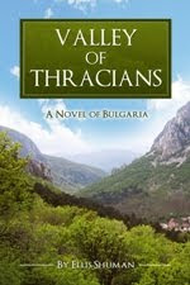 Valley of Thracians I was the first in our household to purchase a tablet, not for its Internet connectivity or for the ability to play games and watch videos on a handheld screen, but purely for the joy of reading digital books. While I appreciate the look and feel of flipping through the physical pages of a paperback, I also find pleasure in selecting a title to read, clicking a button, and having that book delivered seamlessly and instantly to my tablet.
Valley of Thracians I was the first in our household to purchase a tablet, not for its Internet connectivity or for the ability to play games and watch videos on a handheld screen, but purely for the joy of reading digital books. While I appreciate the look and feel of flipping through the physical pages of a paperback, I also find pleasure in selecting a title to read, clicking a button, and having that book delivered seamlessly and instantly to my tablet.
As a book reviewer, I frequently bookmark passages that I will consider quoting or paraphrasing in my reviews. This function is not available when I'm reading an advance reader copy (ARC) of a new book received in PDF format. Just the other day, my wife asked me how I keep track of passages to include in my reviews when reading a hard copy of a book. I realized that reviews of those books rely on my often faulty memory, rather than my leaving paper notes between the pages.
Some of the books I've recently reviewed have been quite good and I gladly recommended them to my wife. This was a bit difficult when we were a one-tablet family and I was the only one reading in the dark. My wife purchased her own tablet and some of the ebooks I received made their virtual way into her hands as well. My wife hasn't totally warmed to reading digital copies of books.
"What percentage are you up to?" I sometimes ask her, comparing how far each of us are in our respective reads at the end of the night. My wife doesn't see any benefit in a note informing her that she is three minutes away from the end of the chapter. She would much prefer to skim ahead through physical pages to determine when she plans to put down her book for the night. Time to go to sleep
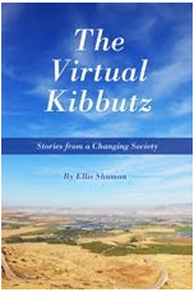 The Virtual Kibbutz There are other things you just have to get used to when reading via tablet, whether it's the size of the font, the way you hold the device, and how to swish your finger to turn the pages. It's not the same experience as reading a paperback, that's for sure.
The Virtual Kibbutz There are other things you just have to get used to when reading via tablet, whether it's the size of the font, the way you hold the device, and how to swish your finger to turn the pages. It's not the same experience as reading a paperback, that's for sure.
But, there is one thing that my wife and I both experience at the end of the night, and it doesn't matter if we're reading a physical book, or a digital one on our tablet. When our eyes become tired, we end up reading the same sentence over and over, not comprehending the text or remembering what we've just read. It's time to shut down the tablet for the night, extinguishing the small light of its screen.
At that point, the words "Lights out!" signal, just like they did in childhood, that it's time to stop reading and go to sleep.
More about Ellis Shuman
Ellis Shuman was born in the United States but moved to Israel as a teenager. He served in the Israeli army, was a founding member of a kibbutz, and now lives outside Jerusalem. For two years, 2009-2010, Ellis and his wife lived in Sofia, Bulgaria. Ellis writes frequently about Bulgaria, Israel, books, travel, and other interesting things on his blog. He is currently editing his new novel, which will be set in both Bulgaria and Israel.
And about Ellis's books...
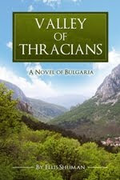 Click the image to buy! Valley of Thracians
Click the image to buy! Valley of Thracians
A Peace Corps volunteer has gone missing in Bulgaria and everyone assumes he is dead, everyone except his grandfather, who refuses to give up hope. Retired literature professor Simon Matthews launches a desperate search only to be lured into a bizarre quest to retrieve a stolen Thracian artifact—a unique object of immense value others will stop at nothing to recover.
Matthews travels through a Balkan landscape dotted with ancient tombs and fortresses, unaware that his grandson has been confined to an isolated mountain cabin, slowly recovering from a severe head injury. Nothing can be taken at face value, as the woman assisting Matthews in his quest and the nurse caring for his injured grandson may have ulterior motives in helping the two reunite. Even when Matthews succeeds in joining up with his grandson, departure from Bulgaria is only possible if the missing relic can be found.
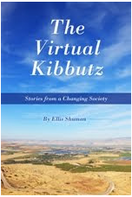 Click the image to buy! The Virtual Kibbutz
Click the image to buy! The Virtual Kibbutz
In this debut collection of stories, the author introduces you to kibbutz residents challenged with adapting to new realities. Along the way you'll see how kibbutzniks face up to the violence of the Intifada, cope with the Internet, and struggle to have more control over their lives.
Connect with Ellis Shuman:
Connect via Facebook, Twitter, Google Plus and Ellis's blog.
Subscribe to my blog and newsletter!
 I'd love to stay in contact with you! Why not sign up for my newsletter? It's an occasional communication to keep you informed about my new novel releases. I respect your privacy and will never sell your details to any third parties. To sign up, enter your details in the form at the top of the sidebar.
I'd love to stay in contact with you! Why not sign up for my newsletter? It's an occasional communication to keep you informed about my new novel releases. I respect your privacy and will never sell your details to any third parties. To sign up, enter your details in the form at the top of the sidebar.
And if you've enjoyed this blog post, how about subscribing via RSS feed or email? Either click the links in my blog sidebar or sign up via Networked Blogs, also in the sidebar. It'll be great to have you on board!
 The Nook Simple Touch I'm delighted to welcome my friend Ellis Shuman to my blog today. Ellis is the author of the gripping suspense novel 'Valley of Thracians' as well as a collection of short stories entitled 'The Virtual Kibbutz'. He also writes a popular blog, where he posts book reviews, articles about Israel, Bulgaria, and anything else he fancies. You can find it here.
The Nook Simple Touch I'm delighted to welcome my friend Ellis Shuman to my blog today. Ellis is the author of the gripping suspense novel 'Valley of Thracians' as well as a collection of short stories entitled 'The Virtual Kibbutz'. He also writes a popular blog, where he posts book reviews, articles about Israel, Bulgaria, and anything else he fancies. You can find it here.Reading one of Ellis's posts he published last year got me thinking. Which is the better medium for e-books, a dedicated e-reader or a tablet? Me, I love my Nook SImple Touch. Besides the Glowlight facility, meaning I can read in the dark without disturbing anyone, I like the fact that I can't access the Internet. Sure, the Nook is wi-fi enabled, allowing me to browse Barnes and Noble's website, but that's irrelevant to me. I buy all my books, digital and physical, from Amazon. For me, the fact I can't access Facebook, Twitter, Goodreads or any other of my favourite websites, is great. I can lose myself for hours in social media! As for why I chose a Nook over a Kindle, the only reason was one of price.
Ellis prefers to read via a tablet
 Android tablet Ellis has a different take on the subject. 'I don't own a Kindle,' he says. 'I am a late adapter, if I adapt to a new technology at all. I have recently considered purchasing a Kindle, but feared that I would be falling behind the times with a single purpose device. In the end, I've elected to buy a tablet, giving me a handheld unit that will enable me to read digital books comfortably, as well as interact with the Internet when I see fit to do so.'
Android tablet Ellis has a different take on the subject. 'I don't own a Kindle,' he says. 'I am a late adapter, if I adapt to a new technology at all. I have recently considered purchasing a Kindle, but feared that I would be falling behind the times with a single purpose device. In the end, I've elected to buy a tablet, giving me a handheld unit that will enable me to read digital books comfortably, as well as interact with the Internet when I see fit to do so.'I mentioned above how my Nook allows me to read in the dark. Ellis, of course, can do that as well with his tablet. The rest of this post is given over to him; he's written an article about why he enjoys reading digital books in bed at night. Seems his wife prefers the more traditional paperback, though! Over to you, Ellis.
Reading in the dark - 'Lights Out!'
 Israeli author Ellis Shuman When I was a young boy, this parental request meant an end to my nightly reading adventures, whether they be solving mysteries with the Hardy Boys or traveling 20,000 leagues under the sea with Jules Verne. In those days, I was obedient to a fault. The lights in my bedroom invariably went out at chapter's end. I never read books by flashlight because I could barely breathe under the covers.
Israeli author Ellis Shuman When I was a young boy, this parental request meant an end to my nightly reading adventures, whether they be solving mysteries with the Hardy Boys or traveling 20,000 leagues under the sea with Jules Verne. In those days, I was obedient to a fault. The lights in my bedroom invariably went out at chapter's end. I never read books by flashlight because I could barely breathe under the covers.Four decades later and my reading preferences and habits have changed. Now, the words "Lights out" declared in my conjugal bedroom signal a start to the night's literary activities. My wife and I fire up our tablets, turn off the lights, and start reading in the dark. While my wife reads a family drama set against the Congo's fight for independence from Belgium, I read fiction as well as non-fiction, having selected recently published titles that will not only give me pleasure but which I will also review for my blog.
Books delivered seamlessly and instantly
 Valley of Thracians I was the first in our household to purchase a tablet, not for its Internet connectivity or for the ability to play games and watch videos on a handheld screen, but purely for the joy of reading digital books. While I appreciate the look and feel of flipping through the physical pages of a paperback, I also find pleasure in selecting a title to read, clicking a button, and having that book delivered seamlessly and instantly to my tablet.
Valley of Thracians I was the first in our household to purchase a tablet, not for its Internet connectivity or for the ability to play games and watch videos on a handheld screen, but purely for the joy of reading digital books. While I appreciate the look and feel of flipping through the physical pages of a paperback, I also find pleasure in selecting a title to read, clicking a button, and having that book delivered seamlessly and instantly to my tablet.As a book reviewer, I frequently bookmark passages that I will consider quoting or paraphrasing in my reviews. This function is not available when I'm reading an advance reader copy (ARC) of a new book received in PDF format. Just the other day, my wife asked me how I keep track of passages to include in my reviews when reading a hard copy of a book. I realized that reviews of those books rely on my often faulty memory, rather than my leaving paper notes between the pages.
Some of the books I've recently reviewed have been quite good and I gladly recommended them to my wife. This was a bit difficult when we were a one-tablet family and I was the only one reading in the dark. My wife purchased her own tablet and some of the ebooks I received made their virtual way into her hands as well. My wife hasn't totally warmed to reading digital copies of books.
"What percentage are you up to?" I sometimes ask her, comparing how far each of us are in our respective reads at the end of the night. My wife doesn't see any benefit in a note informing her that she is three minutes away from the end of the chapter. She would much prefer to skim ahead through physical pages to determine when she plans to put down her book for the night. Time to go to sleep
 The Virtual Kibbutz There are other things you just have to get used to when reading via tablet, whether it's the size of the font, the way you hold the device, and how to swish your finger to turn the pages. It's not the same experience as reading a paperback, that's for sure.
The Virtual Kibbutz There are other things you just have to get used to when reading via tablet, whether it's the size of the font, the way you hold the device, and how to swish your finger to turn the pages. It's not the same experience as reading a paperback, that's for sure.But, there is one thing that my wife and I both experience at the end of the night, and it doesn't matter if we're reading a physical book, or a digital one on our tablet. When our eyes become tired, we end up reading the same sentence over and over, not comprehending the text or remembering what we've just read. It's time to shut down the tablet for the night, extinguishing the small light of its screen.
At that point, the words "Lights out!" signal, just like they did in childhood, that it's time to stop reading and go to sleep.
More about Ellis Shuman
Ellis Shuman was born in the United States but moved to Israel as a teenager. He served in the Israeli army, was a founding member of a kibbutz, and now lives outside Jerusalem. For two years, 2009-2010, Ellis and his wife lived in Sofia, Bulgaria. Ellis writes frequently about Bulgaria, Israel, books, travel, and other interesting things on his blog. He is currently editing his new novel, which will be set in both Bulgaria and Israel.
And about Ellis's books...
 Click the image to buy! Valley of Thracians
Click the image to buy! Valley of ThraciansA Peace Corps volunteer has gone missing in Bulgaria and everyone assumes he is dead, everyone except his grandfather, who refuses to give up hope. Retired literature professor Simon Matthews launches a desperate search only to be lured into a bizarre quest to retrieve a stolen Thracian artifact—a unique object of immense value others will stop at nothing to recover.
Matthews travels through a Balkan landscape dotted with ancient tombs and fortresses, unaware that his grandson has been confined to an isolated mountain cabin, slowly recovering from a severe head injury. Nothing can be taken at face value, as the woman assisting Matthews in his quest and the nurse caring for his injured grandson may have ulterior motives in helping the two reunite. Even when Matthews succeeds in joining up with his grandson, departure from Bulgaria is only possible if the missing relic can be found.
 Click the image to buy! The Virtual Kibbutz
Click the image to buy! The Virtual KibbutzIn this debut collection of stories, the author introduces you to kibbutz residents challenged with adapting to new realities. Along the way you'll see how kibbutzniks face up to the violence of the Intifada, cope with the Internet, and struggle to have more control over their lives.
Connect with Ellis Shuman:
Connect via Facebook, Twitter, Google Plus and Ellis's blog.
Subscribe to my blog and newsletter!
 I'd love to stay in contact with you! Why not sign up for my newsletter? It's an occasional communication to keep you informed about my new novel releases. I respect your privacy and will never sell your details to any third parties. To sign up, enter your details in the form at the top of the sidebar.
I'd love to stay in contact with you! Why not sign up for my newsletter? It's an occasional communication to keep you informed about my new novel releases. I respect your privacy and will never sell your details to any third parties. To sign up, enter your details in the form at the top of the sidebar.And if you've enjoyed this blog post, how about subscribing via RSS feed or email? Either click the links in my blog sidebar or sign up via Networked Blogs, also in the sidebar. It'll be great to have you on board!
Published on October 09, 2014 06:43
September 25, 2014
Author Interview: Candi Silk
The exciting world of erotic fiction
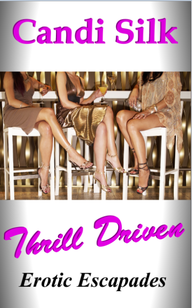 Click the image to find out more! Today I'm delighted to welcome erotica writer Candi Silk to my blog. I've often considered writing in that genre myself, so it's a special pleasure to talk with an author who's done just that. Together we'll explore the exciting, and sometimes controversial, world of erotic fiction.
Click the image to find out more! Today I'm delighted to welcome erotica writer Candi Silk to my blog. I've often considered writing in that genre myself, so it's a special pleasure to talk with an author who's done just that. Together we'll explore the exciting, and sometimes controversial, world of erotic fiction.
Candi's latest novel, Thrill Driven, has now been released! Click the image to find out more or to buy it from Amazon.
Let's get going with the questions for Candi!
T ell us about the first erotic story you ever wrote.
That would be my first erotic romance novel, Find Me. But like many authors, I had drafted a few random paragraphs through the years, but nothing serious. I started writing Find Me in early 2013, and published it March 2014. It involves a self-made woman, Destiny James, who fought tooth and nail to make something of herself, and does so by her late 20s. She’s feeling pretty successful, until she receives a surprise phone call from an unknown attorney, and then everything she thought she knew about herself is challenged. She’s a feisty Newark, New Jersey woman, and resists meeting the small-town, laid-back attorney who not only has rattled her real identity, but also unleashes unsettling fleshly desires. As her womanly desires burst into flame, so do her insecurities. And then she’s caught between the crossfires of the “real” Clint Star. A good amount of conflict and suspense must subside before the characters find their pleasure. There is plenty of hot sex, but it is surrounded by full-sized backstory and drama. The process of our evolving sensuality
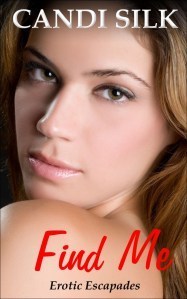 Click the image to find out more! Why do you think sex sells?
Click the image to find out more! Why do you think sex sells?
Sex sells because it is tightly integrated into the human being from birth, and our sexual entity continues to evolve throughout life. However, that evolving process is the interesting part. There are two sexes, male and female. Not really breaking news, but that’s just the physical anatomy. It’s the evolving sensuality and the sexuality of the human being that grabs our attention. Sensuality and sexuality involve the intake, or stimuli, and the response, or expressions in return. The incoming and the outgoing of that exchange, or transmission, is gathered through the physical, psychological, mental, and emotional complex network within an individual. Through the years our sexual entity is educated, encouraged, hindered, repressed, nurtured, violated, crimped, cramped, shaped, and/or influenced by individuals and our surrounding environment, which can extend and reach in many directions.
Sex is personal and intrigues us
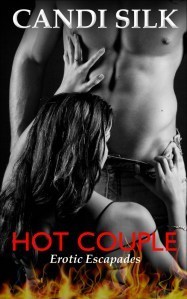 Click the image to find out more! Sex and almost anything connected with it intrigues us as human beings. Scandalous gossip, out-of-bounds sexual behaviour, surprise marital infidelities, seem to always make it to the top of the news. How can that be? Our sexual identity/profile can’t resist; we’re curious, even though we might disapprove of what we learn. So sex can sell almost anything, and most certainly books, especially within the romance, erotic romance, and erotica genres that speak directly to human sexuality/sensuality. I cannot think of another genre that connects with the human physiology like the overreaching umbrella of romance and erotica genres do. The human being does not have a physiological profile, identity, or anatomy that connects to mystery, crime thrillers, sci-fi, vampires, etc. Sure, people love reading those books also, but the connection is different. Sex is personal. I might get excited reading a thrilling sci-fi, or vampire book, but not the same way I would reading an extraordinary erotica story.
Click the image to find out more! Sex and almost anything connected with it intrigues us as human beings. Scandalous gossip, out-of-bounds sexual behaviour, surprise marital infidelities, seem to always make it to the top of the news. How can that be? Our sexual identity/profile can’t resist; we’re curious, even though we might disapprove of what we learn. So sex can sell almost anything, and most certainly books, especially within the romance, erotic romance, and erotica genres that speak directly to human sexuality/sensuality. I cannot think of another genre that connects with the human physiology like the overreaching umbrella of romance and erotica genres do. The human being does not have a physiological profile, identity, or anatomy that connects to mystery, crime thrillers, sci-fi, vampires, etc. Sure, people love reading those books also, but the connection is different. Sex is personal. I might get excited reading a thrilling sci-fi, or vampire book, but not the same way I would reading an extraordinary erotica story.
Do you think anyone can write erotic fiction?
I’d like to think any writer can learn to write erotic fiction, but I’m so new at writing I’m not sure. I’m still learning, and will probably always think of myself as becoming a writer, word by word, day by day. Even if a person learns to manage words, sentences, and paragraphs, I believe the best writer of erotic fiction or erotica is one who has feeling for the genre, and knows how to convey that through his/her characters. Without the conveyance of deep feeling any writing is reduced to ‘See Jane run. See Spot run. See the ball.” Instinctive desires and appetites
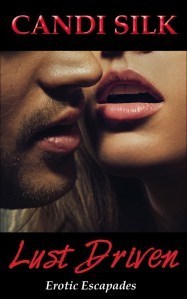 Click the image to find out more!
What’s the difference between erotic fiction and porn? Do you think readers get it mixed up? What about romance and erotica?
Click the image to find out more!
What’s the difference between erotic fiction and porn? Do you think readers get it mixed up? What about romance and erotica?
Either everyone gets it mixed up, or everyone gets it right, and that includes writers, readers, and even non-readers. There is no concrete agreement on making the distinctions between the genres of eroticism, or how to classify them. Even the legal systems have struggled when sorting through cases involving books or other written material. For writers and readers it comes down to a subjective process. But I have a parallel that might help us understand how we view eroticism.
The simple word appetite means any of the instinctive desires necessary to keep up organic life. Usually we attach appetite specifically to the desire to eat food. On the other hand the word libido means sexual drive. And within that context is the instinctual desire for sexual pleasure or self-preservation. I think of the desire for food and/or sex as appetites. And we know that appetites are constantly changing. At times we are content to eat meals methodically, mechanically, habitually, and at other times we’re adventurous, reckless, willing to take risks, and follow that daring impulse to indulge in a fully-loaded banana split, or a sinfully heaped chocolate sundae ten minutes before dinner is scheduled to be placed on the family dining table. Sexual desires are similar in that we follow them at times in predictable patterns, and at other times taking greater risks fuelled by primal needs and wants. However, layered on top of that are an individual’s aesthetic, moral, and religious preferences and beliefs. I believe those three ingredients or influencers enter into a reader’s final decision to purchase a book. But wait; there’s one more variable that can skew the decision and that’s curiosity. The desire to wonder, to look, to inquire, to imagine, to investigate, to fantasize, and, yes, to try and know for myself.
Perceptions and preferences
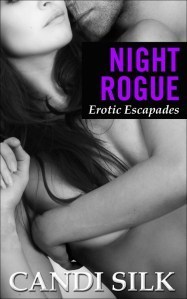 Click the image to find out more! But even with the above simplification the discussion and debate rages on regarding the distinctions, while we look for the dividing lines between erotica, erotic fiction, romance, and porn(ography). I believe it hinges on two “p” words, and I don’t mean that “p” word, but perceptions and preferences. A quick look at the dictionary meaning of the four genre terms or categories yields some similarities. All have the intent of eliciting sensual and/or sexual feelings, especially in writings. It’s the degree and/or intensity of those feelings, and the display or description (writing) that seems to be where disagreement stems. And who is to say when one book has crossed over the line into a different erotic category, or the exact and acceptable combination of plot, words, feelings, and behaviours that should be included in a specific genre?
Click the image to find out more! But even with the above simplification the discussion and debate rages on regarding the distinctions, while we look for the dividing lines between erotica, erotic fiction, romance, and porn(ography). I believe it hinges on two “p” words, and I don’t mean that “p” word, but perceptions and preferences. A quick look at the dictionary meaning of the four genre terms or categories yields some similarities. All have the intent of eliciting sensual and/or sexual feelings, especially in writings. It’s the degree and/or intensity of those feelings, and the display or description (writing) that seems to be where disagreement stems. And who is to say when one book has crossed over the line into a different erotic category, or the exact and acceptable combination of plot, words, feelings, and behaviours that should be included in a specific genre?
One highly successful female author of erotica used the “F” word over 400 times. That book spent a few weeks on the NYTimes and USA Today bestseller lists. The readers’ reviews are almost all five and four stars. The author’s social media following and readers are primarily women. Even though the word porn, in its earliest usage, referred to writing about prostitutes, today porn(ography) generally refers to writing that mainly describes mechanical human sexual activity. The emphasis is on the physical. Often included in that is the mistreatment or degradation of one or more of the sexual participants for the pleasure of other participants. But that’s not always the case. One label of difference expressed was ‘if it’s pain it’s porn; if it’s pleasure it’s eroticism.’ Romance is generally accepted to focus on the developing emotional feelings of the characters, with limited mention or attention to the physical aspects of the relationship. And if the physical aspect is present it’s generally subtle, off camera, or off page, as I refer to it.
Stepping up the physical heat
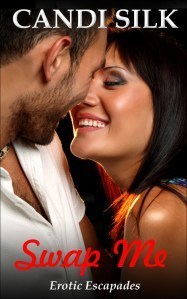 Click the image to find out more! Erotic romance steps up the physical heat, although the story usually is heavily focused on the emotional aspects of the characters’ relationship. But I have found varying degrees of emphasis regarding the ratio of emotional content to physical content even within that category. I can say the same thing about erotica. However, usually erotica has a much heavier emphasis on the sexual interactions of the characters than a lengthy emotional backstory. To my knowledge there is no single measuring stick or standard by which books can be definitively categorized. Go to any bookstore, any public library, any of the online booksellers, and you’ll find variations, because each business or institution decides what their own system of categorizing books is going to be. And of course authors have the first choice in the process when they declare the genre of the book they’ve written, and how they wish to position the book in the market place.
Click the image to find out more! Erotic romance steps up the physical heat, although the story usually is heavily focused on the emotional aspects of the characters’ relationship. But I have found varying degrees of emphasis regarding the ratio of emotional content to physical content even within that category. I can say the same thing about erotica. However, usually erotica has a much heavier emphasis on the sexual interactions of the characters than a lengthy emotional backstory. To my knowledge there is no single measuring stick or standard by which books can be definitively categorized. Go to any bookstore, any public library, any of the online booksellers, and you’ll find variations, because each business or institution decides what their own system of categorizing books is going to be. And of course authors have the first choice in the process when they declare the genre of the book they’ve written, and how they wish to position the book in the market place.
However, that can also stir confusion and controversy. Suppose a romance author declares her/his book to be Christian romance. The book is published and categorized as Christian romance. Then the author discovers from a number of negative reviews, “does not belong in Christian books, too many ‘bad’ words,” or something similar to that. But maybe the author feels the overall content is mainline “respectable, good behaviour” except for half dozen slang expressions. Okay, maybe a couple of the characters kissed too deeply. For some readers that could be enough for them to raise an objection. Enough objections and the author is faced with the possibility of repositioning the book in a slightly different genre or subgenre, or leaving it and taking the “heat” from the religious or more sensitive readers. Candi's 'Wicked Words' list
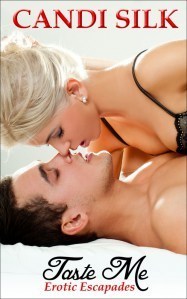 Click the image to find out more! I think it’s safe to say most readers have perceptions and preferences regarding books they wish to read or are comfortable with. They have a view of what a romance book should be for them, and they either have or are evolving preferences regarding their reading. Perceptions and preferences tend to work in tandem when making choices. I believe the clearer authors are in declaring their work, the easier for readers to make selections in line with their preferences in reading. My books are clearly and solidly intended to be, and are written to be erotica. I have alerts and/or “warnings” in the front of each book, and on all my social media sites so readers will know without a doubt that I write erotica. I include enough plot to support the consenting adult, explicitly intimate, sexual relationships of the characters. But there is emotional passion with heavy emphasis on mutual pleasure and positive feelings among the characters. Readers of my erotica know that my characters liberally use selected “naughty” words to freely and playfully express their sexuality as they interact. To my knowledge, I’m the only erotica writer to include a glossary/dictionary of those “naughty” words in each of my books. In a fun tongue-in-cheek spirit I call the list Candi Silk’s Wicked Words. It’s my way of declaring how my characters use those words for pleasure during their passionate escapades. Most of those words are considered “no-no” words in polite company, but I decided to let my characters use those words to express the intensity of their passion and pleasure. Think of it; all major entertainments have a special terminology that goes along with it. Why not erotic writings as well? An explosive debate over sexuality
Click the image to find out more! I think it’s safe to say most readers have perceptions and preferences regarding books they wish to read or are comfortable with. They have a view of what a romance book should be for them, and they either have or are evolving preferences regarding their reading. Perceptions and preferences tend to work in tandem when making choices. I believe the clearer authors are in declaring their work, the easier for readers to make selections in line with their preferences in reading. My books are clearly and solidly intended to be, and are written to be erotica. I have alerts and/or “warnings” in the front of each book, and on all my social media sites so readers will know without a doubt that I write erotica. I include enough plot to support the consenting adult, explicitly intimate, sexual relationships of the characters. But there is emotional passion with heavy emphasis on mutual pleasure and positive feelings among the characters. Readers of my erotica know that my characters liberally use selected “naughty” words to freely and playfully express their sexuality as they interact. To my knowledge, I’m the only erotica writer to include a glossary/dictionary of those “naughty” words in each of my books. In a fun tongue-in-cheek spirit I call the list Candi Silk’s Wicked Words. It’s my way of declaring how my characters use those words for pleasure during their passionate escapades. Most of those words are considered “no-no” words in polite company, but I decided to let my characters use those words to express the intensity of their passion and pleasure. Think of it; all major entertainments have a special terminology that goes along with it. Why not erotic writings as well? An explosive debate over sexuality
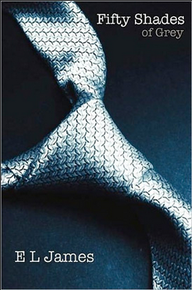 What are your thoughts on the impact and importance of Fifty Shades of Grey?
What are your thoughts on the impact and importance of Fifty Shades of Grey?
First let me congratulate Ms. E. L. James on the success of FSOG. It has been a highly successful book in the market place, and the success has been driven primarily by women readers. Book sales of FSOG surpassed 100 million in early 2014. The income for Ms. James has skyrocketed above other popular authors James Patterson, Suzanne Collins, and J. K. Rowling. But those statistics are not as phenomenal as the debate stirred by the content of James’s bestseller. The debate has been explosive and focused upon the “real” sexual desires or feelings of women in general. Forever and an age women have been labelled as “uninterested” in sex as compared to men. The discourse stimulated by FSOG has dispelled that. What has been revealed about women is extremely interesting for the writing community to note. Discussion, debate, speculation, surveys, and research reveal that women are as interested in sex and their own sexuality as men. Another revelation is women’s fantasies are equal to, and many believe more creative than men’s. One of the key topics of discussion spawned by FSOG and featured broadly across the media is BDSM. Generally BDSM is a term from the late 60’s, early 70’s and carries the following: bondage and discipline, domination and submission, sadism and masochism. And no, I’m not about to debate the intent or merits of BDSM. But FSOG apparently brought BDSM out of the closet into the light of discussion, and there has been plenty of interest, particularly as it relates to women. So much interest that other writers have published works picking up on the theme(s) of BDSM/billionaire-bad-boy.
A woman's perspective on sexuality
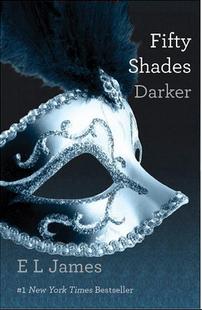 Additional observations can be found in the wake of FSOG: (1) Women have jumped in the middle of those discussions, often sharing a woman’s perspective on sexuality including sexual fantasies. (2) The initial and continuing interest in FSOG stems primarily from women. (3) That raised the question primarily from men, What the heck do women really want? (4) That elicited the response from women, Glad you finally asked. (5) News articles indicate the initial tide of interest in FSOG came from women readers located in New York City, and the buzz spread from there. (6) Huffington Post conducted an online survey asking if FSOG was harmful for women. Turns out that “the house is divided” with only a 6 percent lead indicating it isn’t harmful for women to read. (7) Among the more than 100 million purchasers of FSOG, as of a few days ago on Amazon, only 26,793 reviews were posted. 43% rated the book average and below with 3, 2, or 1 stars. 56.9% rated the book with 4 or 5 stars. The overall rating is 3.4 stars, a little above average. Remember, reviews are never equal to sales; consumers may use a product, but never express a review one way or another. Sex without the guilt
Additional observations can be found in the wake of FSOG: (1) Women have jumped in the middle of those discussions, often sharing a woman’s perspective on sexuality including sexual fantasies. (2) The initial and continuing interest in FSOG stems primarily from women. (3) That raised the question primarily from men, What the heck do women really want? (4) That elicited the response from women, Glad you finally asked. (5) News articles indicate the initial tide of interest in FSOG came from women readers located in New York City, and the buzz spread from there. (6) Huffington Post conducted an online survey asking if FSOG was harmful for women. Turns out that “the house is divided” with only a 6 percent lead indicating it isn’t harmful for women to read. (7) Among the more than 100 million purchasers of FSOG, as of a few days ago on Amazon, only 26,793 reviews were posted. 43% rated the book average and below with 3, 2, or 1 stars. 56.9% rated the book with 4 or 5 stars. The overall rating is 3.4 stars, a little above average. Remember, reviews are never equal to sales; consumers may use a product, but never express a review one way or another. Sex without the guilt
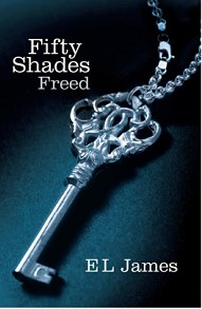 It is worth noting among the 11,538 posts that were average and below, the eye-catching frequency of reviews indicating the reader had only bought the book to “see what all the talk was about.” However, that is meaningless to a cash register; a book was sold. But it does indicate the “c” word, curiosity, at play in why or how we make a purchase or “try something.” With the above miscellaneous observations, where does this leave women, and their sexuality in light of BDSM, and what women want? I haven’t found an authoritative conclusion, but the following comment from an ultra-conservative, religious, female friend of mine gave me pause: “You want to know what women think and what they want regarding sex? I’ll tell you. For twenty years a woman in America, and probably other countries, is taught a series of ‘don’ts’. Don’t look down there, don’t touch down there, don’t think about down there, and don’t think about boys or let them do things to you. Don’t, don’t, don’t! And then on your wedding night everything is supposed to magically reverse itself. Sorry, but that doesn’t work for a woman. Is it any wonder then that women fantasize being taken by a stranger or imaginary powerful, rich hero who makes her enjoy what she’d like to enjoy but doesn’t know how to suddenly enjoy something, that has been off limits for over twenty years, without feeling guilty about it? I’m not surprised that a woman would fantasize that happening to her, and she probably doesn’t care how the man makes that happen for her, FSOG or not!” Not surprising, this candid response from one person mirrors what many in the world of psychology have reasoned that women feel on a deeper level: “Someone put me in this state of being, so someone else get me out of it, and make me feel good about it, without the guilt.”
It is worth noting among the 11,538 posts that were average and below, the eye-catching frequency of reviews indicating the reader had only bought the book to “see what all the talk was about.” However, that is meaningless to a cash register; a book was sold. But it does indicate the “c” word, curiosity, at play in why or how we make a purchase or “try something.” With the above miscellaneous observations, where does this leave women, and their sexuality in light of BDSM, and what women want? I haven’t found an authoritative conclusion, but the following comment from an ultra-conservative, religious, female friend of mine gave me pause: “You want to know what women think and what they want regarding sex? I’ll tell you. For twenty years a woman in America, and probably other countries, is taught a series of ‘don’ts’. Don’t look down there, don’t touch down there, don’t think about down there, and don’t think about boys or let them do things to you. Don’t, don’t, don’t! And then on your wedding night everything is supposed to magically reverse itself. Sorry, but that doesn’t work for a woman. Is it any wonder then that women fantasize being taken by a stranger or imaginary powerful, rich hero who makes her enjoy what she’d like to enjoy but doesn’t know how to suddenly enjoy something, that has been off limits for over twenty years, without feeling guilty about it? I’m not surprised that a woman would fantasize that happening to her, and she probably doesn’t care how the man makes that happen for her, FSOG or not!” Not surprising, this candid response from one person mirrors what many in the world of psychology have reasoned that women feel on a deeper level: “Someone put me in this state of being, so someone else get me out of it, and make me feel good about it, without the guilt.”
Does art imitate life, or vice versa?
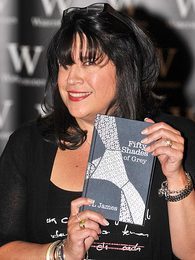 Author E. L. James Putting FSOG aside, if that is the feeling of women, then as a writer of erotica I would say to men or partners of women: “You can help put the dilemma to rest, by rediscovering the special woman in your life. Truly get to know her. If she’s walking around with all these pent-up desires, then you need to learn how to help her discover the goodness within herself. Listen to her completely, nurture, and coax excitement from her. If you don’t you’ll be the loser, and never know the wonderful excitement of the woman beside you.”
Author E. L. James Putting FSOG aside, if that is the feeling of women, then as a writer of erotica I would say to men or partners of women: “You can help put the dilemma to rest, by rediscovering the special woman in your life. Truly get to know her. If she’s walking around with all these pent-up desires, then you need to learn how to help her discover the goodness within herself. Listen to her completely, nurture, and coax excitement from her. If you don’t you’ll be the loser, and never know the wonderful excitement of the woman beside you.”
But I have one final thought on the impact and importance of FSOG. If the sexual rage is BDSM in the bedroom, then there is a glaring inconsistency that won’t go away and it is this: Historically women have fought in every arena and venue for equality in every aspect of their lives, including political, economic, social, entertainment, their education and work, and in some countries or oppressive societies, have fought for their very survival against all kinds of bondage, submission, and suppression usually traceable back to men or a patriarchal system. But now all of a sudden there’s the raging desire to be bound in the bedroom? It would be interesting to know if FSOG has flown off the bookshelves, or is a hallowed bestseller among women in repressive societies or countries. Often times the fun and games people play spills over into other areas of life or vice versa. The notion also exists that access and excess open many doors and unknowns as there is idle time to satisfy one’s curiosity “to try things for myself.” It gets back to the cyclic question, Does art imitate life, or does life imitate art? None of my comments are intended to detract from E. L. James’s continuing success, but to add to the intriguing discussions that FSOG has stimulated. Bravo to her! Discussion and debate are good things! Sex is the plot...
 Image from Candi's website Tell us about your writing process. How do you come up with the characters? What about plot?
Image from Candi's website Tell us about your writing process. How do you come up with the characters? What about plot?
Some of my ideas come from news events, or events I know of from a closer source. However, I do not write about myself or anyone that I’ve known in the past or know currently. All of my characters are strictly fictional, imaginary. However, it is not unusual for me to have seen an advertisement or facial image somewhere that fits with the image that is forming in my thoughts regarding characters. I observe general behaviours (body language) of people, their conversations, and clothing to give me a feel for possible descriptions of characters. I was fascinated one day by a woman working in a public office in a nearby town. Her interactions with people were filled with tart confidence and efficiency. Her personality became the basis for a secondary character in one of my books. But I never spoke with her. I was with a friend at the time and just happened to observe the interesting woman. I also think of the character in relation to how they fit for a particular storyline or plot. I suppose that would be similar to casting characters for a movie. And we know how interesting that becomes with the public when a movie is based on a popular novel. Sometimes the actors fit the characters in the book, and sometimes not. And the public will let the world know about the discrepancy.
Probably the most frequent question asked of erotica is Where’s the plot? Some conclude there’s no plot, therefore there’s no book, nothing. So where’s the plot in erotica? As with everything else in the writing world there are varied opinions including numbered lists claiming a concrete number of plots existing in the world today, anywhere from 1 to 20, the last time I checked. If you boil all of the lists down you end up with one basic plot: Someone (protagonist) wants something s/he doesn’t have, and tries to get it. Often there’s a change or an event that triggers the story. My erotica titles range from 51 to 254 pages in length. Sex is the plot. Since sex is what got us all here, I consider it a rather serious plot. Someone wants sex, or they think they do, and they try to get it. There is an event or a change that precipitates the story moving forward. And who’s to say only one event ignites the story?
Providing anticipation within the reader
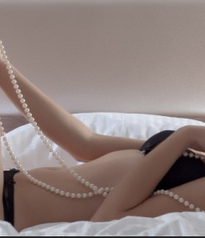 Image from Candi's website Imagine an ordinary housewife, with an inattentive husband, she turning 40 next week, a new neighbour, 28 year-old single hunk, moves in next door, and he continues smiling and making conversation with her at the mailbox every afternoon. Any one of these changes or events could contribute to her growing discontent or unhappiness. So who decides what they want first? The unhappy wife, who remains reluctant, or the horny stud who is aroused by the older woman, wife of another man? Bound to be some fireworks in there. So does the writer create a long storyline/plot that stretches over the next two years with “cat and mouse” flirting, and lots of introspection of characters, internal dialogue, innocent neighbourly chats and cookouts with the three of them, and maybe end up with an erotic romance, or does the writer fuel the plot with impulsive urgency so the characters can “get what I want now”? In this case I could see an extremely exciting 100 pages or so.
Image from Candi's website Imagine an ordinary housewife, with an inattentive husband, she turning 40 next week, a new neighbour, 28 year-old single hunk, moves in next door, and he continues smiling and making conversation with her at the mailbox every afternoon. Any one of these changes or events could contribute to her growing discontent or unhappiness. So who decides what they want first? The unhappy wife, who remains reluctant, or the horny stud who is aroused by the older woman, wife of another man? Bound to be some fireworks in there. So does the writer create a long storyline/plot that stretches over the next two years with “cat and mouse” flirting, and lots of introspection of characters, internal dialogue, innocent neighbourly chats and cookouts with the three of them, and maybe end up with an erotic romance, or does the writer fuel the plot with impulsive urgency so the characters can “get what I want now”? In this case I could see an extremely exciting 100 pages or so.
But it really isn’t about length; it’s about providing anticipation within the reader. The reader knows there’s bound to be sex, but the writer can make the journey exciting and interesting. It’s about writing erotica, not counting exact pages. But there is another important ingredient on the reader’s side of the equation. What is the reader “ready” for? If I’m in the mood or “ready for” a passionate, sensual erotica story, I might turn to a Kirsten McCurran title that has enough plot and emotion to carry the heated sex. However, if I’m “ready for” an extra 250 pages of summer porch swings, hand-holding strolls, and light kisses, I could easily settle down with a title from Nicholas Sparks. And if I need a psychological thriller, I’ll turn to my favourite, Maggie James! Very different reads, but I enjoy each one! (Thanks, Candi! - Maggie)
Sublety can be just as erotic
 Image from Candi's website
Who do you see as your typical reader?
Image from Candi's website
Who do you see as your typical reader?
A balanced, bold, smart, open-minded, male or female, probably within the age range of 25 and beyond. Age doesn’t necessarily limit a person’s interest in reading. I’m also thinking, probably a reader who has seen their share of life’s dramas, therefore their feelings have a bit of seasoning, even maturity. And I see a reader who enjoys reading from multi-genres. I’m imagining a reader who is curious, inquisitive, imaginative, and one that enjoys a bit of humour. I’m envisioning a reader who enjoys sharing and discussing books with family and friends. Knowing I have talented readers like that, motivates me to become a better writer for them!
What is the most erotic scene you’ve ever written, in your opinion?
Ah, that’s a tough question. I’d have to pick two. One scene comes from Find Me. Even though the female protagonist is a self-made woman from New Jersey, she’s had a couple of events that shake her confidence and uncover her insecurities. The man she meets is particularly sensitive to that, and takes his time nurturing her passions during their first sexual encounter. The quiet mountain setting adds to the intimacy. The other erotic scene is one from my recently published erotic escapade, Thrill Driven. The scene involves two women who are exploring and discovering they are bisexual. Both are divorced. Although their female-to-female passionate encounter is complete and pleasurable, it’s the loving “afterglow” they share that adds an even deeper layer. Their looks in the eyes and their whispers to each other speak to the reader of something beyond just the physical. I personally enjoyed writing the tenderness that’s there after the shattering effects of their passion. Everything in erotica doesn’t have to be blazing hot; subtlety can be just as erotic. Plenty of drama, ripe for harvesting
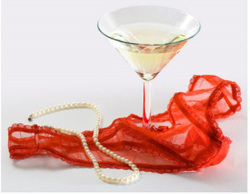 Image from Candi's website What are the most important components to writing good erotica?
Image from Candi's website What are the most important components to writing good erotica?
Of course likable characters, which sometimes translates as relatable to the reader. But especially in erotica context is important, even to certain specificity. Some readers are drawn to sex that involves a particular setting; big city, sea coast, upscale living, fast-lane living. Add to that sex with men in uniform, sex with professional women, older woman with younger man, threesomes, bisexual, or other scenarios. Some readers enjoy the college context, and it isn’t so much with just the cheerleader as the context, but the time period of fun, hormones, risk, and new experiences. Others love the workplace setting which can be an exciting gourmet of experiences for erotica writers. But through all of that anticipation must be felt by the reader. That means placing conflict, tension, challenges in the paths of characters. And characters making tough decisions that “cut across the grain” or create some kind of opposition internally or externally helps keep readers on the edge of anticipation. One particular context that draws my attention, and I plan a couple of projects, is the married woman in the middle-age of life, somewhere crossing into her forties. That area is ripe with drama, emotions are alert, changes and transitions are rampant, kids leaving home, job changes, bedroom boredom often casts a long shadow, and life’s goals are under fresh evaluation. There is plenty of drama, just waiting for writers to harvest for readers.
What feedback do you get from your readers about your erotica?
I’ve been fortunate to have positive response from readers’ reviews and also through other social media connections. Included have also been suggestions that are extremely helpful to me as a new writer of erotica. Two in particular: (1) make the erotic escapades longer to get to know the characters better. (2) Don’t make the endings become too “sweet.” Both suggestions were excellent. Although a writer knows her/his characters better than anyone, the reader can only know them on the written page. And a “mushy” ending can detract from the adult nature of the very passionate story the reader just finished. Those reader suggestions and others help me remember a book has a destiny; it’s called the rendezvous between the writer and the reader, and it far surpasses the contents of any book. It’s the mingling of two souls, two minds, writer and reader. That interaction of the two thoughts is more intimate than any erotica story. That’s a fact, not fiction!
Finally...
Maggie, thank you for the invitation to share thoughts on erotica with your inquisitive readership, and I’ll be happy to answer follow-up comments or questions. Thank you, Candi!
 I'd like to extend my thanks to Candi for her thoughtful and insightful replies to my questions. You can find out more about Candi via her website, www.candisilk.com, or through these links: Amazon.com, Amazon.co.uk, Facebook, Twitter, Google+ and Goodreads.
I'd like to extend my thanks to Candi for her thoughtful and insightful replies to my questions. You can find out more about Candi via her website, www.candisilk.com, or through these links: Amazon.com, Amazon.co.uk, Facebook, Twitter, Google+ and Goodreads.
Do you have any questions or comments? Candi would love to hear from you, and so would I. Leave a comment for us!
Subscribe to my newsletter and blog!
 I'd love to stay in contact with you! Why not sign up for my newsletter? It's an occasional communication to keep you informed about my new novel releases. I respect your privacy and will never sell your details to any third parties. To sign up, enter your details in the form at the top of the sidebar.
I'd love to stay in contact with you! Why not sign up for my newsletter? It's an occasional communication to keep you informed about my new novel releases. I respect your privacy and will never sell your details to any third parties. To sign up, enter your details in the form at the top of the sidebar.
And if you've enjoyed this blog post, how about subscribing via RSS feed or email? Either click the links in my blog sidebar or sign up via Networked Blogs, also in the sidebar. It'll be great to have you on board!
 Click the image to find out more! Today I'm delighted to welcome erotica writer Candi Silk to my blog. I've often considered writing in that genre myself, so it's a special pleasure to talk with an author who's done just that. Together we'll explore the exciting, and sometimes controversial, world of erotic fiction.
Click the image to find out more! Today I'm delighted to welcome erotica writer Candi Silk to my blog. I've often considered writing in that genre myself, so it's a special pleasure to talk with an author who's done just that. Together we'll explore the exciting, and sometimes controversial, world of erotic fiction.Candi's latest novel, Thrill Driven, has now been released! Click the image to find out more or to buy it from Amazon.
Let's get going with the questions for Candi!
T ell us about the first erotic story you ever wrote.
That would be my first erotic romance novel, Find Me. But like many authors, I had drafted a few random paragraphs through the years, but nothing serious. I started writing Find Me in early 2013, and published it March 2014. It involves a self-made woman, Destiny James, who fought tooth and nail to make something of herself, and does so by her late 20s. She’s feeling pretty successful, until she receives a surprise phone call from an unknown attorney, and then everything she thought she knew about herself is challenged. She’s a feisty Newark, New Jersey woman, and resists meeting the small-town, laid-back attorney who not only has rattled her real identity, but also unleashes unsettling fleshly desires. As her womanly desires burst into flame, so do her insecurities. And then she’s caught between the crossfires of the “real” Clint Star. A good amount of conflict and suspense must subside before the characters find their pleasure. There is plenty of hot sex, but it is surrounded by full-sized backstory and drama. The process of our evolving sensuality
 Click the image to find out more! Why do you think sex sells?
Click the image to find out more! Why do you think sex sells?Sex sells because it is tightly integrated into the human being from birth, and our sexual entity continues to evolve throughout life. However, that evolving process is the interesting part. There are two sexes, male and female. Not really breaking news, but that’s just the physical anatomy. It’s the evolving sensuality and the sexuality of the human being that grabs our attention. Sensuality and sexuality involve the intake, or stimuli, and the response, or expressions in return. The incoming and the outgoing of that exchange, or transmission, is gathered through the physical, psychological, mental, and emotional complex network within an individual. Through the years our sexual entity is educated, encouraged, hindered, repressed, nurtured, violated, crimped, cramped, shaped, and/or influenced by individuals and our surrounding environment, which can extend and reach in many directions.
Sex is personal and intrigues us
 Click the image to find out more! Sex and almost anything connected with it intrigues us as human beings. Scandalous gossip, out-of-bounds sexual behaviour, surprise marital infidelities, seem to always make it to the top of the news. How can that be? Our sexual identity/profile can’t resist; we’re curious, even though we might disapprove of what we learn. So sex can sell almost anything, and most certainly books, especially within the romance, erotic romance, and erotica genres that speak directly to human sexuality/sensuality. I cannot think of another genre that connects with the human physiology like the overreaching umbrella of romance and erotica genres do. The human being does not have a physiological profile, identity, or anatomy that connects to mystery, crime thrillers, sci-fi, vampires, etc. Sure, people love reading those books also, but the connection is different. Sex is personal. I might get excited reading a thrilling sci-fi, or vampire book, but not the same way I would reading an extraordinary erotica story.
Click the image to find out more! Sex and almost anything connected with it intrigues us as human beings. Scandalous gossip, out-of-bounds sexual behaviour, surprise marital infidelities, seem to always make it to the top of the news. How can that be? Our sexual identity/profile can’t resist; we’re curious, even though we might disapprove of what we learn. So sex can sell almost anything, and most certainly books, especially within the romance, erotic romance, and erotica genres that speak directly to human sexuality/sensuality. I cannot think of another genre that connects with the human physiology like the overreaching umbrella of romance and erotica genres do. The human being does not have a physiological profile, identity, or anatomy that connects to mystery, crime thrillers, sci-fi, vampires, etc. Sure, people love reading those books also, but the connection is different. Sex is personal. I might get excited reading a thrilling sci-fi, or vampire book, but not the same way I would reading an extraordinary erotica story.Do you think anyone can write erotic fiction?
I’d like to think any writer can learn to write erotic fiction, but I’m so new at writing I’m not sure. I’m still learning, and will probably always think of myself as becoming a writer, word by word, day by day. Even if a person learns to manage words, sentences, and paragraphs, I believe the best writer of erotic fiction or erotica is one who has feeling for the genre, and knows how to convey that through his/her characters. Without the conveyance of deep feeling any writing is reduced to ‘See Jane run. See Spot run. See the ball.” Instinctive desires and appetites
 Click the image to find out more!
What’s the difference between erotic fiction and porn? Do you think readers get it mixed up? What about romance and erotica?
Click the image to find out more!
What’s the difference between erotic fiction and porn? Do you think readers get it mixed up? What about romance and erotica?Either everyone gets it mixed up, or everyone gets it right, and that includes writers, readers, and even non-readers. There is no concrete agreement on making the distinctions between the genres of eroticism, or how to classify them. Even the legal systems have struggled when sorting through cases involving books or other written material. For writers and readers it comes down to a subjective process. But I have a parallel that might help us understand how we view eroticism.
The simple word appetite means any of the instinctive desires necessary to keep up organic life. Usually we attach appetite specifically to the desire to eat food. On the other hand the word libido means sexual drive. And within that context is the instinctual desire for sexual pleasure or self-preservation. I think of the desire for food and/or sex as appetites. And we know that appetites are constantly changing. At times we are content to eat meals methodically, mechanically, habitually, and at other times we’re adventurous, reckless, willing to take risks, and follow that daring impulse to indulge in a fully-loaded banana split, or a sinfully heaped chocolate sundae ten minutes before dinner is scheduled to be placed on the family dining table. Sexual desires are similar in that we follow them at times in predictable patterns, and at other times taking greater risks fuelled by primal needs and wants. However, layered on top of that are an individual’s aesthetic, moral, and religious preferences and beliefs. I believe those three ingredients or influencers enter into a reader’s final decision to purchase a book. But wait; there’s one more variable that can skew the decision and that’s curiosity. The desire to wonder, to look, to inquire, to imagine, to investigate, to fantasize, and, yes, to try and know for myself.
Perceptions and preferences
 Click the image to find out more! But even with the above simplification the discussion and debate rages on regarding the distinctions, while we look for the dividing lines between erotica, erotic fiction, romance, and porn(ography). I believe it hinges on two “p” words, and I don’t mean that “p” word, but perceptions and preferences. A quick look at the dictionary meaning of the four genre terms or categories yields some similarities. All have the intent of eliciting sensual and/or sexual feelings, especially in writings. It’s the degree and/or intensity of those feelings, and the display or description (writing) that seems to be where disagreement stems. And who is to say when one book has crossed over the line into a different erotic category, or the exact and acceptable combination of plot, words, feelings, and behaviours that should be included in a specific genre?
Click the image to find out more! But even with the above simplification the discussion and debate rages on regarding the distinctions, while we look for the dividing lines between erotica, erotic fiction, romance, and porn(ography). I believe it hinges on two “p” words, and I don’t mean that “p” word, but perceptions and preferences. A quick look at the dictionary meaning of the four genre terms or categories yields some similarities. All have the intent of eliciting sensual and/or sexual feelings, especially in writings. It’s the degree and/or intensity of those feelings, and the display or description (writing) that seems to be where disagreement stems. And who is to say when one book has crossed over the line into a different erotic category, or the exact and acceptable combination of plot, words, feelings, and behaviours that should be included in a specific genre?One highly successful female author of erotica used the “F” word over 400 times. That book spent a few weeks on the NYTimes and USA Today bestseller lists. The readers’ reviews are almost all five and four stars. The author’s social media following and readers are primarily women. Even though the word porn, in its earliest usage, referred to writing about prostitutes, today porn(ography) generally refers to writing that mainly describes mechanical human sexual activity. The emphasis is on the physical. Often included in that is the mistreatment or degradation of one or more of the sexual participants for the pleasure of other participants. But that’s not always the case. One label of difference expressed was ‘if it’s pain it’s porn; if it’s pleasure it’s eroticism.’ Romance is generally accepted to focus on the developing emotional feelings of the characters, with limited mention or attention to the physical aspects of the relationship. And if the physical aspect is present it’s generally subtle, off camera, or off page, as I refer to it.
Stepping up the physical heat
 Click the image to find out more! Erotic romance steps up the physical heat, although the story usually is heavily focused on the emotional aspects of the characters’ relationship. But I have found varying degrees of emphasis regarding the ratio of emotional content to physical content even within that category. I can say the same thing about erotica. However, usually erotica has a much heavier emphasis on the sexual interactions of the characters than a lengthy emotional backstory. To my knowledge there is no single measuring stick or standard by which books can be definitively categorized. Go to any bookstore, any public library, any of the online booksellers, and you’ll find variations, because each business or institution decides what their own system of categorizing books is going to be. And of course authors have the first choice in the process when they declare the genre of the book they’ve written, and how they wish to position the book in the market place.
Click the image to find out more! Erotic romance steps up the physical heat, although the story usually is heavily focused on the emotional aspects of the characters’ relationship. But I have found varying degrees of emphasis regarding the ratio of emotional content to physical content even within that category. I can say the same thing about erotica. However, usually erotica has a much heavier emphasis on the sexual interactions of the characters than a lengthy emotional backstory. To my knowledge there is no single measuring stick or standard by which books can be definitively categorized. Go to any bookstore, any public library, any of the online booksellers, and you’ll find variations, because each business or institution decides what their own system of categorizing books is going to be. And of course authors have the first choice in the process when they declare the genre of the book they’ve written, and how they wish to position the book in the market place.However, that can also stir confusion and controversy. Suppose a romance author declares her/his book to be Christian romance. The book is published and categorized as Christian romance. Then the author discovers from a number of negative reviews, “does not belong in Christian books, too many ‘bad’ words,” or something similar to that. But maybe the author feels the overall content is mainline “respectable, good behaviour” except for half dozen slang expressions. Okay, maybe a couple of the characters kissed too deeply. For some readers that could be enough for them to raise an objection. Enough objections and the author is faced with the possibility of repositioning the book in a slightly different genre or subgenre, or leaving it and taking the “heat” from the religious or more sensitive readers. Candi's 'Wicked Words' list
 Click the image to find out more! I think it’s safe to say most readers have perceptions and preferences regarding books they wish to read or are comfortable with. They have a view of what a romance book should be for them, and they either have or are evolving preferences regarding their reading. Perceptions and preferences tend to work in tandem when making choices. I believe the clearer authors are in declaring their work, the easier for readers to make selections in line with their preferences in reading. My books are clearly and solidly intended to be, and are written to be erotica. I have alerts and/or “warnings” in the front of each book, and on all my social media sites so readers will know without a doubt that I write erotica. I include enough plot to support the consenting adult, explicitly intimate, sexual relationships of the characters. But there is emotional passion with heavy emphasis on mutual pleasure and positive feelings among the characters. Readers of my erotica know that my characters liberally use selected “naughty” words to freely and playfully express their sexuality as they interact. To my knowledge, I’m the only erotica writer to include a glossary/dictionary of those “naughty” words in each of my books. In a fun tongue-in-cheek spirit I call the list Candi Silk’s Wicked Words. It’s my way of declaring how my characters use those words for pleasure during their passionate escapades. Most of those words are considered “no-no” words in polite company, but I decided to let my characters use those words to express the intensity of their passion and pleasure. Think of it; all major entertainments have a special terminology that goes along with it. Why not erotic writings as well? An explosive debate over sexuality
Click the image to find out more! I think it’s safe to say most readers have perceptions and preferences regarding books they wish to read or are comfortable with. They have a view of what a romance book should be for them, and they either have or are evolving preferences regarding their reading. Perceptions and preferences tend to work in tandem when making choices. I believe the clearer authors are in declaring their work, the easier for readers to make selections in line with their preferences in reading. My books are clearly and solidly intended to be, and are written to be erotica. I have alerts and/or “warnings” in the front of each book, and on all my social media sites so readers will know without a doubt that I write erotica. I include enough plot to support the consenting adult, explicitly intimate, sexual relationships of the characters. But there is emotional passion with heavy emphasis on mutual pleasure and positive feelings among the characters. Readers of my erotica know that my characters liberally use selected “naughty” words to freely and playfully express their sexuality as they interact. To my knowledge, I’m the only erotica writer to include a glossary/dictionary of those “naughty” words in each of my books. In a fun tongue-in-cheek spirit I call the list Candi Silk’s Wicked Words. It’s my way of declaring how my characters use those words for pleasure during their passionate escapades. Most of those words are considered “no-no” words in polite company, but I decided to let my characters use those words to express the intensity of their passion and pleasure. Think of it; all major entertainments have a special terminology that goes along with it. Why not erotic writings as well? An explosive debate over sexuality What are your thoughts on the impact and importance of Fifty Shades of Grey?
What are your thoughts on the impact and importance of Fifty Shades of Grey?First let me congratulate Ms. E. L. James on the success of FSOG. It has been a highly successful book in the market place, and the success has been driven primarily by women readers. Book sales of FSOG surpassed 100 million in early 2014. The income for Ms. James has skyrocketed above other popular authors James Patterson, Suzanne Collins, and J. K. Rowling. But those statistics are not as phenomenal as the debate stirred by the content of James’s bestseller. The debate has been explosive and focused upon the “real” sexual desires or feelings of women in general. Forever and an age women have been labelled as “uninterested” in sex as compared to men. The discourse stimulated by FSOG has dispelled that. What has been revealed about women is extremely interesting for the writing community to note. Discussion, debate, speculation, surveys, and research reveal that women are as interested in sex and their own sexuality as men. Another revelation is women’s fantasies are equal to, and many believe more creative than men’s. One of the key topics of discussion spawned by FSOG and featured broadly across the media is BDSM. Generally BDSM is a term from the late 60’s, early 70’s and carries the following: bondage and discipline, domination and submission, sadism and masochism. And no, I’m not about to debate the intent or merits of BDSM. But FSOG apparently brought BDSM out of the closet into the light of discussion, and there has been plenty of interest, particularly as it relates to women. So much interest that other writers have published works picking up on the theme(s) of BDSM/billionaire-bad-boy.
A woman's perspective on sexuality
 Additional observations can be found in the wake of FSOG: (1) Women have jumped in the middle of those discussions, often sharing a woman’s perspective on sexuality including sexual fantasies. (2) The initial and continuing interest in FSOG stems primarily from women. (3) That raised the question primarily from men, What the heck do women really want? (4) That elicited the response from women, Glad you finally asked. (5) News articles indicate the initial tide of interest in FSOG came from women readers located in New York City, and the buzz spread from there. (6) Huffington Post conducted an online survey asking if FSOG was harmful for women. Turns out that “the house is divided” with only a 6 percent lead indicating it isn’t harmful for women to read. (7) Among the more than 100 million purchasers of FSOG, as of a few days ago on Amazon, only 26,793 reviews were posted. 43% rated the book average and below with 3, 2, or 1 stars. 56.9% rated the book with 4 or 5 stars. The overall rating is 3.4 stars, a little above average. Remember, reviews are never equal to sales; consumers may use a product, but never express a review one way or another. Sex without the guilt
Additional observations can be found in the wake of FSOG: (1) Women have jumped in the middle of those discussions, often sharing a woman’s perspective on sexuality including sexual fantasies. (2) The initial and continuing interest in FSOG stems primarily from women. (3) That raised the question primarily from men, What the heck do women really want? (4) That elicited the response from women, Glad you finally asked. (5) News articles indicate the initial tide of interest in FSOG came from women readers located in New York City, and the buzz spread from there. (6) Huffington Post conducted an online survey asking if FSOG was harmful for women. Turns out that “the house is divided” with only a 6 percent lead indicating it isn’t harmful for women to read. (7) Among the more than 100 million purchasers of FSOG, as of a few days ago on Amazon, only 26,793 reviews were posted. 43% rated the book average and below with 3, 2, or 1 stars. 56.9% rated the book with 4 or 5 stars. The overall rating is 3.4 stars, a little above average. Remember, reviews are never equal to sales; consumers may use a product, but never express a review one way or another. Sex without the guilt It is worth noting among the 11,538 posts that were average and below, the eye-catching frequency of reviews indicating the reader had only bought the book to “see what all the talk was about.” However, that is meaningless to a cash register; a book was sold. But it does indicate the “c” word, curiosity, at play in why or how we make a purchase or “try something.” With the above miscellaneous observations, where does this leave women, and their sexuality in light of BDSM, and what women want? I haven’t found an authoritative conclusion, but the following comment from an ultra-conservative, religious, female friend of mine gave me pause: “You want to know what women think and what they want regarding sex? I’ll tell you. For twenty years a woman in America, and probably other countries, is taught a series of ‘don’ts’. Don’t look down there, don’t touch down there, don’t think about down there, and don’t think about boys or let them do things to you. Don’t, don’t, don’t! And then on your wedding night everything is supposed to magically reverse itself. Sorry, but that doesn’t work for a woman. Is it any wonder then that women fantasize being taken by a stranger or imaginary powerful, rich hero who makes her enjoy what she’d like to enjoy but doesn’t know how to suddenly enjoy something, that has been off limits for over twenty years, without feeling guilty about it? I’m not surprised that a woman would fantasize that happening to her, and she probably doesn’t care how the man makes that happen for her, FSOG or not!” Not surprising, this candid response from one person mirrors what many in the world of psychology have reasoned that women feel on a deeper level: “Someone put me in this state of being, so someone else get me out of it, and make me feel good about it, without the guilt.”
It is worth noting among the 11,538 posts that were average and below, the eye-catching frequency of reviews indicating the reader had only bought the book to “see what all the talk was about.” However, that is meaningless to a cash register; a book was sold. But it does indicate the “c” word, curiosity, at play in why or how we make a purchase or “try something.” With the above miscellaneous observations, where does this leave women, and their sexuality in light of BDSM, and what women want? I haven’t found an authoritative conclusion, but the following comment from an ultra-conservative, religious, female friend of mine gave me pause: “You want to know what women think and what they want regarding sex? I’ll tell you. For twenty years a woman in America, and probably other countries, is taught a series of ‘don’ts’. Don’t look down there, don’t touch down there, don’t think about down there, and don’t think about boys or let them do things to you. Don’t, don’t, don’t! And then on your wedding night everything is supposed to magically reverse itself. Sorry, but that doesn’t work for a woman. Is it any wonder then that women fantasize being taken by a stranger or imaginary powerful, rich hero who makes her enjoy what she’d like to enjoy but doesn’t know how to suddenly enjoy something, that has been off limits for over twenty years, without feeling guilty about it? I’m not surprised that a woman would fantasize that happening to her, and she probably doesn’t care how the man makes that happen for her, FSOG or not!” Not surprising, this candid response from one person mirrors what many in the world of psychology have reasoned that women feel on a deeper level: “Someone put me in this state of being, so someone else get me out of it, and make me feel good about it, without the guilt.” Does art imitate life, or vice versa?
 Author E. L. James Putting FSOG aside, if that is the feeling of women, then as a writer of erotica I would say to men or partners of women: “You can help put the dilemma to rest, by rediscovering the special woman in your life. Truly get to know her. If she’s walking around with all these pent-up desires, then you need to learn how to help her discover the goodness within herself. Listen to her completely, nurture, and coax excitement from her. If you don’t you’ll be the loser, and never know the wonderful excitement of the woman beside you.”
Author E. L. James Putting FSOG aside, if that is the feeling of women, then as a writer of erotica I would say to men or partners of women: “You can help put the dilemma to rest, by rediscovering the special woman in your life. Truly get to know her. If she’s walking around with all these pent-up desires, then you need to learn how to help her discover the goodness within herself. Listen to her completely, nurture, and coax excitement from her. If you don’t you’ll be the loser, and never know the wonderful excitement of the woman beside you.”But I have one final thought on the impact and importance of FSOG. If the sexual rage is BDSM in the bedroom, then there is a glaring inconsistency that won’t go away and it is this: Historically women have fought in every arena and venue for equality in every aspect of their lives, including political, economic, social, entertainment, their education and work, and in some countries or oppressive societies, have fought for their very survival against all kinds of bondage, submission, and suppression usually traceable back to men or a patriarchal system. But now all of a sudden there’s the raging desire to be bound in the bedroom? It would be interesting to know if FSOG has flown off the bookshelves, or is a hallowed bestseller among women in repressive societies or countries. Often times the fun and games people play spills over into other areas of life or vice versa. The notion also exists that access and excess open many doors and unknowns as there is idle time to satisfy one’s curiosity “to try things for myself.” It gets back to the cyclic question, Does art imitate life, or does life imitate art? None of my comments are intended to detract from E. L. James’s continuing success, but to add to the intriguing discussions that FSOG has stimulated. Bravo to her! Discussion and debate are good things! Sex is the plot...
 Image from Candi's website Tell us about your writing process. How do you come up with the characters? What about plot?
Image from Candi's website Tell us about your writing process. How do you come up with the characters? What about plot?Some of my ideas come from news events, or events I know of from a closer source. However, I do not write about myself or anyone that I’ve known in the past or know currently. All of my characters are strictly fictional, imaginary. However, it is not unusual for me to have seen an advertisement or facial image somewhere that fits with the image that is forming in my thoughts regarding characters. I observe general behaviours (body language) of people, their conversations, and clothing to give me a feel for possible descriptions of characters. I was fascinated one day by a woman working in a public office in a nearby town. Her interactions with people were filled with tart confidence and efficiency. Her personality became the basis for a secondary character in one of my books. But I never spoke with her. I was with a friend at the time and just happened to observe the interesting woman. I also think of the character in relation to how they fit for a particular storyline or plot. I suppose that would be similar to casting characters for a movie. And we know how interesting that becomes with the public when a movie is based on a popular novel. Sometimes the actors fit the characters in the book, and sometimes not. And the public will let the world know about the discrepancy.
Probably the most frequent question asked of erotica is Where’s the plot? Some conclude there’s no plot, therefore there’s no book, nothing. So where’s the plot in erotica? As with everything else in the writing world there are varied opinions including numbered lists claiming a concrete number of plots existing in the world today, anywhere from 1 to 20, the last time I checked. If you boil all of the lists down you end up with one basic plot: Someone (protagonist) wants something s/he doesn’t have, and tries to get it. Often there’s a change or an event that triggers the story. My erotica titles range from 51 to 254 pages in length. Sex is the plot. Since sex is what got us all here, I consider it a rather serious plot. Someone wants sex, or they think they do, and they try to get it. There is an event or a change that precipitates the story moving forward. And who’s to say only one event ignites the story?
Providing anticipation within the reader
 Image from Candi's website Imagine an ordinary housewife, with an inattentive husband, she turning 40 next week, a new neighbour, 28 year-old single hunk, moves in next door, and he continues smiling and making conversation with her at the mailbox every afternoon. Any one of these changes or events could contribute to her growing discontent or unhappiness. So who decides what they want first? The unhappy wife, who remains reluctant, or the horny stud who is aroused by the older woman, wife of another man? Bound to be some fireworks in there. So does the writer create a long storyline/plot that stretches over the next two years with “cat and mouse” flirting, and lots of introspection of characters, internal dialogue, innocent neighbourly chats and cookouts with the three of them, and maybe end up with an erotic romance, or does the writer fuel the plot with impulsive urgency so the characters can “get what I want now”? In this case I could see an extremely exciting 100 pages or so.
Image from Candi's website Imagine an ordinary housewife, with an inattentive husband, she turning 40 next week, a new neighbour, 28 year-old single hunk, moves in next door, and he continues smiling and making conversation with her at the mailbox every afternoon. Any one of these changes or events could contribute to her growing discontent or unhappiness. So who decides what they want first? The unhappy wife, who remains reluctant, or the horny stud who is aroused by the older woman, wife of another man? Bound to be some fireworks in there. So does the writer create a long storyline/plot that stretches over the next two years with “cat and mouse” flirting, and lots of introspection of characters, internal dialogue, innocent neighbourly chats and cookouts with the three of them, and maybe end up with an erotic romance, or does the writer fuel the plot with impulsive urgency so the characters can “get what I want now”? In this case I could see an extremely exciting 100 pages or so.But it really isn’t about length; it’s about providing anticipation within the reader. The reader knows there’s bound to be sex, but the writer can make the journey exciting and interesting. It’s about writing erotica, not counting exact pages. But there is another important ingredient on the reader’s side of the equation. What is the reader “ready” for? If I’m in the mood or “ready for” a passionate, sensual erotica story, I might turn to a Kirsten McCurran title that has enough plot and emotion to carry the heated sex. However, if I’m “ready for” an extra 250 pages of summer porch swings, hand-holding strolls, and light kisses, I could easily settle down with a title from Nicholas Sparks. And if I need a psychological thriller, I’ll turn to my favourite, Maggie James! Very different reads, but I enjoy each one! (Thanks, Candi! - Maggie)
Sublety can be just as erotic
 Image from Candi's website
Who do you see as your typical reader?
Image from Candi's website
Who do you see as your typical reader?
A balanced, bold, smart, open-minded, male or female, probably within the age range of 25 and beyond. Age doesn’t necessarily limit a person’s interest in reading. I’m also thinking, probably a reader who has seen their share of life’s dramas, therefore their feelings have a bit of seasoning, even maturity. And I see a reader who enjoys reading from multi-genres. I’m imagining a reader who is curious, inquisitive, imaginative, and one that enjoys a bit of humour. I’m envisioning a reader who enjoys sharing and discussing books with family and friends. Knowing I have talented readers like that, motivates me to become a better writer for them!
What is the most erotic scene you’ve ever written, in your opinion?
Ah, that’s a tough question. I’d have to pick two. One scene comes from Find Me. Even though the female protagonist is a self-made woman from New Jersey, she’s had a couple of events that shake her confidence and uncover her insecurities. The man she meets is particularly sensitive to that, and takes his time nurturing her passions during their first sexual encounter. The quiet mountain setting adds to the intimacy. The other erotic scene is one from my recently published erotic escapade, Thrill Driven. The scene involves two women who are exploring and discovering they are bisexual. Both are divorced. Although their female-to-female passionate encounter is complete and pleasurable, it’s the loving “afterglow” they share that adds an even deeper layer. Their looks in the eyes and their whispers to each other speak to the reader of something beyond just the physical. I personally enjoyed writing the tenderness that’s there after the shattering effects of their passion. Everything in erotica doesn’t have to be blazing hot; subtlety can be just as erotic. Plenty of drama, ripe for harvesting
 Image from Candi's website What are the most important components to writing good erotica?
Image from Candi's website What are the most important components to writing good erotica?Of course likable characters, which sometimes translates as relatable to the reader. But especially in erotica context is important, even to certain specificity. Some readers are drawn to sex that involves a particular setting; big city, sea coast, upscale living, fast-lane living. Add to that sex with men in uniform, sex with professional women, older woman with younger man, threesomes, bisexual, or other scenarios. Some readers enjoy the college context, and it isn’t so much with just the cheerleader as the context, but the time period of fun, hormones, risk, and new experiences. Others love the workplace setting which can be an exciting gourmet of experiences for erotica writers. But through all of that anticipation must be felt by the reader. That means placing conflict, tension, challenges in the paths of characters. And characters making tough decisions that “cut across the grain” or create some kind of opposition internally or externally helps keep readers on the edge of anticipation. One particular context that draws my attention, and I plan a couple of projects, is the married woman in the middle-age of life, somewhere crossing into her forties. That area is ripe with drama, emotions are alert, changes and transitions are rampant, kids leaving home, job changes, bedroom boredom often casts a long shadow, and life’s goals are under fresh evaluation. There is plenty of drama, just waiting for writers to harvest for readers.
What feedback do you get from your readers about your erotica?
I’ve been fortunate to have positive response from readers’ reviews and also through other social media connections. Included have also been suggestions that are extremely helpful to me as a new writer of erotica. Two in particular: (1) make the erotic escapades longer to get to know the characters better. (2) Don’t make the endings become too “sweet.” Both suggestions were excellent. Although a writer knows her/his characters better than anyone, the reader can only know them on the written page. And a “mushy” ending can detract from the adult nature of the very passionate story the reader just finished. Those reader suggestions and others help me remember a book has a destiny; it’s called the rendezvous between the writer and the reader, and it far surpasses the contents of any book. It’s the mingling of two souls, two minds, writer and reader. That interaction of the two thoughts is more intimate than any erotica story. That’s a fact, not fiction!
Finally...
Maggie, thank you for the invitation to share thoughts on erotica with your inquisitive readership, and I’ll be happy to answer follow-up comments or questions. Thank you, Candi!
 I'd like to extend my thanks to Candi for her thoughtful and insightful replies to my questions. You can find out more about Candi via her website, www.candisilk.com, or through these links: Amazon.com, Amazon.co.uk, Facebook, Twitter, Google+ and Goodreads.
I'd like to extend my thanks to Candi for her thoughtful and insightful replies to my questions. You can find out more about Candi via her website, www.candisilk.com, or through these links: Amazon.com, Amazon.co.uk, Facebook, Twitter, Google+ and Goodreads.Do you have any questions or comments? Candi would love to hear from you, and so would I. Leave a comment for us!
Subscribe to my newsletter and blog!
 I'd love to stay in contact with you! Why not sign up for my newsletter? It's an occasional communication to keep you informed about my new novel releases. I respect your privacy and will never sell your details to any third parties. To sign up, enter your details in the form at the top of the sidebar.
I'd love to stay in contact with you! Why not sign up for my newsletter? It's an occasional communication to keep you informed about my new novel releases. I respect your privacy and will never sell your details to any third parties. To sign up, enter your details in the form at the top of the sidebar.And if you've enjoyed this blog post, how about subscribing via RSS feed or email? Either click the links in my blog sidebar or sign up via Networked Blogs, also in the sidebar. It'll be great to have you on board!
Published on September 25, 2014 01:24
September 18, 2014
Does Gender Influence You When Choosing a Novel?
Joint post by Maggie James and Jerry Byrum
A warm welcome to Jerry Byrum!
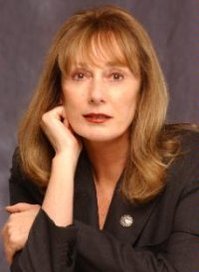 Espionage novelist Gale Lynds Today I’d like to welcome American romance author Jerry Byrum to my blog. Together we’re going to examine how author gender affects reader perception. Personally, I don’t care whether men or women write the novels I read. What does it matter, so long as they provide great content? To me, gender, when it comes to authors, is as relevant as hair colour or shoe size; it simply doesn’t matter. I’ve never agreed with the Mars/Venus approach, preferring a philosophy of life that emphasises similarities instead of differences. I’m betting, however, that if you’re someone who views the world in terms of male/female dichotomies, you’re likely to have a strong preference for either male or female writers. Fair enough if you choose male authors because you enjoy spy thrillers, or female ones because romance is your thing. There's no denying men and women dominate certain genres. What's more suspect is when people won't read espionage novels if they're written by a woman, such as Gale Lynds, or romances when penned by male authors, such as my friend Jerry Byrum.
Espionage novelist Gale Lynds Today I’d like to welcome American romance author Jerry Byrum to my blog. Together we’re going to examine how author gender affects reader perception. Personally, I don’t care whether men or women write the novels I read. What does it matter, so long as they provide great content? To me, gender, when it comes to authors, is as relevant as hair colour or shoe size; it simply doesn’t matter. I’ve never agreed with the Mars/Venus approach, preferring a philosophy of life that emphasises similarities instead of differences. I’m betting, however, that if you’re someone who views the world in terms of male/female dichotomies, you’re likely to have a strong preference for either male or female writers. Fair enough if you choose male authors because you enjoy spy thrillers, or female ones because romance is your thing. There's no denying men and women dominate certain genres. What's more suspect is when people won't read espionage novels if they're written by a woman, such as Gale Lynds, or romances when penned by male authors, such as my friend Jerry Byrum.
Stereotyped gender attitudes definitely exist towards novelists. When I told a friend I’d completed my first novel, his first question was ‘Is it a romance?’ Then there’s the time I told somebody I intended to write novels. ‘What sort?’ she enquired. ‘Children’s books?’ This person knew children don’t feature in my life. So why the presumption I’d write fiction for them?
I find it a shame that in 2014, there’s still such strong gender stereotyping. Women are clearly supposed to write soft, fluffy material, whilst men stick to hard action topics. Shouldn’t we be past this nonsense by now? Fair enough if the Bronte sisters had to write under male pseudonyms in Victorian England, but for gender still to matter in 2014? I don’t get it.
Initials have no gender bias
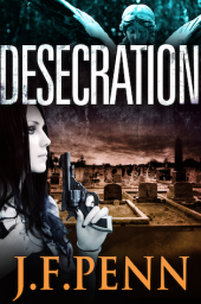 'Desecration' by J F Penn Other writers report similar issues. Author Joanna Penn writes thrillers using her initials J F Penn because she doesn’t want buyers to judge her work based on her gender. She writes in the Action Adventure category, one dominated by male writers. Her books contain violent scenes; one features a psychiatric patient being disembowelled. She’s received comments about how the reader thought a man must have written the book, or that they expected something more ‘delicate’. Joanna says on her blog:
'Desecration' by J F Penn Other writers report similar issues. Author Joanna Penn writes thrillers using her initials J F Penn because she doesn’t want buyers to judge her work based on her gender. She writes in the Action Adventure category, one dominated by male writers. Her books contain violent scenes; one features a psychiatric patient being disembowelled. She’s received comments about how the reader thought a man must have written the book, or that they expected something more ‘delicate’. Joanna says on her blog:
‘The author’s gender shouldn’t impact the way the story is read so it’s best to make it a non-issue. Initials are neutral. They have no gender bias and I like that approach.’
So how do these prejudices operate when it comes to men? Here’s where I step aside and let Jerry Byrum take the floor. I asked Jerry, as a male romance writer, to give us his take on the subject. Here’s what he had to say.
There is no sacred ground or ownership
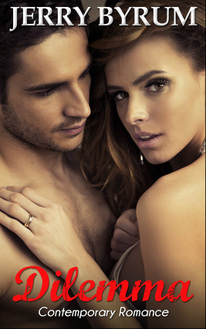 Click the image for more info! The notion that women or men writers/authors are better at particular genres is almost as mythical as saying short people should only write about short people and the same for tall people. Or that only doctors who've had a dreaded disease are permitted to treat it. Men and women have successfully broken through all kinds of areas or endeavors traditionally reserved for the respective genders. In my view, neither has a monopoly on a particular genre. There is no sacred ground or ownership. Creativity, such as writing, takes place on a broad playing field, and it's okay to break the rigid rules and color outside the lines, or write in the margins and off the page.
Click the image for more info! The notion that women or men writers/authors are better at particular genres is almost as mythical as saying short people should only write about short people and the same for tall people. Or that only doctors who've had a dreaded disease are permitted to treat it. Men and women have successfully broken through all kinds of areas or endeavors traditionally reserved for the respective genders. In my view, neither has a monopoly on a particular genre. There is no sacred ground or ownership. Creativity, such as writing, takes place on a broad playing field, and it's okay to break the rigid rules and color outside the lines, or write in the margins and off the page.
But what about writing romance? That shouldn't make a whit of difference. Even though real-time hetero romance fiction is composed of 50/50 male/female, the bias exists that only the female 50% can write better romance stories. That's hard for me to buy into.
However, a piece of information that shows up regularly across the internet is that women writers write approximately 95-98% of all romances, leaving a single-digit percentage to male writers. That high percentage alone, though, does not confirm that women are better at writing romance than men.
So why don't more men write romance?
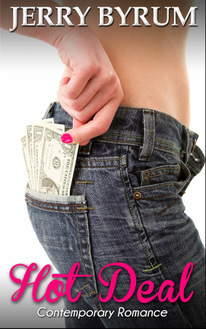 Click the image for more info! So why don't more men write romance? I believe that question takes us back to how we raise boys and girls in the home and culture/society. Boys and girls are usually directed into certain activities, and heavy emphasis is placed on "behaving" like a male or female.
Click the image for more info! So why don't more men write romance? I believe that question takes us back to how we raise boys and girls in the home and culture/society. Boys and girls are usually directed into certain activities, and heavy emphasis is placed on "behaving" like a male or female.
One of the criticisms often leveled at men who have written in the romance/erotic romance/erotica genres is that men writers tend to be rough-edged, abrasive, abrupt, or a combination in their writing of romance. Nicholas Sparks puts that argument to rest, and so does James Waller, of ‘The Bridges of Madison County’ fame. Both capture the "softer" edges of romance, and reflect well the female perspectives of their characters. Their works are immensely popular among women.
On the other hand, you've got Sandra Brown who writes edgy romance-suspense with a strong storyline, but with an impulsive romance angle. As well as a good dash of explicit description when things get intimate. Very popular with women.
The process of writing is gender neutral
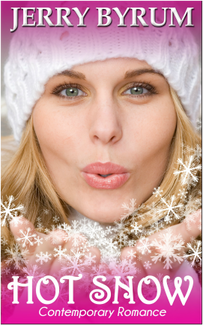 Click the image for more info! Then we've got the current BDSM/"billionaire-bad-boy" trend now popular. Both subgenres have received criticism that they foster a "harsher" portrayal of romance, and rough treatment of women. However, those bestsellers that have hit the New York Times and USA Today hallowed lists are authored not by men, but by women, and women readers drove those authors to the top of the lists. (There are deeper currents as to why the popularity exists, but I digress.)
Click the image for more info! Then we've got the current BDSM/"billionaire-bad-boy" trend now popular. Both subgenres have received criticism that they foster a "harsher" portrayal of romance, and rough treatment of women. However, those bestsellers that have hit the New York Times and USA Today hallowed lists are authored not by men, but by women, and women readers drove those authors to the top of the lists. (There are deeper currents as to why the popularity exists, but I digress.)
So who writes better romance, men or women? I say both can write excellent romance, and have. If we as writers, male and female, take our craft seriously, we'll quickly realize the process of writing has no gender; it is gender neutral. Men and women writers are equally capable of learning how to be flexible with words as they capture the full dimension of their characters. I think it's fair to expect all writers to get inside the head of each of their characters, male and female. I don't think writers can hide behind the solitary advice of writing "what you know," but we should also feel free to write what we don't know, and with a bit of research and imagination no telling what wonderful stories we can share with readers. Fiction is our invitation to do that.
Thank you, Jerry! What do readers think?
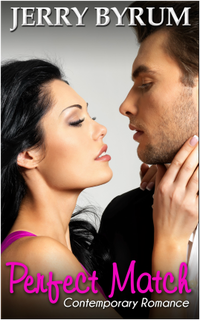 Click the image for more info! Thanks, Jerry! It's been a pleasure having you on my blog.
Click the image for more info! Thanks, Jerry! It's been a pleasure having you on my blog.
So what do readers think? Does the gender of a novelist influence you over whether to read their work? Do you expect women writers to be more ‘delicate’, as was said to Joanna Penn, and men more aggressive? Do you have a strong preference for either male or female writers, and if so, why? In which genres?
Or perhaps you're a writer who's encountered gender stereotypes when it comes to your work. Are you a male romance writer who find people expect guns and not roses from your fiction? Or are you like Joanna and me, surprising others with our choice of disembowelment and psychopaths as subject material? What do you think about novelists concealing their genders behind initials or pseudonyms? Leave a comment and let me know! Meanwhile, thanks for reading!
More about Jerry Byrum
 Romance novelist Jerry Byrum Jerry Byrum is a native of North Carolina. He is a graduate of High Point University, and East Carolina University. After service in the U.S. Army, Jerry taught public school science six years, and served as science consultant four years. He enjoyed a 25-year career as a National Representative of the American Federation of Teachers, with assignments in more than 30 states. He is a member of the Romance Writers of America, and enjoys writing edgy contemporary romance, with strong female protagonists and other runaway characters usually on a mission to satisfy their passions. He writes and relaxes from the mountains to the coast of the variety vacationland, North Carolina.
Romance novelist Jerry Byrum Jerry Byrum is a native of North Carolina. He is a graduate of High Point University, and East Carolina University. After service in the U.S. Army, Jerry taught public school science six years, and served as science consultant four years. He enjoyed a 25-year career as a National Representative of the American Federation of Teachers, with assignments in more than 30 states. He is a member of the Romance Writers of America, and enjoys writing edgy contemporary romance, with strong female protagonists and other runaway characters usually on a mission to satisfy their passions. He writes and relaxes from the mountains to the coast of the variety vacationland, North Carolina.
Like to find out more about Jerry? You can connect with him via these links: website: www.jerrybyrum.com, or via Facebook, Twitter or Amazon. To buy his books, click on their images.
Subscribe to my newsletter and blog!
 I'd love to stay in contact with you! Why not sign up for my newsletter? It's an occasional communication to keep you informed about my new novel releases. I respect your privacy and will never sell your details to any third parties. To sign up, enter your details in the form at the top of the sidebar.
I'd love to stay in contact with you! Why not sign up for my newsletter? It's an occasional communication to keep you informed about my new novel releases. I respect your privacy and will never sell your details to any third parties. To sign up, enter your details in the form at the top of the sidebar.
And if you've enjoyed this blog post, how about subscribing via RSS feed or email? Either click the links in my blog sidebar or sign up via Networked Blogs, also in the sidebar. It'll be great to have you on board!
A warm welcome to Jerry Byrum!
 Espionage novelist Gale Lynds Today I’d like to welcome American romance author Jerry Byrum to my blog. Together we’re going to examine how author gender affects reader perception. Personally, I don’t care whether men or women write the novels I read. What does it matter, so long as they provide great content? To me, gender, when it comes to authors, is as relevant as hair colour or shoe size; it simply doesn’t matter. I’ve never agreed with the Mars/Venus approach, preferring a philosophy of life that emphasises similarities instead of differences. I’m betting, however, that if you’re someone who views the world in terms of male/female dichotomies, you’re likely to have a strong preference for either male or female writers. Fair enough if you choose male authors because you enjoy spy thrillers, or female ones because romance is your thing. There's no denying men and women dominate certain genres. What's more suspect is when people won't read espionage novels if they're written by a woman, such as Gale Lynds, or romances when penned by male authors, such as my friend Jerry Byrum.
Espionage novelist Gale Lynds Today I’d like to welcome American romance author Jerry Byrum to my blog. Together we’re going to examine how author gender affects reader perception. Personally, I don’t care whether men or women write the novels I read. What does it matter, so long as they provide great content? To me, gender, when it comes to authors, is as relevant as hair colour or shoe size; it simply doesn’t matter. I’ve never agreed with the Mars/Venus approach, preferring a philosophy of life that emphasises similarities instead of differences. I’m betting, however, that if you’re someone who views the world in terms of male/female dichotomies, you’re likely to have a strong preference for either male or female writers. Fair enough if you choose male authors because you enjoy spy thrillers, or female ones because romance is your thing. There's no denying men and women dominate certain genres. What's more suspect is when people won't read espionage novels if they're written by a woman, such as Gale Lynds, or romances when penned by male authors, such as my friend Jerry Byrum.Stereotyped gender attitudes definitely exist towards novelists. When I told a friend I’d completed my first novel, his first question was ‘Is it a romance?’ Then there’s the time I told somebody I intended to write novels. ‘What sort?’ she enquired. ‘Children’s books?’ This person knew children don’t feature in my life. So why the presumption I’d write fiction for them?
I find it a shame that in 2014, there’s still such strong gender stereotyping. Women are clearly supposed to write soft, fluffy material, whilst men stick to hard action topics. Shouldn’t we be past this nonsense by now? Fair enough if the Bronte sisters had to write under male pseudonyms in Victorian England, but for gender still to matter in 2014? I don’t get it.
Initials have no gender bias
 'Desecration' by J F Penn Other writers report similar issues. Author Joanna Penn writes thrillers using her initials J F Penn because she doesn’t want buyers to judge her work based on her gender. She writes in the Action Adventure category, one dominated by male writers. Her books contain violent scenes; one features a psychiatric patient being disembowelled. She’s received comments about how the reader thought a man must have written the book, or that they expected something more ‘delicate’. Joanna says on her blog:
'Desecration' by J F Penn Other writers report similar issues. Author Joanna Penn writes thrillers using her initials J F Penn because she doesn’t want buyers to judge her work based on her gender. She writes in the Action Adventure category, one dominated by male writers. Her books contain violent scenes; one features a psychiatric patient being disembowelled. She’s received comments about how the reader thought a man must have written the book, or that they expected something more ‘delicate’. Joanna says on her blog:‘The author’s gender shouldn’t impact the way the story is read so it’s best to make it a non-issue. Initials are neutral. They have no gender bias and I like that approach.’
So how do these prejudices operate when it comes to men? Here’s where I step aside and let Jerry Byrum take the floor. I asked Jerry, as a male romance writer, to give us his take on the subject. Here’s what he had to say.
There is no sacred ground or ownership
 Click the image for more info! The notion that women or men writers/authors are better at particular genres is almost as mythical as saying short people should only write about short people and the same for tall people. Or that only doctors who've had a dreaded disease are permitted to treat it. Men and women have successfully broken through all kinds of areas or endeavors traditionally reserved for the respective genders. In my view, neither has a monopoly on a particular genre. There is no sacred ground or ownership. Creativity, such as writing, takes place on a broad playing field, and it's okay to break the rigid rules and color outside the lines, or write in the margins and off the page.
Click the image for more info! The notion that women or men writers/authors are better at particular genres is almost as mythical as saying short people should only write about short people and the same for tall people. Or that only doctors who've had a dreaded disease are permitted to treat it. Men and women have successfully broken through all kinds of areas or endeavors traditionally reserved for the respective genders. In my view, neither has a monopoly on a particular genre. There is no sacred ground or ownership. Creativity, such as writing, takes place on a broad playing field, and it's okay to break the rigid rules and color outside the lines, or write in the margins and off the page.But what about writing romance? That shouldn't make a whit of difference. Even though real-time hetero romance fiction is composed of 50/50 male/female, the bias exists that only the female 50% can write better romance stories. That's hard for me to buy into.
However, a piece of information that shows up regularly across the internet is that women writers write approximately 95-98% of all romances, leaving a single-digit percentage to male writers. That high percentage alone, though, does not confirm that women are better at writing romance than men.
So why don't more men write romance?
 Click the image for more info! So why don't more men write romance? I believe that question takes us back to how we raise boys and girls in the home and culture/society. Boys and girls are usually directed into certain activities, and heavy emphasis is placed on "behaving" like a male or female.
Click the image for more info! So why don't more men write romance? I believe that question takes us back to how we raise boys and girls in the home and culture/society. Boys and girls are usually directed into certain activities, and heavy emphasis is placed on "behaving" like a male or female.One of the criticisms often leveled at men who have written in the romance/erotic romance/erotica genres is that men writers tend to be rough-edged, abrasive, abrupt, or a combination in their writing of romance. Nicholas Sparks puts that argument to rest, and so does James Waller, of ‘The Bridges of Madison County’ fame. Both capture the "softer" edges of romance, and reflect well the female perspectives of their characters. Their works are immensely popular among women.
On the other hand, you've got Sandra Brown who writes edgy romance-suspense with a strong storyline, but with an impulsive romance angle. As well as a good dash of explicit description when things get intimate. Very popular with women.
The process of writing is gender neutral
 Click the image for more info! Then we've got the current BDSM/"billionaire-bad-boy" trend now popular. Both subgenres have received criticism that they foster a "harsher" portrayal of romance, and rough treatment of women. However, those bestsellers that have hit the New York Times and USA Today hallowed lists are authored not by men, but by women, and women readers drove those authors to the top of the lists. (There are deeper currents as to why the popularity exists, but I digress.)
Click the image for more info! Then we've got the current BDSM/"billionaire-bad-boy" trend now popular. Both subgenres have received criticism that they foster a "harsher" portrayal of romance, and rough treatment of women. However, those bestsellers that have hit the New York Times and USA Today hallowed lists are authored not by men, but by women, and women readers drove those authors to the top of the lists. (There are deeper currents as to why the popularity exists, but I digress.)So who writes better romance, men or women? I say both can write excellent romance, and have. If we as writers, male and female, take our craft seriously, we'll quickly realize the process of writing has no gender; it is gender neutral. Men and women writers are equally capable of learning how to be flexible with words as they capture the full dimension of their characters. I think it's fair to expect all writers to get inside the head of each of their characters, male and female. I don't think writers can hide behind the solitary advice of writing "what you know," but we should also feel free to write what we don't know, and with a bit of research and imagination no telling what wonderful stories we can share with readers. Fiction is our invitation to do that.
Thank you, Jerry! What do readers think?
 Click the image for more info! Thanks, Jerry! It's been a pleasure having you on my blog.
Click the image for more info! Thanks, Jerry! It's been a pleasure having you on my blog.So what do readers think? Does the gender of a novelist influence you over whether to read their work? Do you expect women writers to be more ‘delicate’, as was said to Joanna Penn, and men more aggressive? Do you have a strong preference for either male or female writers, and if so, why? In which genres?
Or perhaps you're a writer who's encountered gender stereotypes when it comes to your work. Are you a male romance writer who find people expect guns and not roses from your fiction? Or are you like Joanna and me, surprising others with our choice of disembowelment and psychopaths as subject material? What do you think about novelists concealing their genders behind initials or pseudonyms? Leave a comment and let me know! Meanwhile, thanks for reading!
More about Jerry Byrum
 Romance novelist Jerry Byrum Jerry Byrum is a native of North Carolina. He is a graduate of High Point University, and East Carolina University. After service in the U.S. Army, Jerry taught public school science six years, and served as science consultant four years. He enjoyed a 25-year career as a National Representative of the American Federation of Teachers, with assignments in more than 30 states. He is a member of the Romance Writers of America, and enjoys writing edgy contemporary romance, with strong female protagonists and other runaway characters usually on a mission to satisfy their passions. He writes and relaxes from the mountains to the coast of the variety vacationland, North Carolina.
Romance novelist Jerry Byrum Jerry Byrum is a native of North Carolina. He is a graduate of High Point University, and East Carolina University. After service in the U.S. Army, Jerry taught public school science six years, and served as science consultant four years. He enjoyed a 25-year career as a National Representative of the American Federation of Teachers, with assignments in more than 30 states. He is a member of the Romance Writers of America, and enjoys writing edgy contemporary romance, with strong female protagonists and other runaway characters usually on a mission to satisfy their passions. He writes and relaxes from the mountains to the coast of the variety vacationland, North Carolina.Like to find out more about Jerry? You can connect with him via these links: website: www.jerrybyrum.com, or via Facebook, Twitter or Amazon. To buy his books, click on their images.
Subscribe to my newsletter and blog!
 I'd love to stay in contact with you! Why not sign up for my newsletter? It's an occasional communication to keep you informed about my new novel releases. I respect your privacy and will never sell your details to any third parties. To sign up, enter your details in the form at the top of the sidebar.
I'd love to stay in contact with you! Why not sign up for my newsletter? It's an occasional communication to keep you informed about my new novel releases. I respect your privacy and will never sell your details to any third parties. To sign up, enter your details in the form at the top of the sidebar.And if you've enjoyed this blog post, how about subscribing via RSS feed or email? Either click the links in my blog sidebar or sign up via Networked Blogs, also in the sidebar. It'll be great to have you on board!
Published on September 18, 2014 00:01
September 11, 2014
Five Big Juicy Ways Novels Enrich Life
By Maggie James
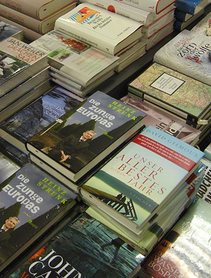 Aren't books beautiful? 'I don't read novels,' someone once told me, his tone dismissive. 'I don't waste time with bullshit. Know what I mean?'
Aren't books beautiful? 'I don't read novels,' someone once told me, his tone dismissive. 'I don't waste time with bullshit. Know what I mean?'
My response? I chose not to reply, but to deflect the conversation. Had I answered his question, I'd have done so with an emphatic negative. Apart from the comment being provocative, making it to a lifelong bookworm like me was pointless. No, I don't know what he meant about novels being bullshit. Never have, never will. I suspect anyone reading this blog is likely to side with Team Maggie on this one!
It's not that I don't understand why people don't read fiction. I do, despite my lifelong love of books. You see, I'm someone who doesn't care for music. This attracts gasps of horror from music aficionados, who refuse to believe me. 'You must enjoy music!' they tell me. 'Music is life!' For them, perhaps, but not for me. Each to their own, as the saying goes. Music doesn't feature in my existence and that's my choice. The difference between my fiction-loathing friend and me is that I'm not dismissive about what I don't enjoy. To dub all music bullshit would be ridiculous; it's a huge source of pleasure for many. I suspect that's what grated about my friend's comment. Fair enough if he doesn't enjoy fiction. But to brand all novels as bullshit strikes me as plain daft. Of course, some people pride themselves on a philistinic approach towards cultural matters, and that's their right. For me, however, fiction, especially in the form of novels, has enriched my life beyond measure.
Let's examine five ways in which great novels enhance our lives
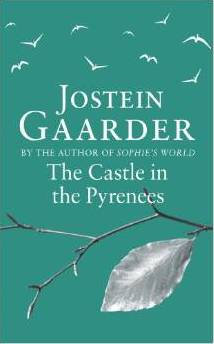 Gaarder's 'The Castle in the Pyrenees' 1. They're a great means of entertainment and relaxation. For bookworms, the joy of curling up with a novel can't be underestimated. I've just finished Jostein Gaarder's 'The Castle in the Pyrenees'. The book was so good I read it in one evening, enchanted by the descriptions of Norwegian fjords and glaciers. As for guilty pleasures, I enjoy any novel by Lee Child or Stephen King, both masters of their craft. A new book to read is a simple joy, but priceless. Not to mention a fantastic way to take time out.
Gaarder's 'The Castle in the Pyrenees' 1. They're a great means of entertainment and relaxation. For bookworms, the joy of curling up with a novel can't be underestimated. I've just finished Jostein Gaarder's 'The Castle in the Pyrenees'. The book was so good I read it in one evening, enchanted by the descriptions of Norwegian fjords and glaciers. As for guilty pleasures, I enjoy any novel by Lee Child or Stephen King, both masters of their craft. A new book to read is a simple joy, but priceless. Not to mention a fantastic way to take time out.
2. Reading keeps our brains sharp, increases our cognitive skills and boosts our vocabulary. A study published in 2013 showed that fiction enhances connectivity within the brain, especially in the area of language. Makes sense, doesn't it? As we read, we're studying sentence construction and spelling without being conscious we're doing so.
3. Books can educate us. An example is 'Sophie's World' by Jostein Gaarder. Clothed in the story of fourteen-year-old Sophie Amundsen lies a wonderful history of philosophical thinking, which teaches as it entertains. As mentioned above, I've also read Gaardner's novel 'The Castle in the Pyrenees', another educational read. This book focuses on a debate between a Christian and an atheist, examining issues such as the origin of the universe and life after death. All wrapped up in an intriguing story about the consequences of a hit-and-run accident in Norway. Education without the classroom!
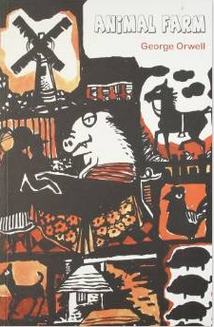 Orwell's 'Animal Farm' 4. Novels provide both social and political commentary. A great example of the former is Harper Lee's 'To Kill a Mockingbird', a biting examination of racial inequality and prejudice. The book also addresses issues of class and gender roles in the American Deep South, its lessons emphasising the need for tolerance and acceptance. For political commentary, look no further than George Orwell's 'Animal Farm'. The book is an exposition of Russia under the Stalinist regime, in which Orwell fuses politics and art in a chilling study of totalitarian rule. From such novels, especially when read from a different historical perspective, we can learn valuable lessons.
Orwell's 'Animal Farm' 4. Novels provide both social and political commentary. A great example of the former is Harper Lee's 'To Kill a Mockingbird', a biting examination of racial inequality and prejudice. The book also addresses issues of class and gender roles in the American Deep South, its lessons emphasising the need for tolerance and acceptance. For political commentary, look no further than George Orwell's 'Animal Farm'. The book is an exposition of Russia under the Stalinist regime, in which Orwell fuses politics and art in a chilling study of totalitarian rule. From such novels, especially when read from a different historical perspective, we can learn valuable lessons.
5. Novels, especially the classics, add beauty to life. Lovers of Thomas Hardy's books thrill to his lyrical descriptions of the Dorset countryside. Fans of Charles Dickens marvel at his skill in creating characters, such as Wackford Squeers and the Artful Dodger. In adding beauty to our lives, books also contribute to our cultural heritage. Imagine a world without literature. For me, if not my fiction-hating friend, Earth would be a planet lacking the wonder that novels provide. Events such as the destruction of books under China's Qin Dynasty or the Nazi book burnings are akin to sacrilege for me. Works of cultural significance trampled under the boots of repressive regimes - it's no coincidence that the need to control and a hatred of the arts often walk hand in hand. Literature, when allowed to flourish, makes an invaluable contribution to our lives. As does music, for those who love it!
Let's hear from you!
What novels have you found educational? Do you agree that books enrich our lives and add beauty to them? Are there any roles books fulfil that I've not covered? Leave a comment and let me know!
Subscribe to my newsletter and blog!
 I'd love to stay in contact with you! Why not sign up for my newsletter? It's an occasional communication to keep you informed about my new novel releases. I respect your privacy and will never sell your details to any third parties. To sign up, enter your details in the form at the top of the sidebar.
I'd love to stay in contact with you! Why not sign up for my newsletter? It's an occasional communication to keep you informed about my new novel releases. I respect your privacy and will never sell your details to any third parties. To sign up, enter your details in the form at the top of the sidebar.
And if you've enjoyed this blog post, how about subscribing via RSS feed or email? Either click the links in my blog sidebar or sign up via Networked Blogs, also in the sidebar. It'll be great to have you on board!
 Aren't books beautiful? 'I don't read novels,' someone once told me, his tone dismissive. 'I don't waste time with bullshit. Know what I mean?'
Aren't books beautiful? 'I don't read novels,' someone once told me, his tone dismissive. 'I don't waste time with bullshit. Know what I mean?'My response? I chose not to reply, but to deflect the conversation. Had I answered his question, I'd have done so with an emphatic negative. Apart from the comment being provocative, making it to a lifelong bookworm like me was pointless. No, I don't know what he meant about novels being bullshit. Never have, never will. I suspect anyone reading this blog is likely to side with Team Maggie on this one!
It's not that I don't understand why people don't read fiction. I do, despite my lifelong love of books. You see, I'm someone who doesn't care for music. This attracts gasps of horror from music aficionados, who refuse to believe me. 'You must enjoy music!' they tell me. 'Music is life!' For them, perhaps, but not for me. Each to their own, as the saying goes. Music doesn't feature in my existence and that's my choice. The difference between my fiction-loathing friend and me is that I'm not dismissive about what I don't enjoy. To dub all music bullshit would be ridiculous; it's a huge source of pleasure for many. I suspect that's what grated about my friend's comment. Fair enough if he doesn't enjoy fiction. But to brand all novels as bullshit strikes me as plain daft. Of course, some people pride themselves on a philistinic approach towards cultural matters, and that's their right. For me, however, fiction, especially in the form of novels, has enriched my life beyond measure.
Let's examine five ways in which great novels enhance our lives
 Gaarder's 'The Castle in the Pyrenees' 1. They're a great means of entertainment and relaxation. For bookworms, the joy of curling up with a novel can't be underestimated. I've just finished Jostein Gaarder's 'The Castle in the Pyrenees'. The book was so good I read it in one evening, enchanted by the descriptions of Norwegian fjords and glaciers. As for guilty pleasures, I enjoy any novel by Lee Child or Stephen King, both masters of their craft. A new book to read is a simple joy, but priceless. Not to mention a fantastic way to take time out.
Gaarder's 'The Castle in the Pyrenees' 1. They're a great means of entertainment and relaxation. For bookworms, the joy of curling up with a novel can't be underestimated. I've just finished Jostein Gaarder's 'The Castle in the Pyrenees'. The book was so good I read it in one evening, enchanted by the descriptions of Norwegian fjords and glaciers. As for guilty pleasures, I enjoy any novel by Lee Child or Stephen King, both masters of their craft. A new book to read is a simple joy, but priceless. Not to mention a fantastic way to take time out.2. Reading keeps our brains sharp, increases our cognitive skills and boosts our vocabulary. A study published in 2013 showed that fiction enhances connectivity within the brain, especially in the area of language. Makes sense, doesn't it? As we read, we're studying sentence construction and spelling without being conscious we're doing so.
3. Books can educate us. An example is 'Sophie's World' by Jostein Gaarder. Clothed in the story of fourteen-year-old Sophie Amundsen lies a wonderful history of philosophical thinking, which teaches as it entertains. As mentioned above, I've also read Gaardner's novel 'The Castle in the Pyrenees', another educational read. This book focuses on a debate between a Christian and an atheist, examining issues such as the origin of the universe and life after death. All wrapped up in an intriguing story about the consequences of a hit-and-run accident in Norway. Education without the classroom!
 Orwell's 'Animal Farm' 4. Novels provide both social and political commentary. A great example of the former is Harper Lee's 'To Kill a Mockingbird', a biting examination of racial inequality and prejudice. The book also addresses issues of class and gender roles in the American Deep South, its lessons emphasising the need for tolerance and acceptance. For political commentary, look no further than George Orwell's 'Animal Farm'. The book is an exposition of Russia under the Stalinist regime, in which Orwell fuses politics and art in a chilling study of totalitarian rule. From such novels, especially when read from a different historical perspective, we can learn valuable lessons.
Orwell's 'Animal Farm' 4. Novels provide both social and political commentary. A great example of the former is Harper Lee's 'To Kill a Mockingbird', a biting examination of racial inequality and prejudice. The book also addresses issues of class and gender roles in the American Deep South, its lessons emphasising the need for tolerance and acceptance. For political commentary, look no further than George Orwell's 'Animal Farm'. The book is an exposition of Russia under the Stalinist regime, in which Orwell fuses politics and art in a chilling study of totalitarian rule. From such novels, especially when read from a different historical perspective, we can learn valuable lessons.5. Novels, especially the classics, add beauty to life. Lovers of Thomas Hardy's books thrill to his lyrical descriptions of the Dorset countryside. Fans of Charles Dickens marvel at his skill in creating characters, such as Wackford Squeers and the Artful Dodger. In adding beauty to our lives, books also contribute to our cultural heritage. Imagine a world without literature. For me, if not my fiction-hating friend, Earth would be a planet lacking the wonder that novels provide. Events such as the destruction of books under China's Qin Dynasty or the Nazi book burnings are akin to sacrilege for me. Works of cultural significance trampled under the boots of repressive regimes - it's no coincidence that the need to control and a hatred of the arts often walk hand in hand. Literature, when allowed to flourish, makes an invaluable contribution to our lives. As does music, for those who love it!
Let's hear from you!
What novels have you found educational? Do you agree that books enrich our lives and add beauty to them? Are there any roles books fulfil that I've not covered? Leave a comment and let me know!
Subscribe to my newsletter and blog!
 I'd love to stay in contact with you! Why not sign up for my newsletter? It's an occasional communication to keep you informed about my new novel releases. I respect your privacy and will never sell your details to any third parties. To sign up, enter your details in the form at the top of the sidebar.
I'd love to stay in contact with you! Why not sign up for my newsletter? It's an occasional communication to keep you informed about my new novel releases. I respect your privacy and will never sell your details to any third parties. To sign up, enter your details in the form at the top of the sidebar.And if you've enjoyed this blog post, how about subscribing via RSS feed or email? Either click the links in my blog sidebar or sign up via Networked Blogs, also in the sidebar. It'll be great to have you on board!
Published on September 11, 2014 07:14
September 3, 2014
How Books Evoke a Sense of Nostalgia
Guest post by Melissa Groeling
Today's blog post is by author Melissa Groeling, who talks about how great books can evoke a sense of nostalgia. I'm happy to welcome Melissa to my blog, and I hope you enjoy her post. Over to you, Melissa...
No tinge of sadness at all...
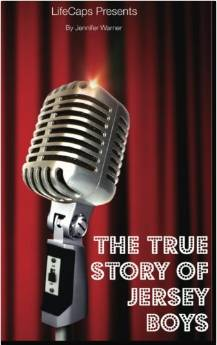 Jersey Boys - Jennifer Warner, 2014 So I took my mom to see Jersey Boys over the weekend. It was fantastic. Even if you don’t think you know the music of Frankie Valli and the Four Seasons, believe me, you’ll know when you hear it. Their songs are literally everywhere. Their music broke boundaries and the story of the group was both fascinating and heartbreaking.
Jersey Boys - Jennifer Warner, 2014 So I took my mom to see Jersey Boys over the weekend. It was fantastic. Even if you don’t think you know the music of Frankie Valli and the Four Seasons, believe me, you’ll know when you hear it. Their songs are literally everywhere. Their music broke boundaries and the story of the group was both fascinating and heartbreaking.
My mom saw the real guys back in the sixties. You should’ve seen the stars in her eyes when she told me about it. After the Broadway show, I asked her who she thought was better. Naturally, she said the real guys but these Broadway songbirds were a close second. Then I asked her,
“Was the music as you remembered it?”
She answered with an emphatic “yes.”
Most of the time when we’re faced with something from our past, the lingering after-taste is that of sadness and often times, a little regret. But there wasn’t a tinge of sadness in my mom’s smile as we broke into an extremely off-key rendition of Walk Like a Man while strolling along Eighth Avenue of New York City.
Some books never lose their magic
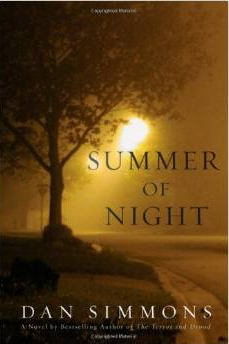 Summer of Night, Dan Simmons, 1991 So my question to you is this:
Summer of Night, Dan Simmons, 1991 So my question to you is this:
Is there anything from your past that you’re faced with presently that holds the same magic as it did the first time you encountered it?
It could be a book, a movie, music or maybe even a recipe your mother used to make. I agree that a lot of things lose their luster after a certain amount of time but honestly, I find that some books never lose their magic.
I’m a huge fan of Dan Simmons’ Summer of Night. I was a little daunted by the sheer size of it (well over 700 pages) but I literally inhaled it. And I inhaled it two more times after that. It takes place during the summer so I always seem to read it during that time of year. If the characters are going to sweat buckets, I might as well do it too. For as many times as I’ve read it, I always something new, some small detail that was overlooked and always, always, I come away from the story, shaking my head and muttering,
“I hope they don’t ever make this book into a movie.”
Talk about losing the magic.
The rustling of the stalks in the cornfield...
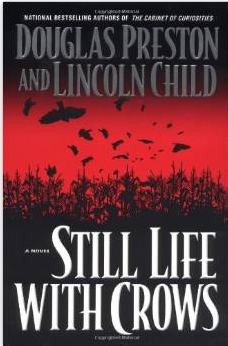 Still Life With Crows, Preston/Child, 2003 I remember being on a literary classic binge. I was reading everything from The Jungle to Mary Shelley’s Frankenstein and Jane Eyre and I’ll admit that I positively bawled my eyes out at the end of A Tale of Cities. I hardly ever cry at the end of books. Movies, yes, books, not so much. But this one sent me over the edge. Strange thing was a few weeks before my sister got married, I read the book again.
Still Life With Crows, Preston/Child, 2003 I remember being on a literary classic binge. I was reading everything from The Jungle to Mary Shelley’s Frankenstein and Jane Eyre and I’ll admit that I positively bawled my eyes out at the end of A Tale of Cities. I hardly ever cry at the end of books. Movies, yes, books, not so much. But this one sent me over the edge. Strange thing was a few weeks before my sister got married, I read the book again.
And I cried even harder than the first time!
I don’t know if it was because of my sister’s impending nuptials or what but wow, I went through a lot of tissues. And it’s because of that last paragraph! It made me think of years gone by, of time lost, of self-sacrifice, of my sister moving on in her life with her soon-to-be husband and the changes that would come from that. I’ll tell you—I never thought Charles Dickens would make me cry.
There was a summer where I read Still Life with Crows and even to this day, I will never look at cornfields the same way again. Not to give anything away, but there was…something in the cornfields that surrounded this little, in-the-middle-of-nowhere town. The first time I read it, the little hairs on the back of my neck would not stop standing straight up. I could almost hear the rustling of the stalks, could sense the great emptiness around them because there was always someone crazy enough to be out in the middle of the cornfield at night.
Now, to be fair, I did read Still Life with Crows a second time and those small hairs on the back of my neck stayed put. But honestly, the wariness of going past a cornfield stuck. Even when I’m driving, the caution is there. It wouldn’t take much for something to step out into the road, would it?
So what books do you still love after all this time?
Find out more about Melissa Groeling here!
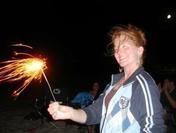 Author Melissa Groeling Thanks, Melissa, for a great post! Leave a comment and let us know what books evoke nostalgia for you, and why!
Author Melissa Groeling Thanks, Melissa, for a great post! Leave a comment and let us know what books evoke nostalgia for you, and why!
Melissa Groeling graduated from Bloomsburg University with a degree in English. She lives, reads and writes in the Philadelphia region and wherever else life happens to send her. She is a hardcore New York Giants fan and loves chocolate. Lights Out is her second novel to date.
You can connect with Melissa via Facebook, Twitter, or via her blog.
And about her books here...
Lights Out
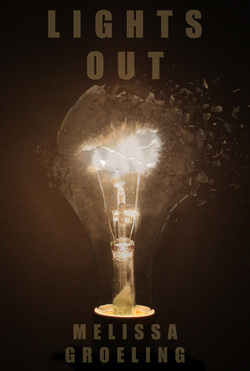 Even when the lights are out, he can still see you…
Even when the lights are out, he can still see you…
Paul Holten’s profession doesn’t leave much room for doubt or conscience but he’s reaching his breaking point. The nightmares are getting worse, the jobs are getting harder to finish and the volatile relationship with his boss, Aaron, is falling apart. Now faced with the possibility of an impending death sentence, Paul makes the fatal decision to run. Drawn into one hellish situation after another, he’s forced to confront his dark past---and wonder if perhaps dying isn’t the better option.
Available from Amazon, Barnes and Noble and All Romance Ebooks.
Traffic Jam
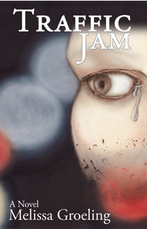 When you’re caught in traffic, you’ve got nowhere to go…
When you’re caught in traffic, you’ve got nowhere to go…
Val Delton’s life is spiraling and there’s nothing she can do to stop it. Her dad lost his job, her mom works fourteen hour days to pay the bills and yet somehow there are high-end shopping bags and an iPod in her older sister’s room. Naturally, Val becomes suspicious but her sister’s lips are sealed. Then by accident, she uncovers a dark, dangerous secret hidden behind her sister’s bright smiles and cool indifference. Val has no idea how far and how deep the repercussions of her sister’s secret will reach but she’ll do whatever it takes to keep her family safe. Will she succeed before her sister’s secret destroys everyone she loves?
Subscribe to my newsletter and blog!
 I'd love to stay in contact with you! Why not sign up for my newsletter? It's an occasional communication to keep you informed about my new novel releases. I respect your privacy and will never sell your details to any third parties. To sign up, enter your details in the form at the top of the sidebar.
I'd love to stay in contact with you! Why not sign up for my newsletter? It's an occasional communication to keep you informed about my new novel releases. I respect your privacy and will never sell your details to any third parties. To sign up, enter your details in the form at the top of the sidebar.
And if you've enjoyed this blog post, how about subscribing via RSS feed or email? Either click the links in my blog sidebar or sign up via Networked Blogs, also in the sidebar. It'll be great to have you on board!
Today's blog post is by author Melissa Groeling, who talks about how great books can evoke a sense of nostalgia. I'm happy to welcome Melissa to my blog, and I hope you enjoy her post. Over to you, Melissa...
No tinge of sadness at all...
 Jersey Boys - Jennifer Warner, 2014 So I took my mom to see Jersey Boys over the weekend. It was fantastic. Even if you don’t think you know the music of Frankie Valli and the Four Seasons, believe me, you’ll know when you hear it. Their songs are literally everywhere. Their music broke boundaries and the story of the group was both fascinating and heartbreaking.
Jersey Boys - Jennifer Warner, 2014 So I took my mom to see Jersey Boys over the weekend. It was fantastic. Even if you don’t think you know the music of Frankie Valli and the Four Seasons, believe me, you’ll know when you hear it. Their songs are literally everywhere. Their music broke boundaries and the story of the group was both fascinating and heartbreaking.My mom saw the real guys back in the sixties. You should’ve seen the stars in her eyes when she told me about it. After the Broadway show, I asked her who she thought was better. Naturally, she said the real guys but these Broadway songbirds were a close second. Then I asked her,
“Was the music as you remembered it?”
She answered with an emphatic “yes.”
Most of the time when we’re faced with something from our past, the lingering after-taste is that of sadness and often times, a little regret. But there wasn’t a tinge of sadness in my mom’s smile as we broke into an extremely off-key rendition of Walk Like a Man while strolling along Eighth Avenue of New York City.
Some books never lose their magic
 Summer of Night, Dan Simmons, 1991 So my question to you is this:
Summer of Night, Dan Simmons, 1991 So my question to you is this:Is there anything from your past that you’re faced with presently that holds the same magic as it did the first time you encountered it?
It could be a book, a movie, music or maybe even a recipe your mother used to make. I agree that a lot of things lose their luster after a certain amount of time but honestly, I find that some books never lose their magic.
I’m a huge fan of Dan Simmons’ Summer of Night. I was a little daunted by the sheer size of it (well over 700 pages) but I literally inhaled it. And I inhaled it two more times after that. It takes place during the summer so I always seem to read it during that time of year. If the characters are going to sweat buckets, I might as well do it too. For as many times as I’ve read it, I always something new, some small detail that was overlooked and always, always, I come away from the story, shaking my head and muttering,
“I hope they don’t ever make this book into a movie.”
Talk about losing the magic.
The rustling of the stalks in the cornfield...
 Still Life With Crows, Preston/Child, 2003 I remember being on a literary classic binge. I was reading everything from The Jungle to Mary Shelley’s Frankenstein and Jane Eyre and I’ll admit that I positively bawled my eyes out at the end of A Tale of Cities. I hardly ever cry at the end of books. Movies, yes, books, not so much. But this one sent me over the edge. Strange thing was a few weeks before my sister got married, I read the book again.
Still Life With Crows, Preston/Child, 2003 I remember being on a literary classic binge. I was reading everything from The Jungle to Mary Shelley’s Frankenstein and Jane Eyre and I’ll admit that I positively bawled my eyes out at the end of A Tale of Cities. I hardly ever cry at the end of books. Movies, yes, books, not so much. But this one sent me over the edge. Strange thing was a few weeks before my sister got married, I read the book again.And I cried even harder than the first time!
I don’t know if it was because of my sister’s impending nuptials or what but wow, I went through a lot of tissues. And it’s because of that last paragraph! It made me think of years gone by, of time lost, of self-sacrifice, of my sister moving on in her life with her soon-to-be husband and the changes that would come from that. I’ll tell you—I never thought Charles Dickens would make me cry.
There was a summer where I read Still Life with Crows and even to this day, I will never look at cornfields the same way again. Not to give anything away, but there was…something in the cornfields that surrounded this little, in-the-middle-of-nowhere town. The first time I read it, the little hairs on the back of my neck would not stop standing straight up. I could almost hear the rustling of the stalks, could sense the great emptiness around them because there was always someone crazy enough to be out in the middle of the cornfield at night.
Now, to be fair, I did read Still Life with Crows a second time and those small hairs on the back of my neck stayed put. But honestly, the wariness of going past a cornfield stuck. Even when I’m driving, the caution is there. It wouldn’t take much for something to step out into the road, would it?
So what books do you still love after all this time?
Find out more about Melissa Groeling here!
 Author Melissa Groeling Thanks, Melissa, for a great post! Leave a comment and let us know what books evoke nostalgia for you, and why!
Author Melissa Groeling Thanks, Melissa, for a great post! Leave a comment and let us know what books evoke nostalgia for you, and why!Melissa Groeling graduated from Bloomsburg University with a degree in English. She lives, reads and writes in the Philadelphia region and wherever else life happens to send her. She is a hardcore New York Giants fan and loves chocolate. Lights Out is her second novel to date.
You can connect with Melissa via Facebook, Twitter, or via her blog.
And about her books here...
Lights Out
 Even when the lights are out, he can still see you…
Even when the lights are out, he can still see you…
Paul Holten’s profession doesn’t leave much room for doubt or conscience but he’s reaching his breaking point. The nightmares are getting worse, the jobs are getting harder to finish and the volatile relationship with his boss, Aaron, is falling apart. Now faced with the possibility of an impending death sentence, Paul makes the fatal decision to run. Drawn into one hellish situation after another, he’s forced to confront his dark past---and wonder if perhaps dying isn’t the better option.
Available from Amazon, Barnes and Noble and All Romance Ebooks.
Traffic Jam
 When you’re caught in traffic, you’ve got nowhere to go…
When you’re caught in traffic, you’ve got nowhere to go…
Val Delton’s life is spiraling and there’s nothing she can do to stop it. Her dad lost his job, her mom works fourteen hour days to pay the bills and yet somehow there are high-end shopping bags and an iPod in her older sister’s room. Naturally, Val becomes suspicious but her sister’s lips are sealed. Then by accident, she uncovers a dark, dangerous secret hidden behind her sister’s bright smiles and cool indifference. Val has no idea how far and how deep the repercussions of her sister’s secret will reach but she’ll do whatever it takes to keep her family safe. Will she succeed before her sister’s secret destroys everyone she loves?
Subscribe to my newsletter and blog!
 I'd love to stay in contact with you! Why not sign up for my newsletter? It's an occasional communication to keep you informed about my new novel releases. I respect your privacy and will never sell your details to any third parties. To sign up, enter your details in the form at the top of the sidebar.
I'd love to stay in contact with you! Why not sign up for my newsletter? It's an occasional communication to keep you informed about my new novel releases. I respect your privacy and will never sell your details to any third parties. To sign up, enter your details in the form at the top of the sidebar.And if you've enjoyed this blog post, how about subscribing via RSS feed or email? Either click the links in my blog sidebar or sign up via Networked Blogs, also in the sidebar. It'll be great to have you on board!
Published on September 03, 2014 06:56
August 27, 2014
Five Ways to Conceal Fictional Murders
By Maggie James
As part of my 'Five' series, today's blog post examines some of the devious ways fictional murderers endeavour to conceal their crimes. Warning - by its nature, this post contains plot spoilers. If you're OK with that, then read on...
1. Apparent lack of motive
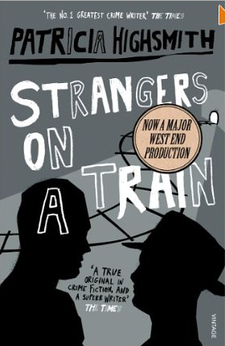 Cover of Kindle edition One way to escape detection as a murderer is to have no apparent motive. A great example is portrayed in Patricia Highsmith's 1950 thriller 'Strangers on a Train'. Architect Guy Haines is in love and wants to marry. There's just one catch - he already has a wife. What's more, she's unfaithful. On a train journey, Guy meet Charles Bruno, a psychopath keen to kill his father. They get chatting and Bruno proposes an ingenious solution to their issues - an exchange of murders. Bruno will kill Guy's errant wife if Guy returns the favour and murders Bruno's father. Bruno is convinced this will work because neither of them will have a motive for the murder they commit, meaning that the police will have no reason to suspect either of them. Guy's mistake is that he doesn't take Bruno seriously. However, Bruno kills Guy's wife while Guy is away in Mexico, and then informs Guy of his crime.
Cover of Kindle edition One way to escape detection as a murderer is to have no apparent motive. A great example is portrayed in Patricia Highsmith's 1950 thriller 'Strangers on a Train'. Architect Guy Haines is in love and wants to marry. There's just one catch - he already has a wife. What's more, she's unfaithful. On a train journey, Guy meet Charles Bruno, a psychopath keen to kill his father. They get chatting and Bruno proposes an ingenious solution to their issues - an exchange of murders. Bruno will kill Guy's errant wife if Guy returns the favour and murders Bruno's father. Bruno is convinced this will work because neither of them will have a motive for the murder they commit, meaning that the police will have no reason to suspect either of them. Guy's mistake is that he doesn't take Bruno seriously. However, Bruno kills Guy's wife while Guy is away in Mexico, and then informs Guy of his crime.
Although shocked, Guy hesitates to turn Bruno in to the police. The longer he remains silent, though, the more he implicates himself. In the coming months, Bruno makes increasing demands to pressurise Guy into fulfilling his part of the bargain. After Bruno starts writing anonymous letters to Guy's friends and colleagues, the pressure becomes too great, and Guy murders Bruno's father.
What an ingenious idea! Of course, Bruno's plan begins to unravel once a private detective establishes a connection between Bruno and Guy - but otherwise it might have worked... 2. An unshakable alibi
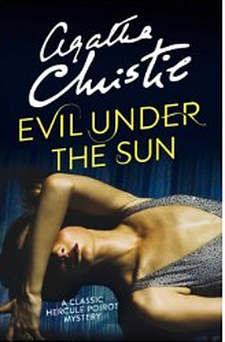 It couldn't have been me... Many novels exploit the idea of an unbreakable alibi, one firmly placing the culprit elsewhere when the murder was committed. An obvious way to do this is to make the time of death appear different from what it really was. Even skilled medical examiners can’t always pinpoint the time of death exactly, after all. Let's look at Agatha Christie’s 'Evil Under the Sun' (1982). Arlena Marshall, a famous and beautiful actress, is strangled while she, her husband Kenneth and her stepdaughter Linda are at the Jolly Roger seaside hotel. At first, it appears that no-one staying at the resort could have been responsible, but in fact the murderers have manipulated time so it provides a solid alibi for them. Until Hercule Poirot steps in to investigate...
It couldn't have been me... Many novels exploit the idea of an unbreakable alibi, one firmly placing the culprit elsewhere when the murder was committed. An obvious way to do this is to make the time of death appear different from what it really was. Even skilled medical examiners can’t always pinpoint the time of death exactly, after all. Let's look at Agatha Christie’s 'Evil Under the Sun' (1982). Arlena Marshall, a famous and beautiful actress, is strangled while she, her husband Kenneth and her stepdaughter Linda are at the Jolly Roger seaside hotel. At first, it appears that no-one staying at the resort could have been responsible, but in fact the murderers have manipulated time so it provides a solid alibi for them. Until Hercule Poirot steps in to investigate...
How did they do this? Easy. One of Arlena's murderers set Linda's watch 20 minutes forward. Then she asked Linda to check the time, thus giving the guilty pair an alibi for the supoosed time of the murder. Later, the same person adjusted the watch back. Simple yet clever, don't you think?
3. Death by natural causes
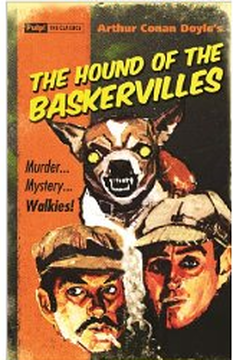 Isn't this a great cover? If you're a fictional character about to commit murder, what better way to conceal your crime than making it appear a natural death? No murder investigation, a quick burial... it has its advantages. One of the best-known examples is Arthur Conan Doyle's 'The Hound of the Baskervilles' (1902). When Sir Charles Baskerville is found dead on the wild moorland near his home, the cause of death is pronounced a heart attack. The elderly man suffered from a weak heart and blame is placed on a family curse after the footprints of a giant hound are reportedly near the body. According to legend, a spectral hound from hell patrols the moors, ready to bring death to the men of the Baskerville family following an ancestral pact with the Devil. Can Sherlock Holmes and Dr Watson protect Sir Charles's heir from meeting a similar fate?
Isn't this a great cover? If you're a fictional character about to commit murder, what better way to conceal your crime than making it appear a natural death? No murder investigation, a quick burial... it has its advantages. One of the best-known examples is Arthur Conan Doyle's 'The Hound of the Baskervilles' (1902). When Sir Charles Baskerville is found dead on the wild moorland near his home, the cause of death is pronounced a heart attack. The elderly man suffered from a weak heart and blame is placed on a family curse after the footprints of a giant hound are reportedly near the body. According to legend, a spectral hound from hell patrols the moors, ready to bring death to the men of the Baskerville family following an ancestral pact with the Devil. Can Sherlock Holmes and Dr Watson protect Sir Charles's heir from meeting a similar fate?
Sir Charles's death is, of course, no accident, but murder made to look like a heart attack. Sir Charles was known to be frightened by the curse, elderly and with heart problems, something his killer used to his advantage. The murderer reckoned without Sherlock Holmes's legendary powers of deduction, though! The plot is contrived, sure, but the descriptions of the bleak moors are so incredibly atmospheric and the narrative so creepy that somehow the reader overlooks the unliklihood of the novel's events.
4. Making murder appear an accident
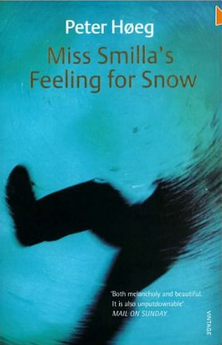 An intriguing and unusual read Following on from the above, another popular fictional murder method involves faking an accident. I recently read Peter Høeg’s 'Miss Smilla’s Feeling for Snow' (1993), which demonstrates this kind of murder.
An intriguing and unusual read Following on from the above, another popular fictional murder method involves faking an accident. I recently read Peter Høeg’s 'Miss Smilla’s Feeling for Snow' (1993), which demonstrates this kind of murder.
In the novel, a young boy, Isaiah Christiansen, falls to his death from the roof of the Copenhagen apartment building where he lives. Isaiah had captivated the heart of the normally rude and surly Greenlander Smilla Jasperson; he seemed the only person capable of penetrating the hard exterior she presents to the world. Distressed by his death, Smilla is drawn to the scene of the accident. When she gets there, she finds clues in the snow that lead her to believe that the boy’s death was not accidental. Thanks to her Greenland upbringing, Smilla is an expert in all matters snow and ice-related, knowledge that she brings to bear as she begins to ask questions. Before long, Smilla discovers that some dangerous people are determined to hide the truth. Her search for answers leads her back to her homeland, where she uncovers the connection between Isaiah’s death and some long-hidden secrets.
5. Making murder look like suicide
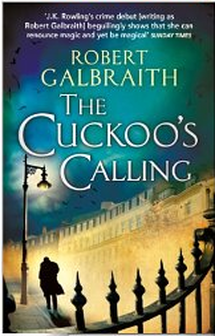 The pseudonym of J K Rowling A notable example of this murder method occurs in the 2013 novel by Robert Galbraith, 'The Cuckoo's Calling'. (Robert Galbraith is the pen name of J K Rowling, famous for the Harry Potter series of novels). In the book, Cormoran Strike, a private investigator with more than a few issues of his own, is hired by John Bristow, the adopted brother of famous supermodel Lula Landry, otherwise known as 'Cuckoo'. Lula's death is the result of falling five stories from the balcony of her Mayfair apartment building and has already been ruled a suicide. John Bristow, however, suspects otherwise. Strike is initially reluctant to take on the case, having read extensive media coverage of it. At first he's unwilling to reopen such a thoroughly investigated case. As he talks to those close to Lulu, including her security guard, personal driver, uncle, friends and designer, doubts emerge in his mind. Gradually Strike comes to realise that the circumstances of her death are more ambiguous than he imagined. Who wanted her dead, and did her personal fortune of ten million dollars provide a motive?
The pseudonym of J K Rowling A notable example of this murder method occurs in the 2013 novel by Robert Galbraith, 'The Cuckoo's Calling'. (Robert Galbraith is the pen name of J K Rowling, famous for the Harry Potter series of novels). In the book, Cormoran Strike, a private investigator with more than a few issues of his own, is hired by John Bristow, the adopted brother of famous supermodel Lula Landry, otherwise known as 'Cuckoo'. Lula's death is the result of falling five stories from the balcony of her Mayfair apartment building and has already been ruled a suicide. John Bristow, however, suspects otherwise. Strike is initially reluctant to take on the case, having read extensive media coverage of it. At first he's unwilling to reopen such a thoroughly investigated case. As he talks to those close to Lulu, including her security guard, personal driver, uncle, friends and designer, doubts emerge in his mind. Gradually Strike comes to realise that the circumstances of her death are more ambiguous than he imagined. Who wanted her dead, and did her personal fortune of ten million dollars provide a motive?
What fictional murder methods appeal most to you?
What kind of dastardly demises do you prefer in the novels you read? Do you like ones that are simple and perhaps more realistic, such as faking an accident or suicide, or do more complex killings float your boat? Perhaps something along the lines of the classic 'locked room' sub-genre of crime fiction, in which the murder seems impossible and has usually resulted from a contrived yet ingenious set of circumstances. Leave a comment and let me know!
Subscribe to my newsletter and blog!
 I'd love to stay in contact with you! Why not sign up for my newsletter? It's an occasional communication to keep you informed about my new novel releases. I respect your privacy and will never sell your details to any third parties. To sign up, enter your details in the form at the top of the sidebar.
I'd love to stay in contact with you! Why not sign up for my newsletter? It's an occasional communication to keep you informed about my new novel releases. I respect your privacy and will never sell your details to any third parties. To sign up, enter your details in the form at the top of the sidebar.
And if you've enjoyed this blog post, how about subscribing via RSS feed or email? Either click the links in my blog sidebar or sign up via Networked Blogs, also in the sidebar. It'll be great to have you on board!
As part of my 'Five' series, today's blog post examines some of the devious ways fictional murderers endeavour to conceal their crimes. Warning - by its nature, this post contains plot spoilers. If you're OK with that, then read on...
1. Apparent lack of motive
 Cover of Kindle edition One way to escape detection as a murderer is to have no apparent motive. A great example is portrayed in Patricia Highsmith's 1950 thriller 'Strangers on a Train'. Architect Guy Haines is in love and wants to marry. There's just one catch - he already has a wife. What's more, she's unfaithful. On a train journey, Guy meet Charles Bruno, a psychopath keen to kill his father. They get chatting and Bruno proposes an ingenious solution to their issues - an exchange of murders. Bruno will kill Guy's errant wife if Guy returns the favour and murders Bruno's father. Bruno is convinced this will work because neither of them will have a motive for the murder they commit, meaning that the police will have no reason to suspect either of them. Guy's mistake is that he doesn't take Bruno seriously. However, Bruno kills Guy's wife while Guy is away in Mexico, and then informs Guy of his crime.
Cover of Kindle edition One way to escape detection as a murderer is to have no apparent motive. A great example is portrayed in Patricia Highsmith's 1950 thriller 'Strangers on a Train'. Architect Guy Haines is in love and wants to marry. There's just one catch - he already has a wife. What's more, she's unfaithful. On a train journey, Guy meet Charles Bruno, a psychopath keen to kill his father. They get chatting and Bruno proposes an ingenious solution to their issues - an exchange of murders. Bruno will kill Guy's errant wife if Guy returns the favour and murders Bruno's father. Bruno is convinced this will work because neither of them will have a motive for the murder they commit, meaning that the police will have no reason to suspect either of them. Guy's mistake is that he doesn't take Bruno seriously. However, Bruno kills Guy's wife while Guy is away in Mexico, and then informs Guy of his crime. Although shocked, Guy hesitates to turn Bruno in to the police. The longer he remains silent, though, the more he implicates himself. In the coming months, Bruno makes increasing demands to pressurise Guy into fulfilling his part of the bargain. After Bruno starts writing anonymous letters to Guy's friends and colleagues, the pressure becomes too great, and Guy murders Bruno's father.
What an ingenious idea! Of course, Bruno's plan begins to unravel once a private detective establishes a connection between Bruno and Guy - but otherwise it might have worked... 2. An unshakable alibi
 It couldn't have been me... Many novels exploit the idea of an unbreakable alibi, one firmly placing the culprit elsewhere when the murder was committed. An obvious way to do this is to make the time of death appear different from what it really was. Even skilled medical examiners can’t always pinpoint the time of death exactly, after all. Let's look at Agatha Christie’s 'Evil Under the Sun' (1982). Arlena Marshall, a famous and beautiful actress, is strangled while she, her husband Kenneth and her stepdaughter Linda are at the Jolly Roger seaside hotel. At first, it appears that no-one staying at the resort could have been responsible, but in fact the murderers have manipulated time so it provides a solid alibi for them. Until Hercule Poirot steps in to investigate...
It couldn't have been me... Many novels exploit the idea of an unbreakable alibi, one firmly placing the culprit elsewhere when the murder was committed. An obvious way to do this is to make the time of death appear different from what it really was. Even skilled medical examiners can’t always pinpoint the time of death exactly, after all. Let's look at Agatha Christie’s 'Evil Under the Sun' (1982). Arlena Marshall, a famous and beautiful actress, is strangled while she, her husband Kenneth and her stepdaughter Linda are at the Jolly Roger seaside hotel. At first, it appears that no-one staying at the resort could have been responsible, but in fact the murderers have manipulated time so it provides a solid alibi for them. Until Hercule Poirot steps in to investigate...How did they do this? Easy. One of Arlena's murderers set Linda's watch 20 minutes forward. Then she asked Linda to check the time, thus giving the guilty pair an alibi for the supoosed time of the murder. Later, the same person adjusted the watch back. Simple yet clever, don't you think?
3. Death by natural causes
 Isn't this a great cover? If you're a fictional character about to commit murder, what better way to conceal your crime than making it appear a natural death? No murder investigation, a quick burial... it has its advantages. One of the best-known examples is Arthur Conan Doyle's 'The Hound of the Baskervilles' (1902). When Sir Charles Baskerville is found dead on the wild moorland near his home, the cause of death is pronounced a heart attack. The elderly man suffered from a weak heart and blame is placed on a family curse after the footprints of a giant hound are reportedly near the body. According to legend, a spectral hound from hell patrols the moors, ready to bring death to the men of the Baskerville family following an ancestral pact with the Devil. Can Sherlock Holmes and Dr Watson protect Sir Charles's heir from meeting a similar fate?
Isn't this a great cover? If you're a fictional character about to commit murder, what better way to conceal your crime than making it appear a natural death? No murder investigation, a quick burial... it has its advantages. One of the best-known examples is Arthur Conan Doyle's 'The Hound of the Baskervilles' (1902). When Sir Charles Baskerville is found dead on the wild moorland near his home, the cause of death is pronounced a heart attack. The elderly man suffered from a weak heart and blame is placed on a family curse after the footprints of a giant hound are reportedly near the body. According to legend, a spectral hound from hell patrols the moors, ready to bring death to the men of the Baskerville family following an ancestral pact with the Devil. Can Sherlock Holmes and Dr Watson protect Sir Charles's heir from meeting a similar fate?Sir Charles's death is, of course, no accident, but murder made to look like a heart attack. Sir Charles was known to be frightened by the curse, elderly and with heart problems, something his killer used to his advantage. The murderer reckoned without Sherlock Holmes's legendary powers of deduction, though! The plot is contrived, sure, but the descriptions of the bleak moors are so incredibly atmospheric and the narrative so creepy that somehow the reader overlooks the unliklihood of the novel's events.
4. Making murder appear an accident
 An intriguing and unusual read Following on from the above, another popular fictional murder method involves faking an accident. I recently read Peter Høeg’s 'Miss Smilla’s Feeling for Snow' (1993), which demonstrates this kind of murder.
An intriguing and unusual read Following on from the above, another popular fictional murder method involves faking an accident. I recently read Peter Høeg’s 'Miss Smilla’s Feeling for Snow' (1993), which demonstrates this kind of murder.In the novel, a young boy, Isaiah Christiansen, falls to his death from the roof of the Copenhagen apartment building where he lives. Isaiah had captivated the heart of the normally rude and surly Greenlander Smilla Jasperson; he seemed the only person capable of penetrating the hard exterior she presents to the world. Distressed by his death, Smilla is drawn to the scene of the accident. When she gets there, she finds clues in the snow that lead her to believe that the boy’s death was not accidental. Thanks to her Greenland upbringing, Smilla is an expert in all matters snow and ice-related, knowledge that she brings to bear as she begins to ask questions. Before long, Smilla discovers that some dangerous people are determined to hide the truth. Her search for answers leads her back to her homeland, where she uncovers the connection between Isaiah’s death and some long-hidden secrets.
5. Making murder look like suicide
 The pseudonym of J K Rowling A notable example of this murder method occurs in the 2013 novel by Robert Galbraith, 'The Cuckoo's Calling'. (Robert Galbraith is the pen name of J K Rowling, famous for the Harry Potter series of novels). In the book, Cormoran Strike, a private investigator with more than a few issues of his own, is hired by John Bristow, the adopted brother of famous supermodel Lula Landry, otherwise known as 'Cuckoo'. Lula's death is the result of falling five stories from the balcony of her Mayfair apartment building and has already been ruled a suicide. John Bristow, however, suspects otherwise. Strike is initially reluctant to take on the case, having read extensive media coverage of it. At first he's unwilling to reopen such a thoroughly investigated case. As he talks to those close to Lulu, including her security guard, personal driver, uncle, friends and designer, doubts emerge in his mind. Gradually Strike comes to realise that the circumstances of her death are more ambiguous than he imagined. Who wanted her dead, and did her personal fortune of ten million dollars provide a motive?
The pseudonym of J K Rowling A notable example of this murder method occurs in the 2013 novel by Robert Galbraith, 'The Cuckoo's Calling'. (Robert Galbraith is the pen name of J K Rowling, famous for the Harry Potter series of novels). In the book, Cormoran Strike, a private investigator with more than a few issues of his own, is hired by John Bristow, the adopted brother of famous supermodel Lula Landry, otherwise known as 'Cuckoo'. Lula's death is the result of falling five stories from the balcony of her Mayfair apartment building and has already been ruled a suicide. John Bristow, however, suspects otherwise. Strike is initially reluctant to take on the case, having read extensive media coverage of it. At first he's unwilling to reopen such a thoroughly investigated case. As he talks to those close to Lulu, including her security guard, personal driver, uncle, friends and designer, doubts emerge in his mind. Gradually Strike comes to realise that the circumstances of her death are more ambiguous than he imagined. Who wanted her dead, and did her personal fortune of ten million dollars provide a motive?What fictional murder methods appeal most to you?
What kind of dastardly demises do you prefer in the novels you read? Do you like ones that are simple and perhaps more realistic, such as faking an accident or suicide, or do more complex killings float your boat? Perhaps something along the lines of the classic 'locked room' sub-genre of crime fiction, in which the murder seems impossible and has usually resulted from a contrived yet ingenious set of circumstances. Leave a comment and let me know!
Subscribe to my newsletter and blog!
 I'd love to stay in contact with you! Why not sign up for my newsletter? It's an occasional communication to keep you informed about my new novel releases. I respect your privacy and will never sell your details to any third parties. To sign up, enter your details in the form at the top of the sidebar.
I'd love to stay in contact with you! Why not sign up for my newsletter? It's an occasional communication to keep you informed about my new novel releases. I respect your privacy and will never sell your details to any third parties. To sign up, enter your details in the form at the top of the sidebar.And if you've enjoyed this blog post, how about subscribing via RSS feed or email? Either click the links in my blog sidebar or sign up via Networked Blogs, also in the sidebar. It'll be great to have you on board!
Published on August 27, 2014 06:39
August 20, 2014
Author Interview - Rachel Abbott
By Maggie James
Welcome to an e-publishing sensation!
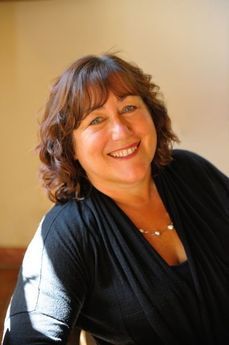 Novelist Rachel Abbott I'm delighted to welcome novelist Rachel Abbott to my blog today. The Guardian newspaper called Rachel ‘the epublishing sensation of 2012’ while The Observer stated ‘self-published authors such as Rachel Abbott are the trade’s hottest property’.
Novelist Rachel Abbott I'm delighted to welcome novelist Rachel Abbott to my blog today. The Guardian newspaper called Rachel ‘the epublishing sensation of 2012’ while The Observer stated ‘self-published authors such as Rachel Abbott are the trade’s hottest property’.
Rachel was born near Manchester, England, and spent most of her working life as the managing director of an interactive media company. After her company was sold in 2000, she fulfilled a lifelong ambition of buying and restoring a property in Italy. She now splits her time between homes in Italy and Alderney, where she writes full time and has just completed her third novel. Rachel launched her first novel 'Only the Innocent' in November 2011. The book was self-published in the UK through the Kindle Direct Publishing programme on Amazon, and reached the number 1 spot in the Kindle store just over three months later. It held its position for four weeks, and was the second highest selling self-published title in 2012.
'Only the Innocent' is now published by Thomas and Mercer in the USA, and achieved number 8 in the US charts one week after launch, before reaching number 1 in August, making Rachel’s debut a number one bestseller on both sides of the Atlantic. On 18th March 2013, Rachel Abbott released her long awaited second novel 'The Back Road', which entered the UK Kindle chart at number 100 just 48 hours after launch. It went on to reach number 2 and has over 450 five star reviews.
Let's get going with the questions!
No choice but to commit murder...
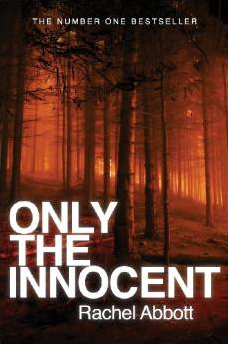 Cover of 'Only The Innocent'
Have you always wanted to write? What was the impetus for ‘Only the Innocent’?
Cover of 'Only The Innocent'
Have you always wanted to write? What was the impetus for ‘Only the Innocent’?
I have been writing in one form or another for years. I ran an interactive media company for many years, and we often produced dramas for training and education (and occasionally for entertainment), and I was involved in the scripts. They weren’t sterile training videos – each one was like a TV drama, and working on those gave me a real desire to write.
When it came to Only the Innocent, I’d had an idea in my head for years – What set of circumstances could be so bad that a woman had no choice but to murder a man? I spent years thinking about it as I drove to work – because there had to be no other option, and that’s quite hard to imagine. Then when I sold my company and had some spare time, I was delighted to find that I really enjoyed writing the story, and my writing career just went from there.
Describe a typical writing day for you. Are there any props you consider essential to the writing process, such as music?
I like silence when I write. Well – that’s not quite true. I live by a beach in the Channel Islands most of the time, and I can hear the sea washing up on the shore, which is a wonderful sound.
My props depend on the stage of writing. When I am editing, I usually end up eating a lot of biscuits – usually Jaffa Cakes – which I swear help me to concentrate.
As for the day itself, I sit down with a cup of coffee and go through all my emails first, respond to any that are absolutely essential, and flag for follow up any that will wait – principally because I want to get on with writing. I find I work best in the morning, so I write all morning, and if things are going well, all afternoon as well. If I’m stuck on a plot point and need to give it some thought, I will spend the afternoon taking care of all the other stuff – the outstanding emails, the accounts, some marketing. It all needs to be done, so I tend to go with how I’m feeling at a certain time. But writing takes priority.
Dark themes, and what makes people tick
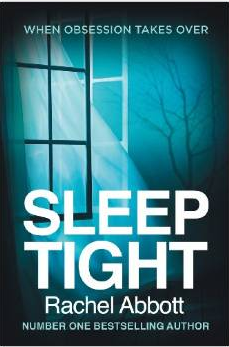 Cover of 'Sleep Tight'
Will your future novels explore different genres, or will you stick with psychological thrillers?
Cover of 'Sleep Tight'
Will your future novels explore different genres, or will you stick with psychological thrillers?
For now, I will stick to psychological thrillers. I am fascinated by what makes people tick – and that could have gone towards romance or thrillers. I think I’ve ended up with a thriller style that is about relationships, but usually the sort that have gone catastrophically wrong somewhere. But in all cases, the way in which they have deteriorated leaves my protagonist with a dilemma.
Your books, being psychological thrillers, cover dark themes. Are there any topics you wouldn’t portray in your writing, and if so, why not?
I don’t think in general that I would write about gory acts of physical violence. There may be dead bodies – there may be some elements of violence. But I don’t see myself writing about cutting open people’s stomachs and wrapping intestines around the victim’s neck. That sort of sickening violence should be reserved for those who write it considerably better than me. It’s mainly in the mind in the case of my books.
My readers decide what is right and wrong
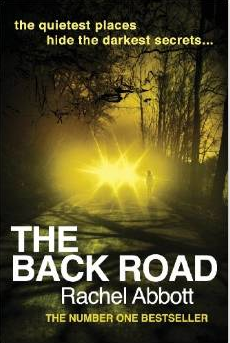 Cover of 'The Back Road'
To what extent do you believe a crime fiction writer has a duty to end their novels with good triumphing over evil?
Cover of 'The Back Road'
To what extent do you believe a crime fiction writer has a duty to end their novels with good triumphing over evil?
I don’t believe that at all. That suggests that everything is either black or white, and although it’s difficult these days to mention ‘shades of grey’ without it being misconstrued, I think that’s the reality. People do bad things. But they are not necessarily bad people. They make mistakes, get themselves deeper and deeper into trouble, and find it hard to extricate themselves. Sometimes people have to do very bad things in order to save others. One of the shout lines on one of my books is ‘how far would you go to hold on to the people you love?’ and it’s a theme that I have used more than once. In other words, sometimes people need to do some terrible things in order to protect others – and where do you draw the line? So I like to leave my readers to decide what is right and what is wrong. In both 'Only the Innocent' and 'Sleep Tight' my protagonists do things that are, without a doubt, illegal. But you can practically hear people cheering them on from the sidelines.
Italy, Alderney and DCI Tom Douglas
 Beautiful Alderney, where Rachel lives Will your future novels involve the same characters, such as DCI Tom Douglas? Any hints about intriguing characters from your next novel?
Beautiful Alderney, where Rachel lives Will your future novels involve the same characters, such as DCI Tom Douglas? Any hints about intriguing characters from your next novel?
I never intended to write a series about one policeman, but my readers fell for him, and so I’ve just carried on – and I love him more all the time. So for the moment, he’s staying with us.
In terms of intriguing characters, there are several very interesting personalities in the next novel that are outside of the norm. Once more we have people doing quite extraordinary things – either to protect themselves or to defend others. As always, the foreground is dominated by a family – in this case with an adorable baby boy called Ollie.
Will any of your future novels feature Italy, where you now have a home?
I did feature Italy a little in 'Only the Innocent'. Laura has a summer home there. I don’t spend as much time in Italy now as I do in the Channel Islands – and Alderney, my home, already features in 'Sleep Tight' so it would be difficult to repeat it. I may, however, bring Italy again at some point in the future – but it would have to be relevant to the plot. Food, recipes and music
 Onion bhajis feature in 'The Back Road'
Your website features food and recipes from your books. Is food important to you, and if so, what is your favourite type of cuisine?
Onion bhajis feature in 'The Back Road'
Your website features food and recipes from your books. Is food important to you, and if so, what is your favourite type of cuisine?
I love food and I love cooking. I keep telling myself that I should go on a diet (true) but food is one of life’s greatest pleasures. The very next thing that I am going to do after answering these questions is go and make a curry. Indian food is my favourite, but anything spicy – Thai, Malaysian, even North African. Our local Indian restaurant here in Alderney (it’s really good) have a special curry that they make for me from Bangladesh, using a certain kind of lemon that you can’t get in the UK. It’s wonderful.
Your website features music from your books. Is music important to you, and if so, what sort do you most enjoy?
I love to sing. I am a member of a small singing group that meets once a week for an hour or so, and we occasionally perform in public. We sing all kinds of things – but mainly well known popular music that people will recognise from the charts at some time or other (probably not recently, though). My taste is very varied. I particularly love 'Elbow' at the moment, but then when I wrote 'Sleep Tight' I mentioned Judie Tzuke’s music, which is haunting. Music, to me, is like writing. It has to evoke emotion. If it doesn’t, I’m not interested. My main characters share my values
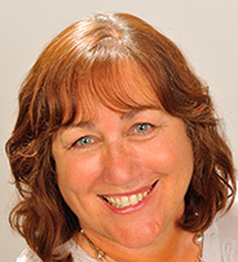 Rachel Abbott
T
o what extent do you reveal yourself in a novel – your opinions, your values?
Rachel Abbott
T
o what extent do you reveal yourself in a novel – your opinions, your values?
That’s a really good question. I think the main characters in my books share my values. The protagonist in each story (excluding Tom, of course) is usually a woman, and I think that although their personalities have been very different, they each have had a moral code that I approve of. However, I try very hard NOT to use writing to express my opinions. I used to be really, really guilty of that, and would find a way to introduce little things that bugged me into the story. My editor and/or agent would – without fail – cross them out. And quite right too. My books are not a platform for me to spout about bad manners, or irritating habits, and I would never make any political statements in my books, unless they were the opinions of the characters – but never mine. Thank you, Rachel!
Thanks to Rachel Abbott for granting me this interview! I hope my readers have enjoyed it. You can find out more about Rachel and her books via her website, www.rachel-abbott.com,her blog, on Facebook or Twitter.
Subscribe to my newsletter and blog!
 I'd love to stay in contact with you! Why not sign up for my newsletter? It's an occasional communication to keep you informed about my new novel releases. I respect your privacy and will never sell your details to any third parties. To sign up, enter your details in the form at the top of the sidebar.
I'd love to stay in contact with you! Why not sign up for my newsletter? It's an occasional communication to keep you informed about my new novel releases. I respect your privacy and will never sell your details to any third parties. To sign up, enter your details in the form at the top of the sidebar.
And if you've enjoyed this blog post, how about subscribing via RSS feed or email? Either click the links in my blog sidebar or sign up via Networked Blogs, also in the sidebar. It'll be great to have you on board!
Welcome to an e-publishing sensation!
 Novelist Rachel Abbott I'm delighted to welcome novelist Rachel Abbott to my blog today. The Guardian newspaper called Rachel ‘the epublishing sensation of 2012’ while The Observer stated ‘self-published authors such as Rachel Abbott are the trade’s hottest property’.
Novelist Rachel Abbott I'm delighted to welcome novelist Rachel Abbott to my blog today. The Guardian newspaper called Rachel ‘the epublishing sensation of 2012’ while The Observer stated ‘self-published authors such as Rachel Abbott are the trade’s hottest property’. Rachel was born near Manchester, England, and spent most of her working life as the managing director of an interactive media company. After her company was sold in 2000, she fulfilled a lifelong ambition of buying and restoring a property in Italy. She now splits her time between homes in Italy and Alderney, where she writes full time and has just completed her third novel. Rachel launched her first novel 'Only the Innocent' in November 2011. The book was self-published in the UK through the Kindle Direct Publishing programme on Amazon, and reached the number 1 spot in the Kindle store just over three months later. It held its position for four weeks, and was the second highest selling self-published title in 2012.
'Only the Innocent' is now published by Thomas and Mercer in the USA, and achieved number 8 in the US charts one week after launch, before reaching number 1 in August, making Rachel’s debut a number one bestseller on both sides of the Atlantic. On 18th March 2013, Rachel Abbott released her long awaited second novel 'The Back Road', which entered the UK Kindle chart at number 100 just 48 hours after launch. It went on to reach number 2 and has over 450 five star reviews.
Let's get going with the questions!
No choice but to commit murder...
 Cover of 'Only The Innocent'
Have you always wanted to write? What was the impetus for ‘Only the Innocent’?
Cover of 'Only The Innocent'
Have you always wanted to write? What was the impetus for ‘Only the Innocent’?
I have been writing in one form or another for years. I ran an interactive media company for many years, and we often produced dramas for training and education (and occasionally for entertainment), and I was involved in the scripts. They weren’t sterile training videos – each one was like a TV drama, and working on those gave me a real desire to write.
When it came to Only the Innocent, I’d had an idea in my head for years – What set of circumstances could be so bad that a woman had no choice but to murder a man? I spent years thinking about it as I drove to work – because there had to be no other option, and that’s quite hard to imagine. Then when I sold my company and had some spare time, I was delighted to find that I really enjoyed writing the story, and my writing career just went from there.
Describe a typical writing day for you. Are there any props you consider essential to the writing process, such as music?
I like silence when I write. Well – that’s not quite true. I live by a beach in the Channel Islands most of the time, and I can hear the sea washing up on the shore, which is a wonderful sound.
My props depend on the stage of writing. When I am editing, I usually end up eating a lot of biscuits – usually Jaffa Cakes – which I swear help me to concentrate.
As for the day itself, I sit down with a cup of coffee and go through all my emails first, respond to any that are absolutely essential, and flag for follow up any that will wait – principally because I want to get on with writing. I find I work best in the morning, so I write all morning, and if things are going well, all afternoon as well. If I’m stuck on a plot point and need to give it some thought, I will spend the afternoon taking care of all the other stuff – the outstanding emails, the accounts, some marketing. It all needs to be done, so I tend to go with how I’m feeling at a certain time. But writing takes priority.
Dark themes, and what makes people tick
 Cover of 'Sleep Tight'
Will your future novels explore different genres, or will you stick with psychological thrillers?
Cover of 'Sleep Tight'
Will your future novels explore different genres, or will you stick with psychological thrillers?
For now, I will stick to psychological thrillers. I am fascinated by what makes people tick – and that could have gone towards romance or thrillers. I think I’ve ended up with a thriller style that is about relationships, but usually the sort that have gone catastrophically wrong somewhere. But in all cases, the way in which they have deteriorated leaves my protagonist with a dilemma.
Your books, being psychological thrillers, cover dark themes. Are there any topics you wouldn’t portray in your writing, and if so, why not?
I don’t think in general that I would write about gory acts of physical violence. There may be dead bodies – there may be some elements of violence. But I don’t see myself writing about cutting open people’s stomachs and wrapping intestines around the victim’s neck. That sort of sickening violence should be reserved for those who write it considerably better than me. It’s mainly in the mind in the case of my books.
My readers decide what is right and wrong
 Cover of 'The Back Road'
To what extent do you believe a crime fiction writer has a duty to end their novels with good triumphing over evil?
Cover of 'The Back Road'
To what extent do you believe a crime fiction writer has a duty to end their novels with good triumphing over evil?I don’t believe that at all. That suggests that everything is either black or white, and although it’s difficult these days to mention ‘shades of grey’ without it being misconstrued, I think that’s the reality. People do bad things. But they are not necessarily bad people. They make mistakes, get themselves deeper and deeper into trouble, and find it hard to extricate themselves. Sometimes people have to do very bad things in order to save others. One of the shout lines on one of my books is ‘how far would you go to hold on to the people you love?’ and it’s a theme that I have used more than once. In other words, sometimes people need to do some terrible things in order to protect others – and where do you draw the line? So I like to leave my readers to decide what is right and what is wrong. In both 'Only the Innocent' and 'Sleep Tight' my protagonists do things that are, without a doubt, illegal. But you can practically hear people cheering them on from the sidelines.
Italy, Alderney and DCI Tom Douglas
 Beautiful Alderney, where Rachel lives Will your future novels involve the same characters, such as DCI Tom Douglas? Any hints about intriguing characters from your next novel?
Beautiful Alderney, where Rachel lives Will your future novels involve the same characters, such as DCI Tom Douglas? Any hints about intriguing characters from your next novel?I never intended to write a series about one policeman, but my readers fell for him, and so I’ve just carried on – and I love him more all the time. So for the moment, he’s staying with us.
In terms of intriguing characters, there are several very interesting personalities in the next novel that are outside of the norm. Once more we have people doing quite extraordinary things – either to protect themselves or to defend others. As always, the foreground is dominated by a family – in this case with an adorable baby boy called Ollie.
Will any of your future novels feature Italy, where you now have a home?
I did feature Italy a little in 'Only the Innocent'. Laura has a summer home there. I don’t spend as much time in Italy now as I do in the Channel Islands – and Alderney, my home, already features in 'Sleep Tight' so it would be difficult to repeat it. I may, however, bring Italy again at some point in the future – but it would have to be relevant to the plot. Food, recipes and music
 Onion bhajis feature in 'The Back Road'
Your website features food and recipes from your books. Is food important to you, and if so, what is your favourite type of cuisine?
Onion bhajis feature in 'The Back Road'
Your website features food and recipes from your books. Is food important to you, and if so, what is your favourite type of cuisine?
I love food and I love cooking. I keep telling myself that I should go on a diet (true) but food is one of life’s greatest pleasures. The very next thing that I am going to do after answering these questions is go and make a curry. Indian food is my favourite, but anything spicy – Thai, Malaysian, even North African. Our local Indian restaurant here in Alderney (it’s really good) have a special curry that they make for me from Bangladesh, using a certain kind of lemon that you can’t get in the UK. It’s wonderful.
Your website features music from your books. Is music important to you, and if so, what sort do you most enjoy?
I love to sing. I am a member of a small singing group that meets once a week for an hour or so, and we occasionally perform in public. We sing all kinds of things – but mainly well known popular music that people will recognise from the charts at some time or other (probably not recently, though). My taste is very varied. I particularly love 'Elbow' at the moment, but then when I wrote 'Sleep Tight' I mentioned Judie Tzuke’s music, which is haunting. Music, to me, is like writing. It has to evoke emotion. If it doesn’t, I’m not interested. My main characters share my values
 Rachel Abbott
T
o what extent do you reveal yourself in a novel – your opinions, your values?
Rachel Abbott
T
o what extent do you reveal yourself in a novel – your opinions, your values?
That’s a really good question. I think the main characters in my books share my values. The protagonist in each story (excluding Tom, of course) is usually a woman, and I think that although their personalities have been very different, they each have had a moral code that I approve of. However, I try very hard NOT to use writing to express my opinions. I used to be really, really guilty of that, and would find a way to introduce little things that bugged me into the story. My editor and/or agent would – without fail – cross them out. And quite right too. My books are not a platform for me to spout about bad manners, or irritating habits, and I would never make any political statements in my books, unless they were the opinions of the characters – but never mine. Thank you, Rachel!
Thanks to Rachel Abbott for granting me this interview! I hope my readers have enjoyed it. You can find out more about Rachel and her books via her website, www.rachel-abbott.com,her blog, on Facebook or Twitter.
Subscribe to my newsletter and blog!
 I'd love to stay in contact with you! Why not sign up for my newsletter? It's an occasional communication to keep you informed about my new novel releases. I respect your privacy and will never sell your details to any third parties. To sign up, enter your details in the form at the top of the sidebar.
I'd love to stay in contact with you! Why not sign up for my newsletter? It's an occasional communication to keep you informed about my new novel releases. I respect your privacy and will never sell your details to any third parties. To sign up, enter your details in the form at the top of the sidebar.And if you've enjoyed this blog post, how about subscribing via RSS feed or email? Either click the links in my blog sidebar or sign up via Networked Blogs, also in the sidebar. It'll be great to have you on board!
Published on August 20, 2014 06:29
August 14, 2014
Book Review - 'Lisey's Story' by Stephen King
By Maggie James
Three stories woven into one
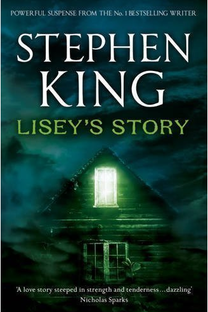 Cover of UK edition Nobody tells a story quite like Stephen King, who has rated 'Lisey's Story' (2006) his favourite novel that he's written. Before I discovered it on the library shelves, however, I'd not heard of it. No-one has yet made it into a film, and it doesn't seem as well known as other King novels such as 'Carrie', 'The Shining', etc. The novel delivers a powerful and engaging read, however, and is a typical Stephen King page-turner (all 664 of them - it's a long novel!)
Cover of UK edition Nobody tells a story quite like Stephen King, who has rated 'Lisey's Story' (2006) his favourite novel that he's written. Before I discovered it on the library shelves, however, I'd not heard of it. No-one has yet made it into a film, and it doesn't seem as well known as other King novels such as 'Carrie', 'The Shining', etc. The novel delivers a powerful and engaging read, however, and is a typical Stephen King page-turner (all 664 of them - it's a long novel!)
The plot involves three stories. One is that of Lisey herself, told in the present, interwoven with a second one, revealing her dead husband's life, as recalled by her. The third story is the one from the title, written by Scott for his wife. More about that later.
Here's a brief plot summary. Lisey Landon has been widowed for two years, following the sudden death of her husband, hugely successful Maine novelist Scott Landon. Although a devoted husband, Scott was a troubled man during his life, emotionally wrecked by his childhood and prone to drinking bouts. Despite the passing of time, Lisey is still unable to deal with his loss, as evidenced by her inability to clear out his study. Then an insane fan of Scott's begins to stalk her, demanding she hand over her dead husband's papers; in order to survive, Lisey has to follow the trail of clues left by her husband, who assists her in spirit form. Through Scott and Lisey we explore the fantastical world known as Boo'ya Moon, where Scott retreats during times of mental crisis. Boo'ya Moon is a magical realm of warmth, filled with hazy red light, birdsong and the scent of tropical flowers. Dangers lurk amongst the lush vegetation and bright colours, however. Monsters such as Scott's nemesis, the terrible piebald creature he dubs his 'long boy'. This 'long boy' appears to represent total insanity, something desperately feared by Scott, given his family history of mental illness. Despite its perils, however, it is Boo'ya Moon that eventually provides solutions to Lisey, in respect of her insane stalker and her grief over her husband's death.
A novel of contrasts and dualities
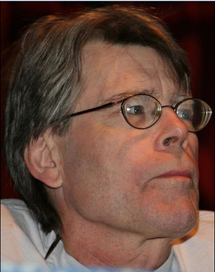 Author Stephen King For me, the novel is one laden with dualities. The plot portrays many contrasts; good and evil, dark and light, night and day, safe and dangerous, madness and sanity. As for night and day, the difference between them plays an important role in Scott and Lisey's visits to Boo'ya Moon, a place that's safe during daylight hours, but in which unspeakable terrors lurk in the Fairy Forest at night. King stresses that Boo'ya Moon is not a place in which to linger too long; its beauty can be seductive and once enticed into its magic, its guests may lose all desire to leave, despite its perils. Another duality illustrated here; that of danger and safety.
Author Stephen King For me, the novel is one laden with dualities. The plot portrays many contrasts; good and evil, dark and light, night and day, safe and dangerous, madness and sanity. As for night and day, the difference between them plays an important role in Scott and Lisey's visits to Boo'ya Moon, a place that's safe during daylight hours, but in which unspeakable terrors lurk in the Fairy Forest at night. King stresses that Boo'ya Moon is not a place in which to linger too long; its beauty can be seductive and once enticed into its magic, its guests may lose all desire to leave, despite its perils. Another duality illustrated here; that of danger and safety.
Good and evil are demonstrated in Sparky Landon, Scott's father, a man tormented by what Scott terms 'bad-gunky', yet who, in his lucid moments, loves his two sons and endeavours to protect them during their childhood from the rampant family insanity. He doesn't entirely succeed; nobody could endure what Scott did and emerge mentally unscathed. Scott Landon comes from a family blighted by mental illness, which manifests itself as either the 'bad-gunky' of homicidal mania (Scott's brother and father) or as catatonia (Scott himself). Although a loving husband, the man is a dark, haunted individual in comparison with Lisey, who exudes strength and stability. Normally loquacious, Scott suffers bouts of catatonia, as does Lisey's sister, Amanda. The theme of family presents another duality, with Lisey's chaotic yet loving childhood, mostly female, a contrast to Scott's male-dominated and terror-filled one.
What does it mean to be a novelist?
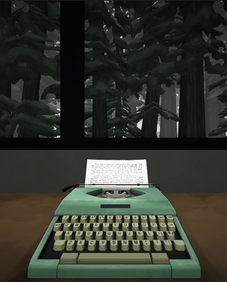 'Lisey's' Story as metafiction Let's turn now to another theme that's prevalent in the novel. 'Lisey's Story' is partly an examination of the craft of writing and what it means to be a author. King achieves some of this on a very practical level. Through Lisey and the descriptions of Scott's life, we get to see how a successful novelist works his craft, from the way his study is set up to the descriptions of his public speaking events.
'Lisey's' Story as metafiction Let's turn now to another theme that's prevalent in the novel. 'Lisey's Story' is partly an examination of the craft of writing and what it means to be a author. King achieves some of this on a very practical level. Through Lisey and the descriptions of Scott's life, we get to see how a successful novelist works his craft, from the way his study is set up to the descriptions of his public speaking events.
On a different level, King also offers one possible answer to the question all novelists get asked - 'where do you get your ideas from?' Scott Landon compares the mythical pool in Boo'ya Moon to a 'word pool' and credits it as the source of his creativity. Interesting, as the pool also has magical healing qualities. Does King mean that writing can be cathartic, a balm to minds in crisis? Possibly.
Then there's Boo'ya Moon itself. I interpret this magical realm as representing Scott's mental illness, or to be specific, the state of catatonia. Scott and Amanda are both catatonics who flee to Boo'ya Moon during mental breakdowns; both find peace and healing in this magical world. Is King saying that the source of creativity lies in madness? Or in a retreat from the realities of everyday life? Perhaps. Writing can spring from madness, but it can also present a catharsis for insanity. Another interesting duality! Is the title of 'Lisey's Story' a misnomer?
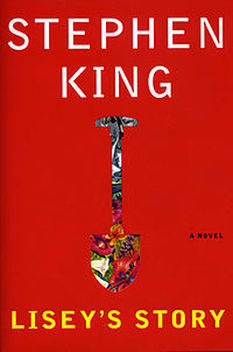 Cover of first edition A minor quibble now. For me, the title of the novel is something of a misnomer. The novel is far more concerned about Scott Landon's life rather than Lisey's; she plays a supporting role in her own story. Although we are given details of Lisey's life, throughout the book we discover much more about her husband's. Even when we finally read the story that Scott wrote for Lisey and hid for her in Boo'ya Moon, the 'Lisey's Story' of the title, we learn far more about him than we do his wife, as the missing pieces of his life slot into place.
Cover of first edition A minor quibble now. For me, the title of the novel is something of a misnomer. The novel is far more concerned about Scott Landon's life rather than Lisey's; she plays a supporting role in her own story. Although we are given details of Lisey's life, throughout the book we discover much more about her husband's. Even when we finally read the story that Scott wrote for Lisey and hid for her in Boo'ya Moon, the 'Lisey's Story' of the title, we learn far more about him than we do his wife, as the missing pieces of his life slot into place.
That aside, 'Lisey's Story' is a terrific fairground ride of a novel, told as only Stephen King can. Like many King offerings, it's densely plotted and, although long, it's never dull. From the stunning descriptions of Boo'ya Moon to those of Scott and Lisey's marriage, through the sub-plots of Amanda's mental illness and Lisey's stalking by the insane Jim Dooley, King sweeps us along in a epic story that enchants and intrigues. I heartily recommend this book.
Have you read 'Lisey's Story'?
Did you love it or loathe it? What elements did you enjoy and why? Leave me a comment and let me know.
I hope you enjoyed this blog post. If so, please read on! Subscribe to my newsletter and blog!
 I'd love to stay in contact with you! Why not sign up for my newsletter? It's an occasional communication to keep you informed about my new novel releases. I respect your privacy and will never sell your details to any third parties. To sign up, enter your details in the form at the top of the sidebar.
I'd love to stay in contact with you! Why not sign up for my newsletter? It's an occasional communication to keep you informed about my new novel releases. I respect your privacy and will never sell your details to any third parties. To sign up, enter your details in the form at the top of the sidebar.
And if you've enjoyed this blog post, how about subscribing via RSS feed or email? Either click the links in my blog sidebar or sign up via Networked Blogs, also in the sidebar. It'll be great to have you on board!
Three stories woven into one
 Cover of UK edition Nobody tells a story quite like Stephen King, who has rated 'Lisey's Story' (2006) his favourite novel that he's written. Before I discovered it on the library shelves, however, I'd not heard of it. No-one has yet made it into a film, and it doesn't seem as well known as other King novels such as 'Carrie', 'The Shining', etc. The novel delivers a powerful and engaging read, however, and is a typical Stephen King page-turner (all 664 of them - it's a long novel!)
Cover of UK edition Nobody tells a story quite like Stephen King, who has rated 'Lisey's Story' (2006) his favourite novel that he's written. Before I discovered it on the library shelves, however, I'd not heard of it. No-one has yet made it into a film, and it doesn't seem as well known as other King novels such as 'Carrie', 'The Shining', etc. The novel delivers a powerful and engaging read, however, and is a typical Stephen King page-turner (all 664 of them - it's a long novel!) The plot involves three stories. One is that of Lisey herself, told in the present, interwoven with a second one, revealing her dead husband's life, as recalled by her. The third story is the one from the title, written by Scott for his wife. More about that later.
Here's a brief plot summary. Lisey Landon has been widowed for two years, following the sudden death of her husband, hugely successful Maine novelist Scott Landon. Although a devoted husband, Scott was a troubled man during his life, emotionally wrecked by his childhood and prone to drinking bouts. Despite the passing of time, Lisey is still unable to deal with his loss, as evidenced by her inability to clear out his study. Then an insane fan of Scott's begins to stalk her, demanding she hand over her dead husband's papers; in order to survive, Lisey has to follow the trail of clues left by her husband, who assists her in spirit form. Through Scott and Lisey we explore the fantastical world known as Boo'ya Moon, where Scott retreats during times of mental crisis. Boo'ya Moon is a magical realm of warmth, filled with hazy red light, birdsong and the scent of tropical flowers. Dangers lurk amongst the lush vegetation and bright colours, however. Monsters such as Scott's nemesis, the terrible piebald creature he dubs his 'long boy'. This 'long boy' appears to represent total insanity, something desperately feared by Scott, given his family history of mental illness. Despite its perils, however, it is Boo'ya Moon that eventually provides solutions to Lisey, in respect of her insane stalker and her grief over her husband's death.
A novel of contrasts and dualities
 Author Stephen King For me, the novel is one laden with dualities. The plot portrays many contrasts; good and evil, dark and light, night and day, safe and dangerous, madness and sanity. As for night and day, the difference between them plays an important role in Scott and Lisey's visits to Boo'ya Moon, a place that's safe during daylight hours, but in which unspeakable terrors lurk in the Fairy Forest at night. King stresses that Boo'ya Moon is not a place in which to linger too long; its beauty can be seductive and once enticed into its magic, its guests may lose all desire to leave, despite its perils. Another duality illustrated here; that of danger and safety.
Author Stephen King For me, the novel is one laden with dualities. The plot portrays many contrasts; good and evil, dark and light, night and day, safe and dangerous, madness and sanity. As for night and day, the difference between them plays an important role in Scott and Lisey's visits to Boo'ya Moon, a place that's safe during daylight hours, but in which unspeakable terrors lurk in the Fairy Forest at night. King stresses that Boo'ya Moon is not a place in which to linger too long; its beauty can be seductive and once enticed into its magic, its guests may lose all desire to leave, despite its perils. Another duality illustrated here; that of danger and safety. Good and evil are demonstrated in Sparky Landon, Scott's father, a man tormented by what Scott terms 'bad-gunky', yet who, in his lucid moments, loves his two sons and endeavours to protect them during their childhood from the rampant family insanity. He doesn't entirely succeed; nobody could endure what Scott did and emerge mentally unscathed. Scott Landon comes from a family blighted by mental illness, which manifests itself as either the 'bad-gunky' of homicidal mania (Scott's brother and father) or as catatonia (Scott himself). Although a loving husband, the man is a dark, haunted individual in comparison with Lisey, who exudes strength and stability. Normally loquacious, Scott suffers bouts of catatonia, as does Lisey's sister, Amanda. The theme of family presents another duality, with Lisey's chaotic yet loving childhood, mostly female, a contrast to Scott's male-dominated and terror-filled one.
What does it mean to be a novelist?
 'Lisey's' Story as metafiction Let's turn now to another theme that's prevalent in the novel. 'Lisey's Story' is partly an examination of the craft of writing and what it means to be a author. King achieves some of this on a very practical level. Through Lisey and the descriptions of Scott's life, we get to see how a successful novelist works his craft, from the way his study is set up to the descriptions of his public speaking events.
'Lisey's' Story as metafiction Let's turn now to another theme that's prevalent in the novel. 'Lisey's Story' is partly an examination of the craft of writing and what it means to be a author. King achieves some of this on a very practical level. Through Lisey and the descriptions of Scott's life, we get to see how a successful novelist works his craft, from the way his study is set up to the descriptions of his public speaking events.On a different level, King also offers one possible answer to the question all novelists get asked - 'where do you get your ideas from?' Scott Landon compares the mythical pool in Boo'ya Moon to a 'word pool' and credits it as the source of his creativity. Interesting, as the pool also has magical healing qualities. Does King mean that writing can be cathartic, a balm to minds in crisis? Possibly.
Then there's Boo'ya Moon itself. I interpret this magical realm as representing Scott's mental illness, or to be specific, the state of catatonia. Scott and Amanda are both catatonics who flee to Boo'ya Moon during mental breakdowns; both find peace and healing in this magical world. Is King saying that the source of creativity lies in madness? Or in a retreat from the realities of everyday life? Perhaps. Writing can spring from madness, but it can also present a catharsis for insanity. Another interesting duality! Is the title of 'Lisey's Story' a misnomer?
 Cover of first edition A minor quibble now. For me, the title of the novel is something of a misnomer. The novel is far more concerned about Scott Landon's life rather than Lisey's; she plays a supporting role in her own story. Although we are given details of Lisey's life, throughout the book we discover much more about her husband's. Even when we finally read the story that Scott wrote for Lisey and hid for her in Boo'ya Moon, the 'Lisey's Story' of the title, we learn far more about him than we do his wife, as the missing pieces of his life slot into place.
Cover of first edition A minor quibble now. For me, the title of the novel is something of a misnomer. The novel is far more concerned about Scott Landon's life rather than Lisey's; she plays a supporting role in her own story. Although we are given details of Lisey's life, throughout the book we discover much more about her husband's. Even when we finally read the story that Scott wrote for Lisey and hid for her in Boo'ya Moon, the 'Lisey's Story' of the title, we learn far more about him than we do his wife, as the missing pieces of his life slot into place.That aside, 'Lisey's Story' is a terrific fairground ride of a novel, told as only Stephen King can. Like many King offerings, it's densely plotted and, although long, it's never dull. From the stunning descriptions of Boo'ya Moon to those of Scott and Lisey's marriage, through the sub-plots of Amanda's mental illness and Lisey's stalking by the insane Jim Dooley, King sweeps us along in a epic story that enchants and intrigues. I heartily recommend this book.
Have you read 'Lisey's Story'?
Did you love it or loathe it? What elements did you enjoy and why? Leave me a comment and let me know.
I hope you enjoyed this blog post. If so, please read on! Subscribe to my newsletter and blog!
 I'd love to stay in contact with you! Why not sign up for my newsletter? It's an occasional communication to keep you informed about my new novel releases. I respect your privacy and will never sell your details to any third parties. To sign up, enter your details in the form at the top of the sidebar.
I'd love to stay in contact with you! Why not sign up for my newsletter? It's an occasional communication to keep you informed about my new novel releases. I respect your privacy and will never sell your details to any third parties. To sign up, enter your details in the form at the top of the sidebar.And if you've enjoyed this blog post, how about subscribing via RSS feed or email? Either click the links in my blog sidebar or sign up via Networked Blogs, also in the sidebar. It'll be great to have you on board!
Published on August 14, 2014 00:52
August 6, 2014
Digital or Physical Books - Which Do You Prefer?
By Maggie James
For some, there's nothing like a real book
 Ah, the pleasures of reading... 'I get how convenient e-books are,' a friend told me recently. 'But there's nothing quite like snuggling up with a real book, is there?'
Ah, the pleasures of reading... 'I get how convenient e-books are,' a friend told me recently. 'But there's nothing quite like snuggling up with a real book, is there?'
She's not alone. SInce I started publishing novels, I've lost count of the number of people who have told me they prefer to hold an actual book in their hands as opposed to a tablet or e-reader.
Personally, I'm happy to use both. I have a Nook as my chosen e-reader device, which enables me to read e-books in a wide variety of formats once I've converted them via calibre. I love my Nook, but I also read hardbacks and paperbacks borrowed from my local library. I believe our free book borrowing system is amazing, so I'm keen to support it, and there's also an ever-growing range of e-books available from them as well.
The rise of the e-book
 Graph courtesy of Amazon Although Amazon chose not to reveal actual figures, that near-vertical orange line shows that Kindle books are selling at a phenomenal rate. Bear in mind that the graph is from Amazon, so it doesn't take into account competitors' e-book sales, such as ones from Apple, Kobo, Google Play, etc. With those factored in, the dominance of e-books over print has to be even more startling.
Graph courtesy of Amazon Although Amazon chose not to reveal actual figures, that near-vertical orange line shows that Kindle books are selling at a phenomenal rate. Bear in mind that the graph is from Amazon, so it doesn't take into account competitors' e-book sales, such as ones from Apple, Kobo, Google Play, etc. With those factored in, the dominance of e-books over print has to be even more startling.
E-book purchases in the UK rose by a massive 20% in 2013, with self-published titles accounting for one in five sales. Readers spent £300m on 80 million e-books in 2013. (Source: Neilsen). In the USA, e-book sales are reaching new heights as 50% of Americans say they own an e-reader or tablet. 28% read at least one e-book in 2013, a rise of 23% from the previous year, according to a new survey of more than 1,000 adults from the Pew Research Centre. However, the study showed the percentage of people who read print books increased as well, with 69% reading at least one print book, a rise of 4% from the previous year.
E-books, defend your corner!
 Amazon's Kindle e-reader device So why are e-books so popular? Let's look at the advantages.
Amazon's Kindle e-reader device So why are e-books so popular? Let's look at the advantages.
1. Immediate gratification. In a world where change is occurring at an increasingly fast pace, e-books provide near-instant enjoyment. With Amazon's 'one click' facility, it's a matter of seconds to get the latest blockbuster on your Kindle.
2. Portability. E-readers and tablets can hold thousands of books, great for travelling. It takes seconds to add or delete books, and it's a doddle to move them between devices.
3. E-readers are customisable. Need to read in a larger font? Simple. Like to make notes you can erase later? Easy-peasy. Want to read in bed at night but your partner is asleep beside you? No problem - simply activate the built-in light on your Kindle or Nook.
4. Price. The price of most full-length novels on Amazon UK is around the £3 mark. Paperback novels tend to retail at £8 or £9. E-books have made reading far cheaper and often free.
Let's hear it for physical books!
 Aren't books beautiful? It's reassuring to note that whilst the graph shows Kindle book sales outstripping physical ones, there's still a gratifying rise in the sales of actual books as well. So what makes so many people love snuggling up with a physical version of their chosen read?
Aren't books beautiful? It's reassuring to note that whilst the graph shows Kindle book sales outstripping physical ones, there's still a gratifying rise in the sales of actual books as well. So what makes so many people love snuggling up with a physical version of their chosen read?
1. Ah, the pleasure of a brand-new book! Many people give this as a reason for preferring paperbacks and hardbacks to e-books. There's something incredibly sensual about holding a new book purchase, smelling its pages and feeling the smoothness of the cover beneath one's fingers. How can an electronic version compete? Straight answer - it can't. Set beside their physical counterparts, e-books appear somewhat homely at best. And doesn't a well-stocked bookcase add something wonderful to a room?
2. Whilst textbooks are becoming increasingly digital, there are some books that undoubtedly do better in physical format. Cookery books, for one, with their glossy pages full of photos of wonderful culinary delights, look much better in a physical format. So do the types of books destined for life on the coffee table - exotic travel tomes, photographic books and the like - against which digital versions can't as yet compare.
3. For me, it's easier to flip backwards and forwards in a physical book. I can skim through the pages of one really quickly with my fingers. Not so with an e-book using the content/search facilities on my Nook. And I can't speak for the Kindle, but Nook doesn't always remember where I've finished reading, which can be annoying. No such problem with using an old-fashioned bookmark - although, of course, they can always fall out!
4. Finally, plenty of people are technophobes. I'm not, but I do know a few! They're simply not comfortable with using electronic devices for reading.
What's your preference? E-book or actual?
 So what's your stance on the e-book versus actual book debate? Are you one of the many people who savour the feel and smell of a real book in their hands, something which will grace their bookshelves and hallmark them as a bookworm? Or do you love the convenience and cheapness of e-books, loading your e-reader or tablet up with the latest bargains as they hit the digital shelves? Maybe you're like me, mixing the tangible with the digital as it suits. Leave a comment and let me know!
So what's your stance on the e-book versus actual book debate? Are you one of the many people who savour the feel and smell of a real book in their hands, something which will grace their bookshelves and hallmark them as a bookworm? Or do you love the convenience and cheapness of e-books, loading your e-reader or tablet up with the latest bargains as they hit the digital shelves? Maybe you're like me, mixing the tangible with the digital as it suits. Leave a comment and let me know!
Subscribe to my newsletter and blog!
 I'd love to stay in contact with you! Why not sign up for my newsletter? It's an occasional communication to keep you informed about my new novel releases. I respect your privacy and will never sell your details to any third parties. To sign up, enter your details in the form at the top of the sidebar.
I'd love to stay in contact with you! Why not sign up for my newsletter? It's an occasional communication to keep you informed about my new novel releases. I respect your privacy and will never sell your details to any third parties. To sign up, enter your details in the form at the top of the sidebar.
And if you've enjoyed this blog post, how about subscribing via RSS feed or email? Either click the links in my blog sidebar or sign up via Networked Blogs, also in the sidebar. It'll be great to have you on board!
For some, there's nothing like a real book
 Ah, the pleasures of reading... 'I get how convenient e-books are,' a friend told me recently. 'But there's nothing quite like snuggling up with a real book, is there?'
Ah, the pleasures of reading... 'I get how convenient e-books are,' a friend told me recently. 'But there's nothing quite like snuggling up with a real book, is there?'She's not alone. SInce I started publishing novels, I've lost count of the number of people who have told me they prefer to hold an actual book in their hands as opposed to a tablet or e-reader.
Personally, I'm happy to use both. I have a Nook as my chosen e-reader device, which enables me to read e-books in a wide variety of formats once I've converted them via calibre. I love my Nook, but I also read hardbacks and paperbacks borrowed from my local library. I believe our free book borrowing system is amazing, so I'm keen to support it, and there's also an ever-growing range of e-books available from them as well.
The rise of the e-book
 Graph courtesy of Amazon Although Amazon chose not to reveal actual figures, that near-vertical orange line shows that Kindle books are selling at a phenomenal rate. Bear in mind that the graph is from Amazon, so it doesn't take into account competitors' e-book sales, such as ones from Apple, Kobo, Google Play, etc. With those factored in, the dominance of e-books over print has to be even more startling.
Graph courtesy of Amazon Although Amazon chose not to reveal actual figures, that near-vertical orange line shows that Kindle books are selling at a phenomenal rate. Bear in mind that the graph is from Amazon, so it doesn't take into account competitors' e-book sales, such as ones from Apple, Kobo, Google Play, etc. With those factored in, the dominance of e-books over print has to be even more startling.E-book purchases in the UK rose by a massive 20% in 2013, with self-published titles accounting for one in five sales. Readers spent £300m on 80 million e-books in 2013. (Source: Neilsen). In the USA, e-book sales are reaching new heights as 50% of Americans say they own an e-reader or tablet. 28% read at least one e-book in 2013, a rise of 23% from the previous year, according to a new survey of more than 1,000 adults from the Pew Research Centre. However, the study showed the percentage of people who read print books increased as well, with 69% reading at least one print book, a rise of 4% from the previous year.
E-books, defend your corner!
 Amazon's Kindle e-reader device So why are e-books so popular? Let's look at the advantages.
Amazon's Kindle e-reader device So why are e-books so popular? Let's look at the advantages.1. Immediate gratification. In a world where change is occurring at an increasingly fast pace, e-books provide near-instant enjoyment. With Amazon's 'one click' facility, it's a matter of seconds to get the latest blockbuster on your Kindle.
2. Portability. E-readers and tablets can hold thousands of books, great for travelling. It takes seconds to add or delete books, and it's a doddle to move them between devices.
3. E-readers are customisable. Need to read in a larger font? Simple. Like to make notes you can erase later? Easy-peasy. Want to read in bed at night but your partner is asleep beside you? No problem - simply activate the built-in light on your Kindle or Nook.
4. Price. The price of most full-length novels on Amazon UK is around the £3 mark. Paperback novels tend to retail at £8 or £9. E-books have made reading far cheaper and often free.
Let's hear it for physical books!
 Aren't books beautiful? It's reassuring to note that whilst the graph shows Kindle book sales outstripping physical ones, there's still a gratifying rise in the sales of actual books as well. So what makes so many people love snuggling up with a physical version of their chosen read?
Aren't books beautiful? It's reassuring to note that whilst the graph shows Kindle book sales outstripping physical ones, there's still a gratifying rise in the sales of actual books as well. So what makes so many people love snuggling up with a physical version of their chosen read?1. Ah, the pleasure of a brand-new book! Many people give this as a reason for preferring paperbacks and hardbacks to e-books. There's something incredibly sensual about holding a new book purchase, smelling its pages and feeling the smoothness of the cover beneath one's fingers. How can an electronic version compete? Straight answer - it can't. Set beside their physical counterparts, e-books appear somewhat homely at best. And doesn't a well-stocked bookcase add something wonderful to a room?
2. Whilst textbooks are becoming increasingly digital, there are some books that undoubtedly do better in physical format. Cookery books, for one, with their glossy pages full of photos of wonderful culinary delights, look much better in a physical format. So do the types of books destined for life on the coffee table - exotic travel tomes, photographic books and the like - against which digital versions can't as yet compare.
3. For me, it's easier to flip backwards and forwards in a physical book. I can skim through the pages of one really quickly with my fingers. Not so with an e-book using the content/search facilities on my Nook. And I can't speak for the Kindle, but Nook doesn't always remember where I've finished reading, which can be annoying. No such problem with using an old-fashioned bookmark - although, of course, they can always fall out!
4. Finally, plenty of people are technophobes. I'm not, but I do know a few! They're simply not comfortable with using electronic devices for reading.
What's your preference? E-book or actual?
 So what's your stance on the e-book versus actual book debate? Are you one of the many people who savour the feel and smell of a real book in their hands, something which will grace their bookshelves and hallmark them as a bookworm? Or do you love the convenience and cheapness of e-books, loading your e-reader or tablet up with the latest bargains as they hit the digital shelves? Maybe you're like me, mixing the tangible with the digital as it suits. Leave a comment and let me know!
So what's your stance on the e-book versus actual book debate? Are you one of the many people who savour the feel and smell of a real book in their hands, something which will grace their bookshelves and hallmark them as a bookworm? Or do you love the convenience and cheapness of e-books, loading your e-reader or tablet up with the latest bargains as they hit the digital shelves? Maybe you're like me, mixing the tangible with the digital as it suits. Leave a comment and let me know!Subscribe to my newsletter and blog!
 I'd love to stay in contact with you! Why not sign up for my newsletter? It's an occasional communication to keep you informed about my new novel releases. I respect your privacy and will never sell your details to any third parties. To sign up, enter your details in the form at the top of the sidebar.
I'd love to stay in contact with you! Why not sign up for my newsletter? It's an occasional communication to keep you informed about my new novel releases. I respect your privacy and will never sell your details to any third parties. To sign up, enter your details in the form at the top of the sidebar.And if you've enjoyed this blog post, how about subscribing via RSS feed or email? Either click the links in my blog sidebar or sign up via Networked Blogs, also in the sidebar. It'll be great to have you on board!
Published on August 06, 2014 02:07
July 29, 2014
Five Unusual Fictional Murder Methods
By Maggie James
Warning - plot spoilers!
Warning - by its nature, this blog post contains plot spoilers! It's impossible for me to reveal how these five novelists created their fictional murders without giving away essential elements of the plot. If you're OK with that, then read on... An incredible (and edible!) murder weapon
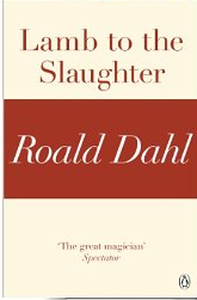 As part of my 'Five' series, in today's post I'll examine five unusual fictional murder methods. Crime writers often endeavour to come up with ever more creative ways to murder their characters, despite the fact that more orthodox methods such as guns and knives tend to be more convincing. Most people have heard of 'death by icicle' in both books and movies, and I'll share an example later.
As part of my 'Five' series, in today's post I'll examine five unusual fictional murder methods. Crime writers often endeavour to come up with ever more creative ways to murder their characters, despite the fact that more orthodox methods such as guns and knives tend to be more convincing. Most people have heard of 'death by icicle' in both books and movies, and I'll share an example later.
One of the most famous murder methods employed by fictional writers is the one used by Roald Dahl in his short story 'Lamb to the Slaughter'. The story tells of a wife who, after learning that her husband plans to leave her, decides to kill him. She bludgeons him with a frozen leg of lamb, then cooks the meat and serves it to the police officers who investigate her husband's death. Ingenious, huh? What a great way to dispose of a murder weapon! And yet another twist on the theme of death by ice.
'Lamb to the Slaughter' is a wonderful short story, but novels are more my thing. So let's examine five examples in which the authors have given their characters ingenious methods for carrying out their murderous intentions. We'll start with P.M. Carlson's 'Murder in the Dog Days'.
1 - 'Murder in the Dog Days' - P.M. Carlson
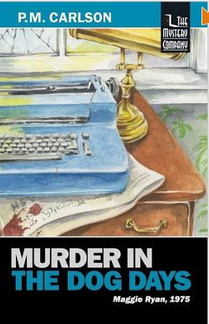 'Murder in the Dog Days' by P. M. Carlson (1990) is a great example of what's known as 'the locked room mystery'. In a story of this genre, a crime, usually murder, is committed in circumstances that appear inexplicable. As the name suggests, a locked room is involved, one in which the murderer apparently could neither have entered nor left.
'Murder in the Dog Days' by P. M. Carlson (1990) is a great example of what's known as 'the locked room mystery'. In a story of this genre, a crime, usually murder, is committed in circumstances that appear inexplicable. As the name suggests, a locked room is involved, one in which the murderer apparently could neither have entered nor left.
Here's a brief plot synopsis of Carlson's novel. On a sweltering summer day, (the temperature is highly significant) reporter Olivia Kerr and her husband Jerry invite Olivia's colleague Dale Colby to the beach. At the last minute, Dale decides to remain behind, and his dead body is discovered later on in his locked office.
Already an ill man, Dale dies as a result of heatstroke when the temperature of his study reaches an intolerable level. His killer contrives the murder by manipulating the heat in the office via a thermostat, raising it during the day and then readjusting it before the body is discovered. As the office door is bolted on the inside, the crime scene appears to be a perfect locked room murder.
2 - 'Busman's Honeymoon' - Dorothy Sayers
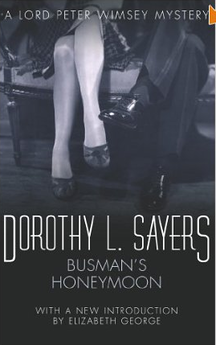 'Busman's Honeymoon' (1937) is one of Dorothy Sayers's novels involving Lord Peter Wimsey. Wimsey is on honeymoon with his new wife, Harriet, at Talboys, an old farmhouse that Wimsey has bought for her. On the morning after their arrival, they discover the former owner, Noakes, dead in the cellar with head injuries. The house was locked and bolted when the newly-weds arrived, and medical evidence seems to rule out an accident, so it appears he was attacked in the house and died later, having somehow locked up after his attacker. Another locked room - or, for the pedantic, locked house - murder!
'Busman's Honeymoon' (1937) is one of Dorothy Sayers's novels involving Lord Peter Wimsey. Wimsey is on honeymoon with his new wife, Harriet, at Talboys, an old farmhouse that Wimsey has bought for her. On the morning after their arrival, they discover the former owner, Noakes, dead in the cellar with head injuries. The house was locked and bolted when the newly-weds arrived, and medical evidence seems to rule out an accident, so it appears he was attacked in the house and died later, having somehow locked up after his attacker. Another locked room - or, for the pedantic, locked house - murder!
By all acounts, Noakes was a thoroughly dislikable man, and as the police investigation continues, a number of people emerge as suspects. The killer turns out to be Crutchley, a local garage mechanic who also worked as Noakes's gardener. He planned to marry Noakes's niece and get his hands on the money she would inherit in her uncle's will. The ingenious method Crutchley used involved setting a booby trap with a weighted plant pot on a chain, triggered by Noakes opening the radio cabinet after locking up for the night.
3 - 'The Religious Body' - Catherine Aird
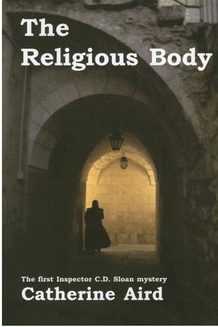 An interesting concept - convents aren't normally places one associates with violent murder. In 'The Religious Body', published in 1966, Inspector C.D Sloan has the task of solving the death of Sister Anne, who has been murdered, stashed in a broom closet, and then thrown down a flight of stairs into the cellar. A most unholy happening!
An interesting concept - convents aren't normally places one associates with violent murder. In 'The Religious Body', published in 1966, Inspector C.D Sloan has the task of solving the death of Sister Anne, who has been murdered, stashed in a broom closet, and then thrown down a flight of stairs into the cellar. A most unholy happening!
But how was Sister Anne killed? There is no apparent murder weapon to explain the blunt force trauma wounds inflicted before her tumble down the cellar steps. The answer is intriguing and, as the saying goes, hidden in plain sight. Catherine Aird's fictional murderer kills Sister Anne by delivering the fatal blows with one of the newel posts of a staircase. This unusual weapon is rendered more deadly by the heavy wooden ball atop its shaft. After the murder, the post is returned to its original position, to remain right under Inspector Sloan's nose as he investigates the death.
4 - 'A Big Boy Did It and Ran Away' - Christopher Brookmyre
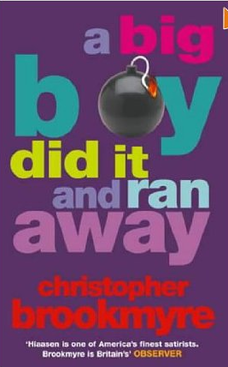 Christopher Brookmyre introduces not one but two ingenious murder methods in his novel 'A Big Boy Did It and Ran Away' (2001). As a student, the novel's character Simon Darcourt swaps dreams with his friend Ray Ash about the two of them becoming future rock stars. Fifteen years later, older and soured by life, they're struggling with the disappointments that have come their way. Whilst Ray seeks refuge from his parental responsibilities in online games, Simon chooses a much darker coping mechanism. For him, relief comes through serial killing, mass slaughter and professional assassination.
Christopher Brookmyre introduces not one but two ingenious murder methods in his novel 'A Big Boy Did It and Ran Away' (2001). As a student, the novel's character Simon Darcourt swaps dreams with his friend Ray Ash about the two of them becoming future rock stars. Fifteen years later, older and soured by life, they're struggling with the disappointments that have come their way. Whilst Ray seeks refuge from his parental responsibilities in online games, Simon chooses a much darker coping mechanism. For him, relief comes through serial killing, mass slaughter and professional assassination.
Simon's first murder in the novel is with a mercury-laden icicle, which melts away before the body is discovered. This fictional murder device, sometimes transmuted into an ice bullet, has been used many times, starting with Anna Katharine Green's novel 'Initials Only' (1911), in which a young woman is killed by an icicle shot from a pistol.
Simon's second murder is that of a drug dealer. Darcourt mixes a lethal amount of heroin into a takeaway curry and knocks on the man's door, claiming the food is a pre-paid order from that address. Too greedy to resist, the dealer dies, makes it appear as though his death was from the drugs he supplied. A great example of an unhealthy appetite!
5 - 'Matricide at St Martha's' - Ruth Dudley Edwards
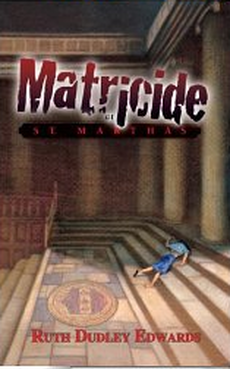 Perhaps the most contrived murder we'll examine today occurs in Ruth Dudley Edwards's 1995 novel 'Matricide at St Martha's'. St. Martha’s College, Cambridge, has been operating on a shoestring for decades, before being left a huge sum of money in a former student's will. The result? Large-scale infighting amongst the various college factions. Before long, one of these, the Virgins, led by Dame Maud Theodosia Buckbarrow, is taking the lead, its members believing the money should be spent on scholarships. Then Dame Maud is murdered...
Perhaps the most contrived murder we'll examine today occurs in Ruth Dudley Edwards's 1995 novel 'Matricide at St Martha's'. St. Martha’s College, Cambridge, has been operating on a shoestring for decades, before being left a huge sum of money in a former student's will. The result? Large-scale infighting amongst the various college factions. Before long, one of these, the Virgins, led by Dame Maud Theodosia Buckbarrow, is taking the lead, its members believing the money should be spent on scholarships. Then Dame Maud is murdered...
So how is this dastardly deed accomplished? Well, our victim climbs a ladder in the college library, the ladder being one of those that slide across the front of the bookcases via grooves in the wall. Normally, there are brakes at the end to stop the motion; however, in this case, the murderer has removed them. Following Dame Maud's own vigorous push to the ladder, she hurtles to her death as it gathers speed, eventually catapulting its hapless occupant from the library window. Give me some more examples!
I hope you have enjoyed this blog post! I'd be delighted to hear from you. Can you add any more examples to this catalogue of dastardly deaths? Have you read any novels where the murder method has struck you as unusually clever? Or maybe one that has made you throw the book aside and shout 'No way, Jose! That would never happen!' Leave a comment and let me know!
Subscribe to my newsletter and blog!
 I'd love to stay in contact with you! Why not sign up for my newsletter? It's an occasional communication to keep you informed about my new novel releases. I respect your privacy and will never sell your details to any third parties. To sign up, enter your details in the form at the top of the sidebar.
I'd love to stay in contact with you! Why not sign up for my newsletter? It's an occasional communication to keep you informed about my new novel releases. I respect your privacy and will never sell your details to any third parties. To sign up, enter your details in the form at the top of the sidebar.
And if you've enjoyed this blog post, how about subscribing via RSS feed or email? Either click the links in my blog sidebar or sign up via Networked Blogs, also in the sidebar. It'll be great to have you on board!
Warning - plot spoilers!
Warning - by its nature, this blog post contains plot spoilers! It's impossible for me to reveal how these five novelists created their fictional murders without giving away essential elements of the plot. If you're OK with that, then read on... An incredible (and edible!) murder weapon
 As part of my 'Five' series, in today's post I'll examine five unusual fictional murder methods. Crime writers often endeavour to come up with ever more creative ways to murder their characters, despite the fact that more orthodox methods such as guns and knives tend to be more convincing. Most people have heard of 'death by icicle' in both books and movies, and I'll share an example later.
As part of my 'Five' series, in today's post I'll examine five unusual fictional murder methods. Crime writers often endeavour to come up with ever more creative ways to murder their characters, despite the fact that more orthodox methods such as guns and knives tend to be more convincing. Most people have heard of 'death by icicle' in both books and movies, and I'll share an example later.One of the most famous murder methods employed by fictional writers is the one used by Roald Dahl in his short story 'Lamb to the Slaughter'. The story tells of a wife who, after learning that her husband plans to leave her, decides to kill him. She bludgeons him with a frozen leg of lamb, then cooks the meat and serves it to the police officers who investigate her husband's death. Ingenious, huh? What a great way to dispose of a murder weapon! And yet another twist on the theme of death by ice.
'Lamb to the Slaughter' is a wonderful short story, but novels are more my thing. So let's examine five examples in which the authors have given their characters ingenious methods for carrying out their murderous intentions. We'll start with P.M. Carlson's 'Murder in the Dog Days'.
1 - 'Murder in the Dog Days' - P.M. Carlson
 'Murder in the Dog Days' by P. M. Carlson (1990) is a great example of what's known as 'the locked room mystery'. In a story of this genre, a crime, usually murder, is committed in circumstances that appear inexplicable. As the name suggests, a locked room is involved, one in which the murderer apparently could neither have entered nor left.
'Murder in the Dog Days' by P. M. Carlson (1990) is a great example of what's known as 'the locked room mystery'. In a story of this genre, a crime, usually murder, is committed in circumstances that appear inexplicable. As the name suggests, a locked room is involved, one in which the murderer apparently could neither have entered nor left.Here's a brief plot synopsis of Carlson's novel. On a sweltering summer day, (the temperature is highly significant) reporter Olivia Kerr and her husband Jerry invite Olivia's colleague Dale Colby to the beach. At the last minute, Dale decides to remain behind, and his dead body is discovered later on in his locked office.
Already an ill man, Dale dies as a result of heatstroke when the temperature of his study reaches an intolerable level. His killer contrives the murder by manipulating the heat in the office via a thermostat, raising it during the day and then readjusting it before the body is discovered. As the office door is bolted on the inside, the crime scene appears to be a perfect locked room murder.
2 - 'Busman's Honeymoon' - Dorothy Sayers
 'Busman's Honeymoon' (1937) is one of Dorothy Sayers's novels involving Lord Peter Wimsey. Wimsey is on honeymoon with his new wife, Harriet, at Talboys, an old farmhouse that Wimsey has bought for her. On the morning after their arrival, they discover the former owner, Noakes, dead in the cellar with head injuries. The house was locked and bolted when the newly-weds arrived, and medical evidence seems to rule out an accident, so it appears he was attacked in the house and died later, having somehow locked up after his attacker. Another locked room - or, for the pedantic, locked house - murder!
'Busman's Honeymoon' (1937) is one of Dorothy Sayers's novels involving Lord Peter Wimsey. Wimsey is on honeymoon with his new wife, Harriet, at Talboys, an old farmhouse that Wimsey has bought for her. On the morning after their arrival, they discover the former owner, Noakes, dead in the cellar with head injuries. The house was locked and bolted when the newly-weds arrived, and medical evidence seems to rule out an accident, so it appears he was attacked in the house and died later, having somehow locked up after his attacker. Another locked room - or, for the pedantic, locked house - murder!By all acounts, Noakes was a thoroughly dislikable man, and as the police investigation continues, a number of people emerge as suspects. The killer turns out to be Crutchley, a local garage mechanic who also worked as Noakes's gardener. He planned to marry Noakes's niece and get his hands on the money she would inherit in her uncle's will. The ingenious method Crutchley used involved setting a booby trap with a weighted plant pot on a chain, triggered by Noakes opening the radio cabinet after locking up for the night.
3 - 'The Religious Body' - Catherine Aird
 An interesting concept - convents aren't normally places one associates with violent murder. In 'The Religious Body', published in 1966, Inspector C.D Sloan has the task of solving the death of Sister Anne, who has been murdered, stashed in a broom closet, and then thrown down a flight of stairs into the cellar. A most unholy happening!
An interesting concept - convents aren't normally places one associates with violent murder. In 'The Religious Body', published in 1966, Inspector C.D Sloan has the task of solving the death of Sister Anne, who has been murdered, stashed in a broom closet, and then thrown down a flight of stairs into the cellar. A most unholy happening!But how was Sister Anne killed? There is no apparent murder weapon to explain the blunt force trauma wounds inflicted before her tumble down the cellar steps. The answer is intriguing and, as the saying goes, hidden in plain sight. Catherine Aird's fictional murderer kills Sister Anne by delivering the fatal blows with one of the newel posts of a staircase. This unusual weapon is rendered more deadly by the heavy wooden ball atop its shaft. After the murder, the post is returned to its original position, to remain right under Inspector Sloan's nose as he investigates the death.
4 - 'A Big Boy Did It and Ran Away' - Christopher Brookmyre
 Christopher Brookmyre introduces not one but two ingenious murder methods in his novel 'A Big Boy Did It and Ran Away' (2001). As a student, the novel's character Simon Darcourt swaps dreams with his friend Ray Ash about the two of them becoming future rock stars. Fifteen years later, older and soured by life, they're struggling with the disappointments that have come their way. Whilst Ray seeks refuge from his parental responsibilities in online games, Simon chooses a much darker coping mechanism. For him, relief comes through serial killing, mass slaughter and professional assassination.
Christopher Brookmyre introduces not one but two ingenious murder methods in his novel 'A Big Boy Did It and Ran Away' (2001). As a student, the novel's character Simon Darcourt swaps dreams with his friend Ray Ash about the two of them becoming future rock stars. Fifteen years later, older and soured by life, they're struggling with the disappointments that have come their way. Whilst Ray seeks refuge from his parental responsibilities in online games, Simon chooses a much darker coping mechanism. For him, relief comes through serial killing, mass slaughter and professional assassination.Simon's first murder in the novel is with a mercury-laden icicle, which melts away before the body is discovered. This fictional murder device, sometimes transmuted into an ice bullet, has been used many times, starting with Anna Katharine Green's novel 'Initials Only' (1911), in which a young woman is killed by an icicle shot from a pistol.
Simon's second murder is that of a drug dealer. Darcourt mixes a lethal amount of heroin into a takeaway curry and knocks on the man's door, claiming the food is a pre-paid order from that address. Too greedy to resist, the dealer dies, makes it appear as though his death was from the drugs he supplied. A great example of an unhealthy appetite!
5 - 'Matricide at St Martha's' - Ruth Dudley Edwards
 Perhaps the most contrived murder we'll examine today occurs in Ruth Dudley Edwards's 1995 novel 'Matricide at St Martha's'. St. Martha’s College, Cambridge, has been operating on a shoestring for decades, before being left a huge sum of money in a former student's will. The result? Large-scale infighting amongst the various college factions. Before long, one of these, the Virgins, led by Dame Maud Theodosia Buckbarrow, is taking the lead, its members believing the money should be spent on scholarships. Then Dame Maud is murdered...
Perhaps the most contrived murder we'll examine today occurs in Ruth Dudley Edwards's 1995 novel 'Matricide at St Martha's'. St. Martha’s College, Cambridge, has been operating on a shoestring for decades, before being left a huge sum of money in a former student's will. The result? Large-scale infighting amongst the various college factions. Before long, one of these, the Virgins, led by Dame Maud Theodosia Buckbarrow, is taking the lead, its members believing the money should be spent on scholarships. Then Dame Maud is murdered...So how is this dastardly deed accomplished? Well, our victim climbs a ladder in the college library, the ladder being one of those that slide across the front of the bookcases via grooves in the wall. Normally, there are brakes at the end to stop the motion; however, in this case, the murderer has removed them. Following Dame Maud's own vigorous push to the ladder, she hurtles to her death as it gathers speed, eventually catapulting its hapless occupant from the library window. Give me some more examples!
I hope you have enjoyed this blog post! I'd be delighted to hear from you. Can you add any more examples to this catalogue of dastardly deaths? Have you read any novels where the murder method has struck you as unusually clever? Or maybe one that has made you throw the book aside and shout 'No way, Jose! That would never happen!' Leave a comment and let me know!
Subscribe to my newsletter and blog!
 I'd love to stay in contact with you! Why not sign up for my newsletter? It's an occasional communication to keep you informed about my new novel releases. I respect your privacy and will never sell your details to any third parties. To sign up, enter your details in the form at the top of the sidebar.
I'd love to stay in contact with you! Why not sign up for my newsletter? It's an occasional communication to keep you informed about my new novel releases. I respect your privacy and will never sell your details to any third parties. To sign up, enter your details in the form at the top of the sidebar.And if you've enjoyed this blog post, how about subscribing via RSS feed or email? Either click the links in my blog sidebar or sign up via Networked Blogs, also in the sidebar. It'll be great to have you on board!
Published on July 29, 2014 00:28



